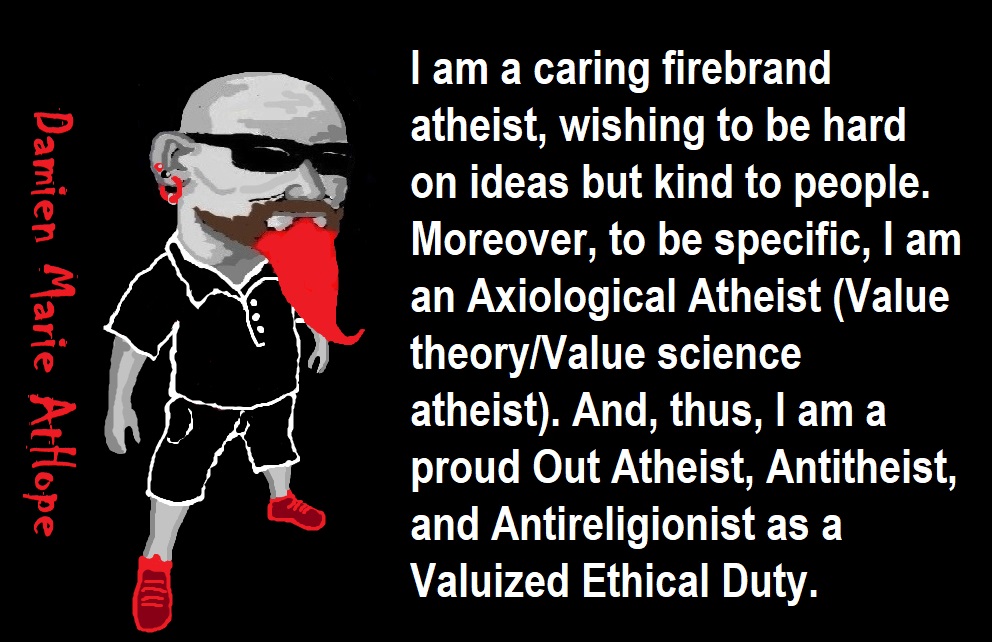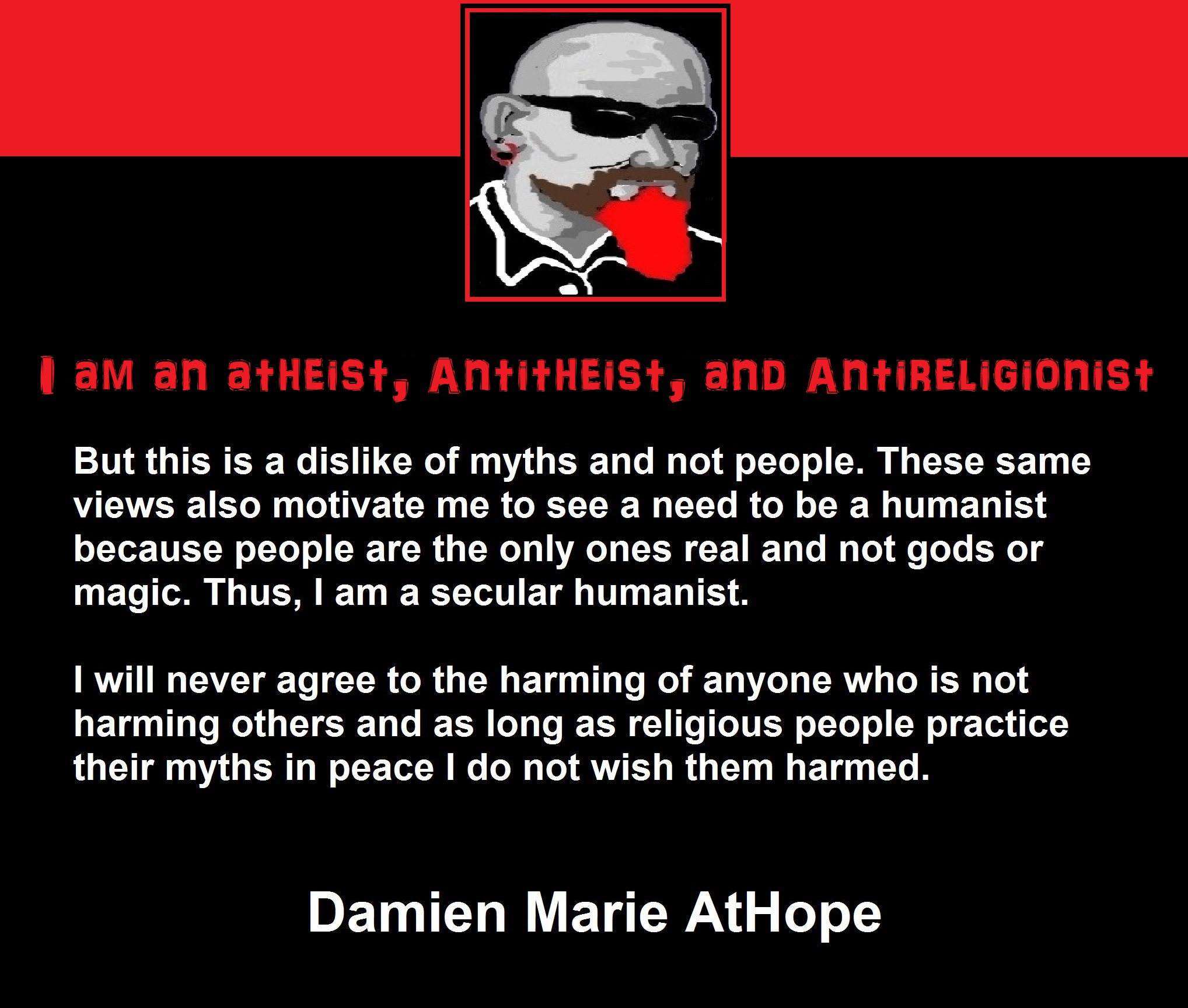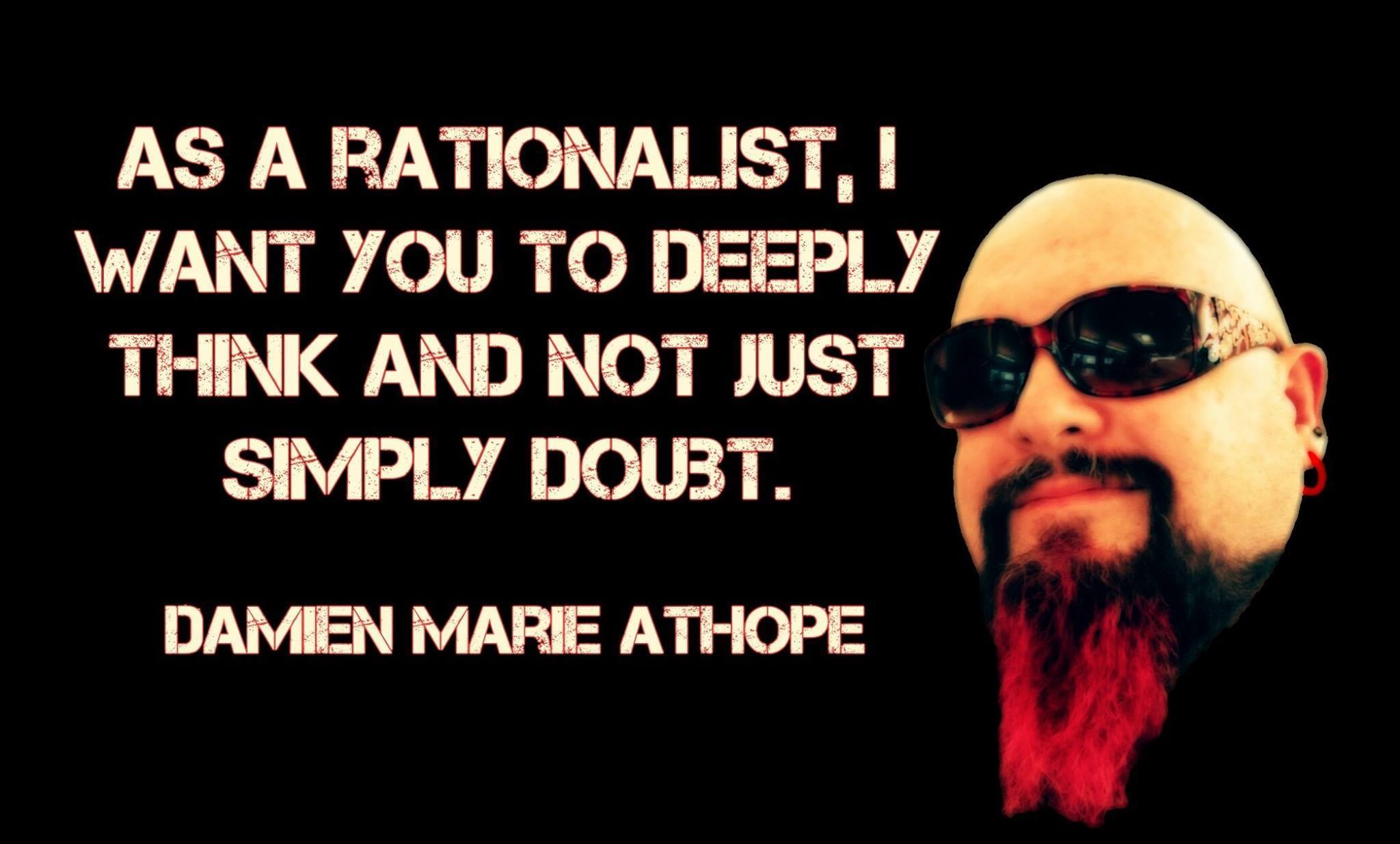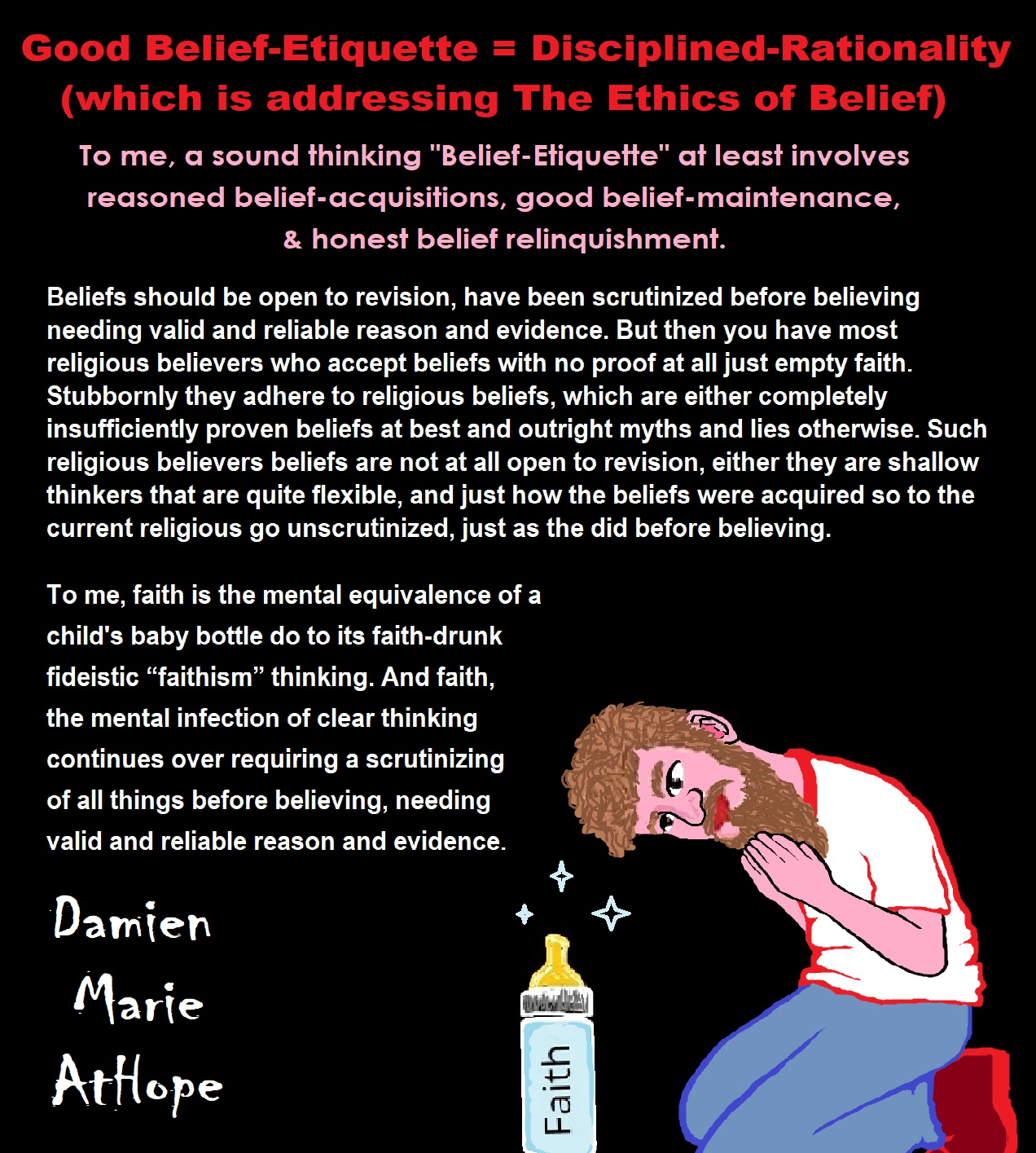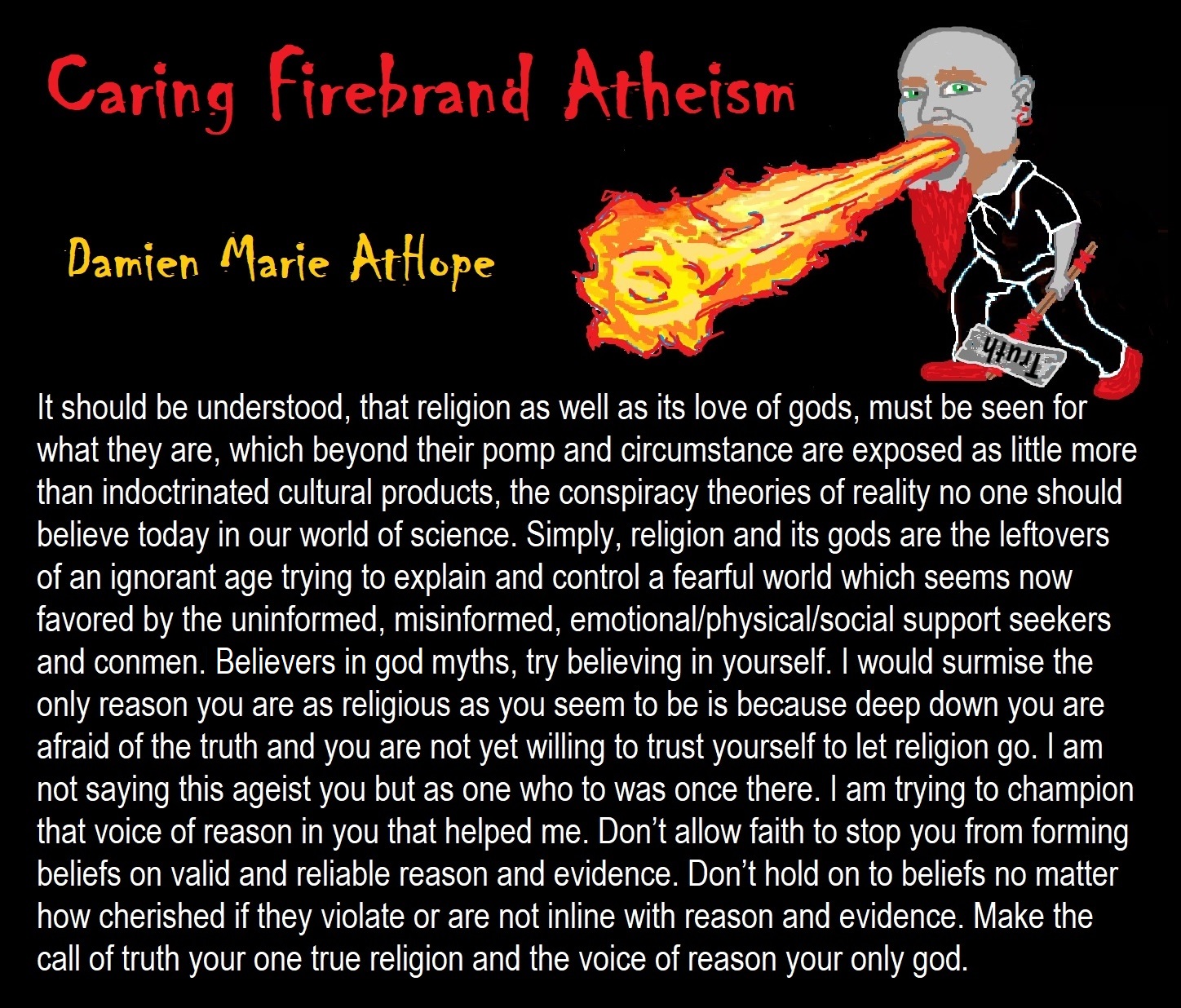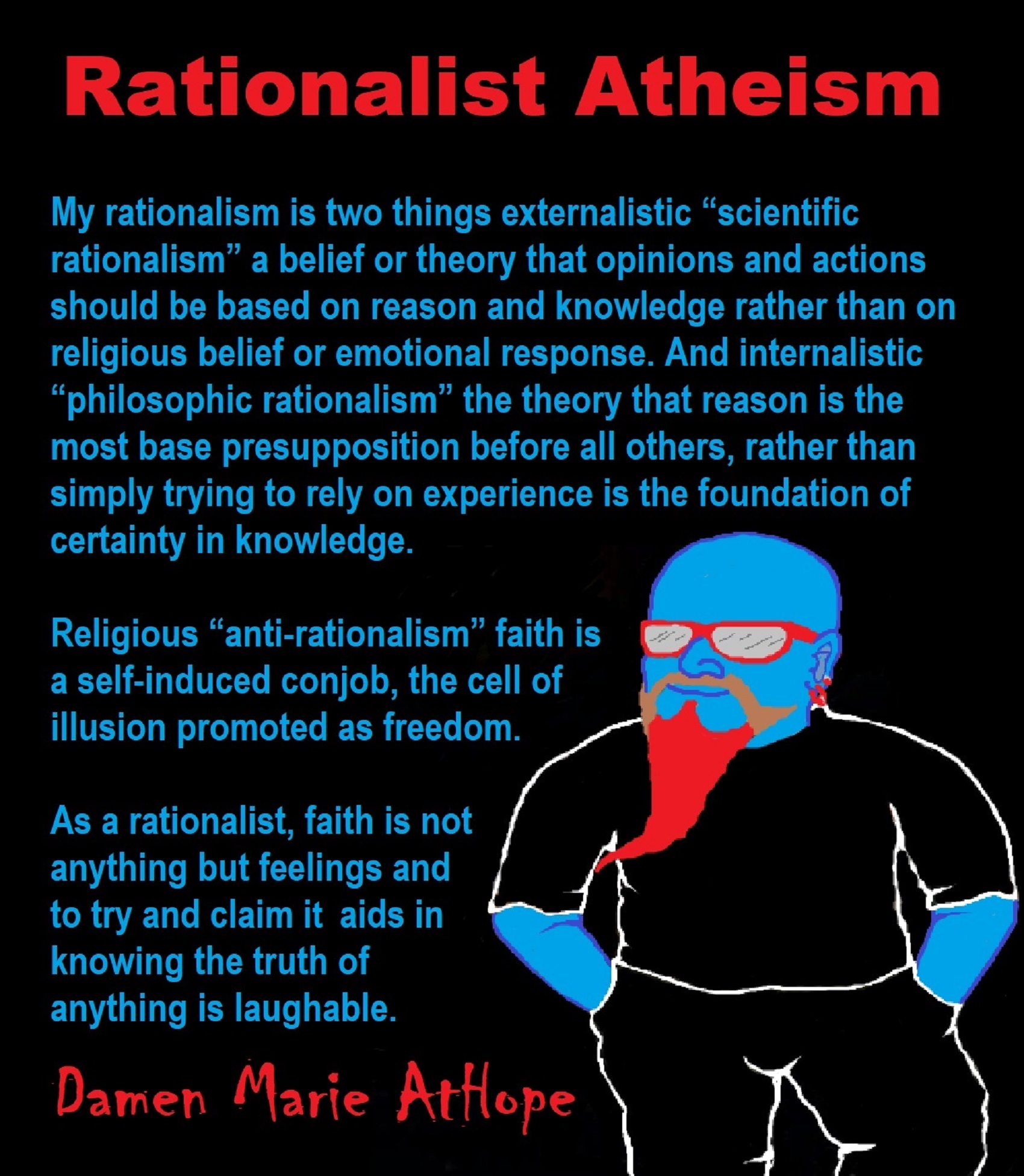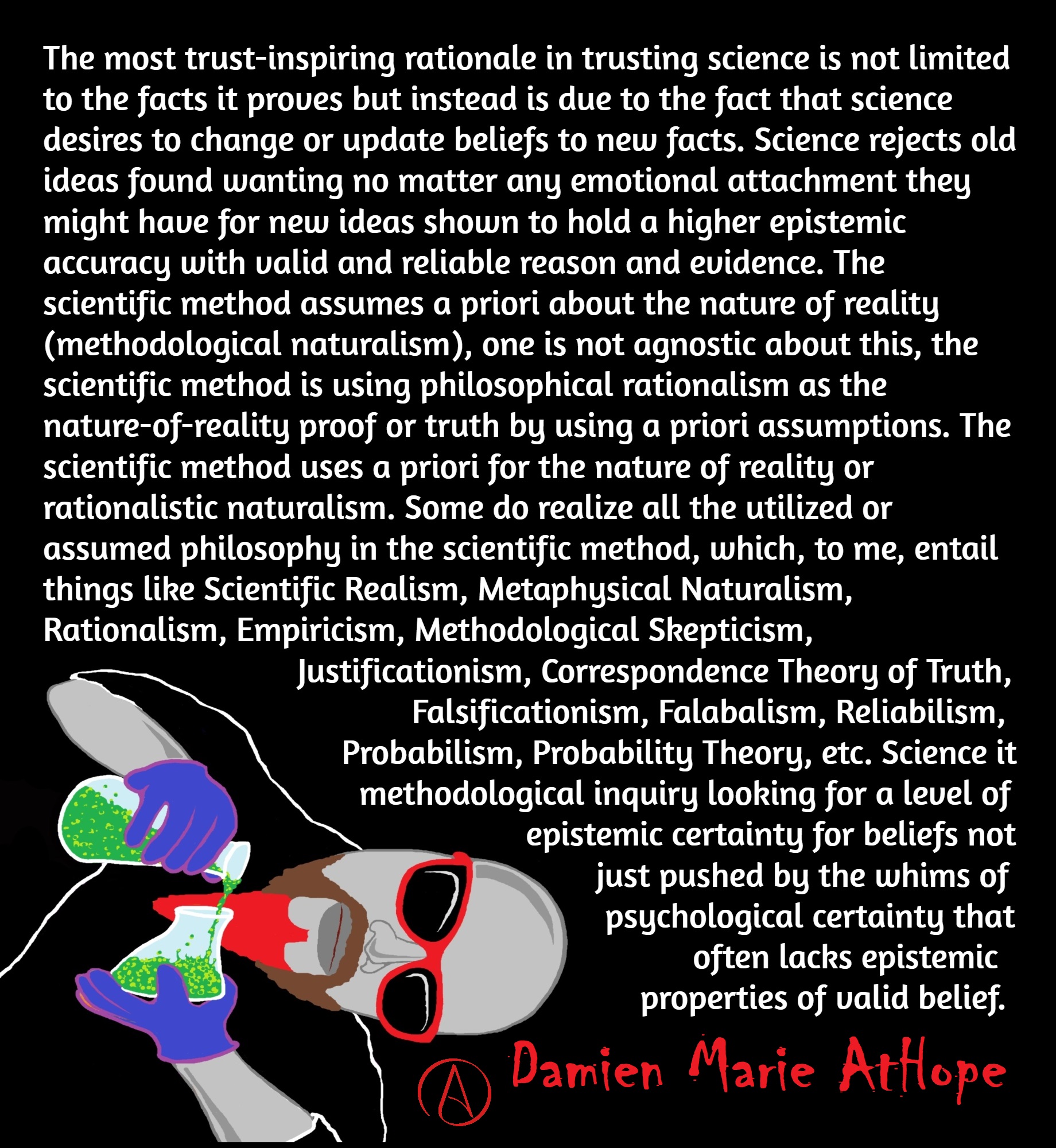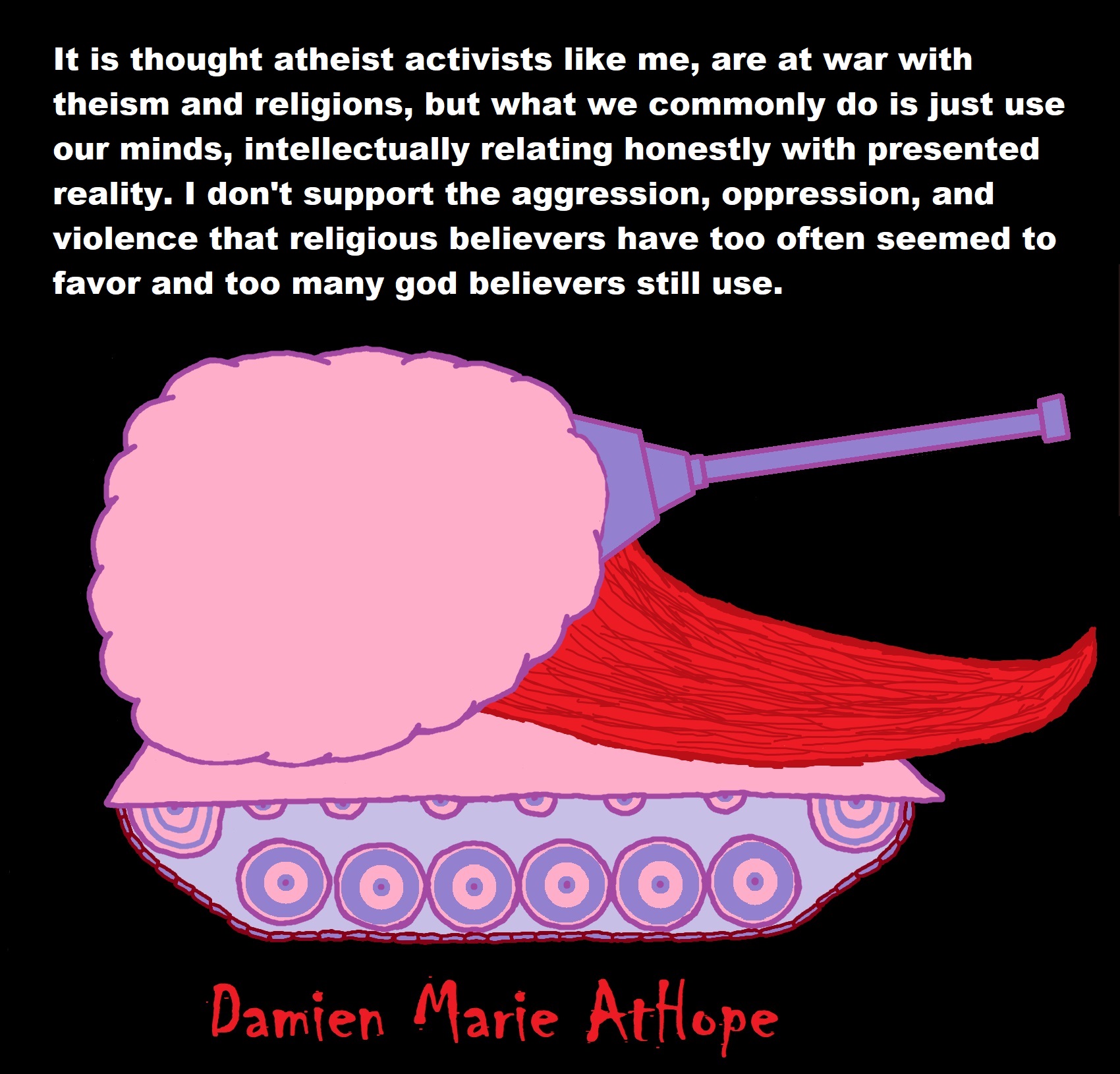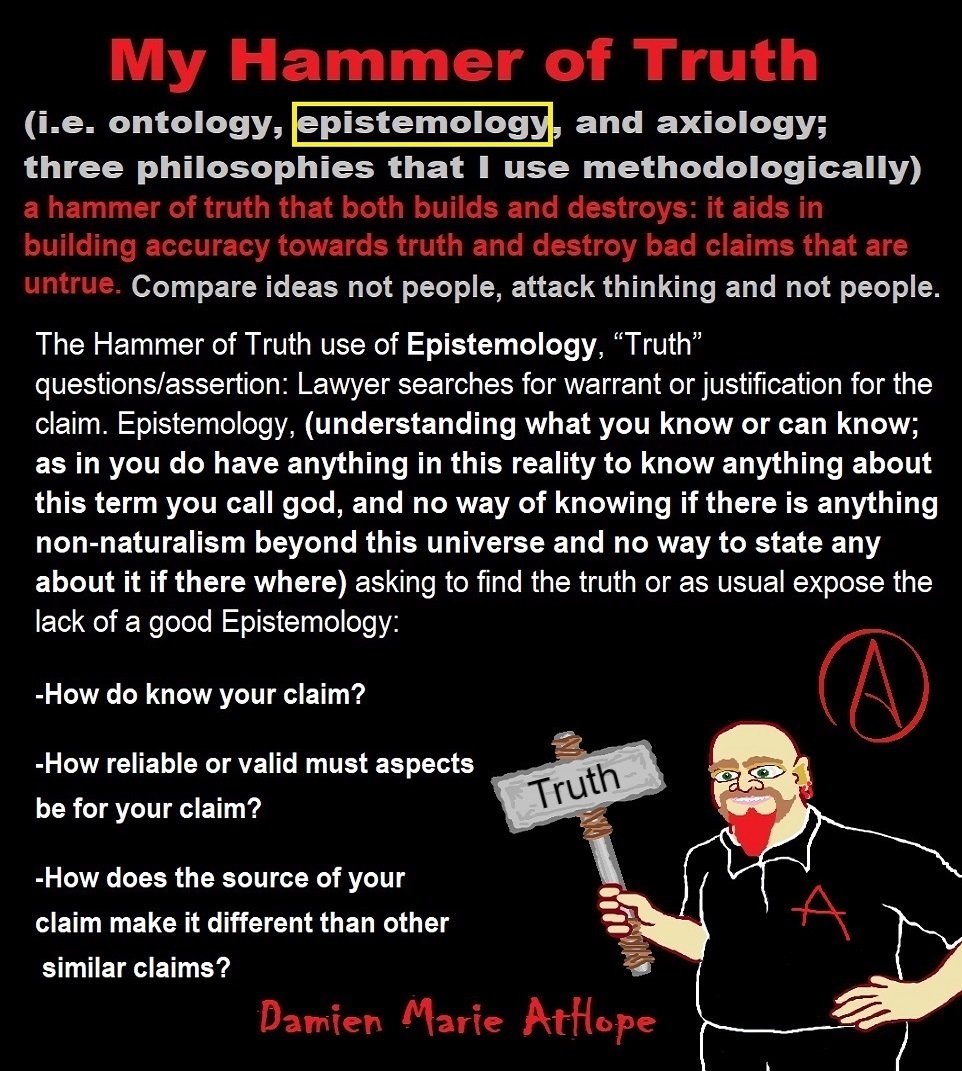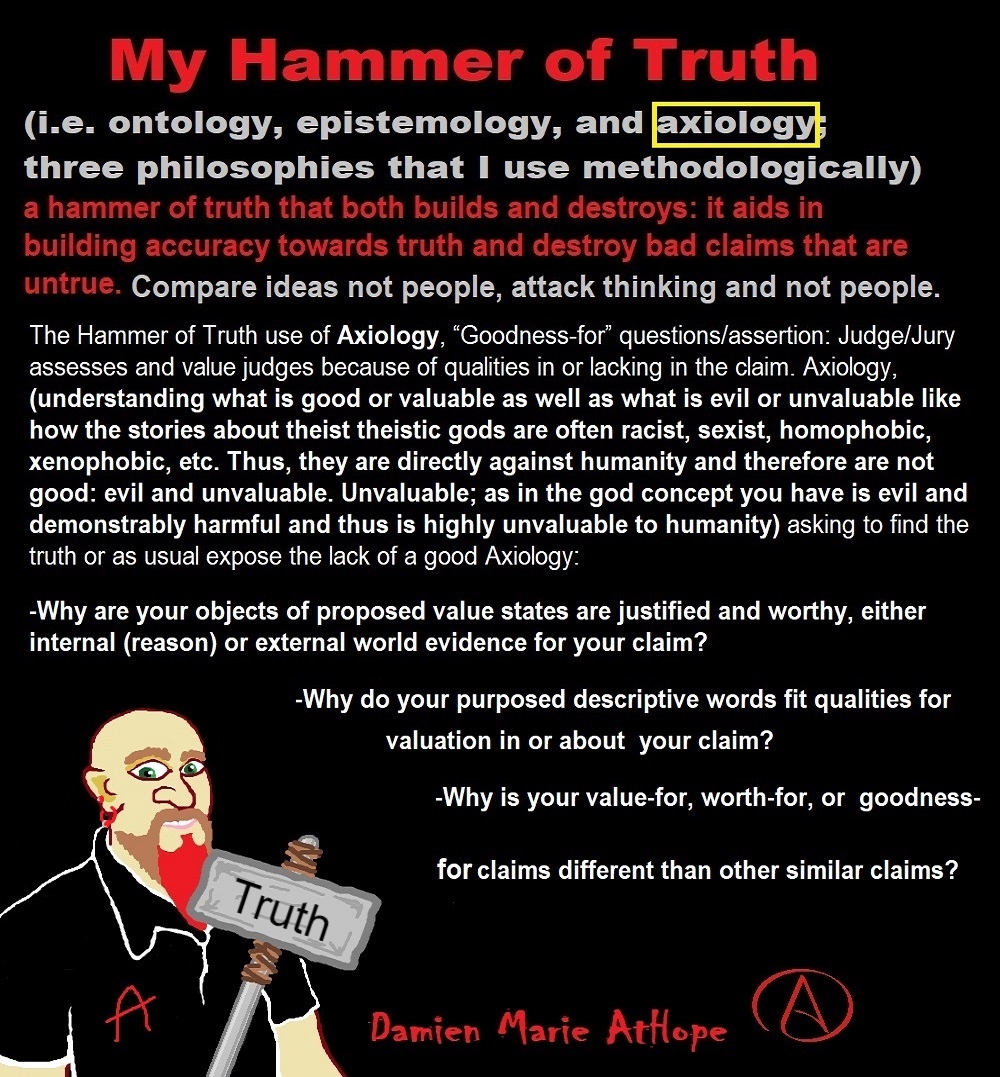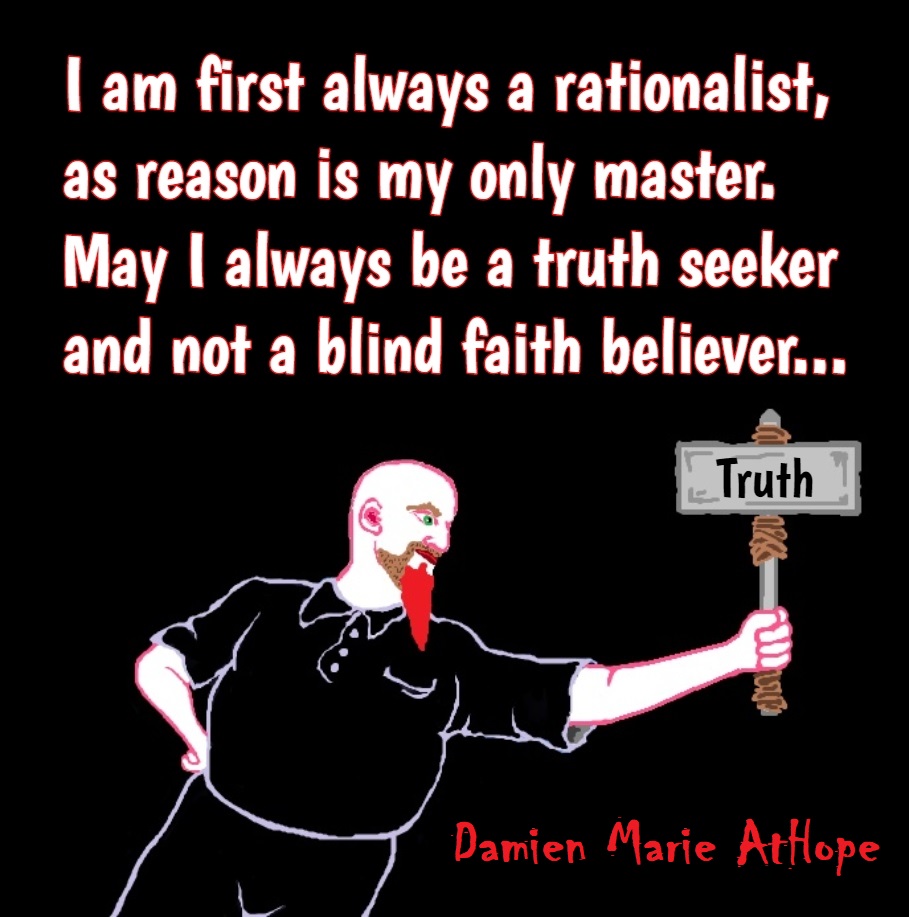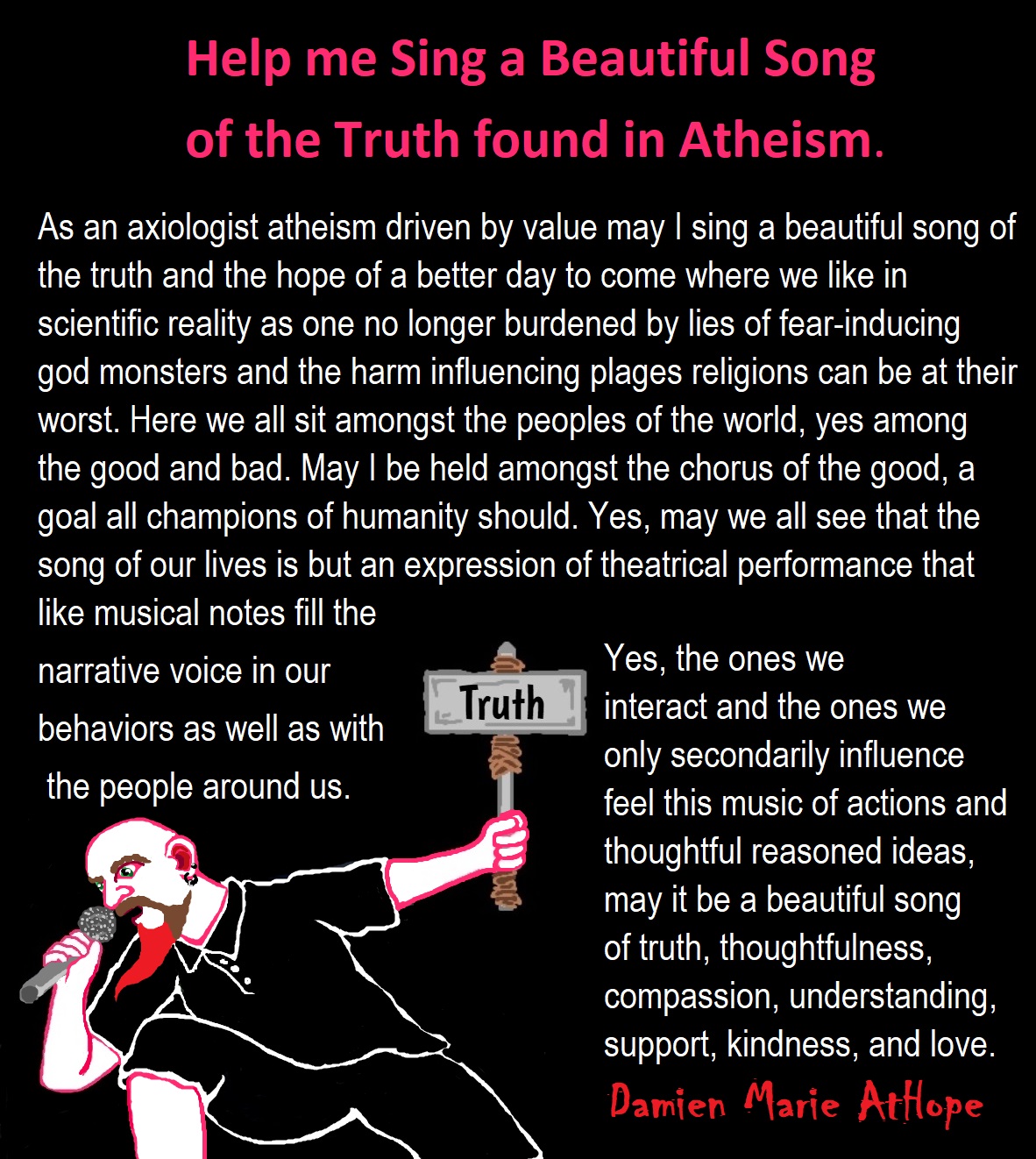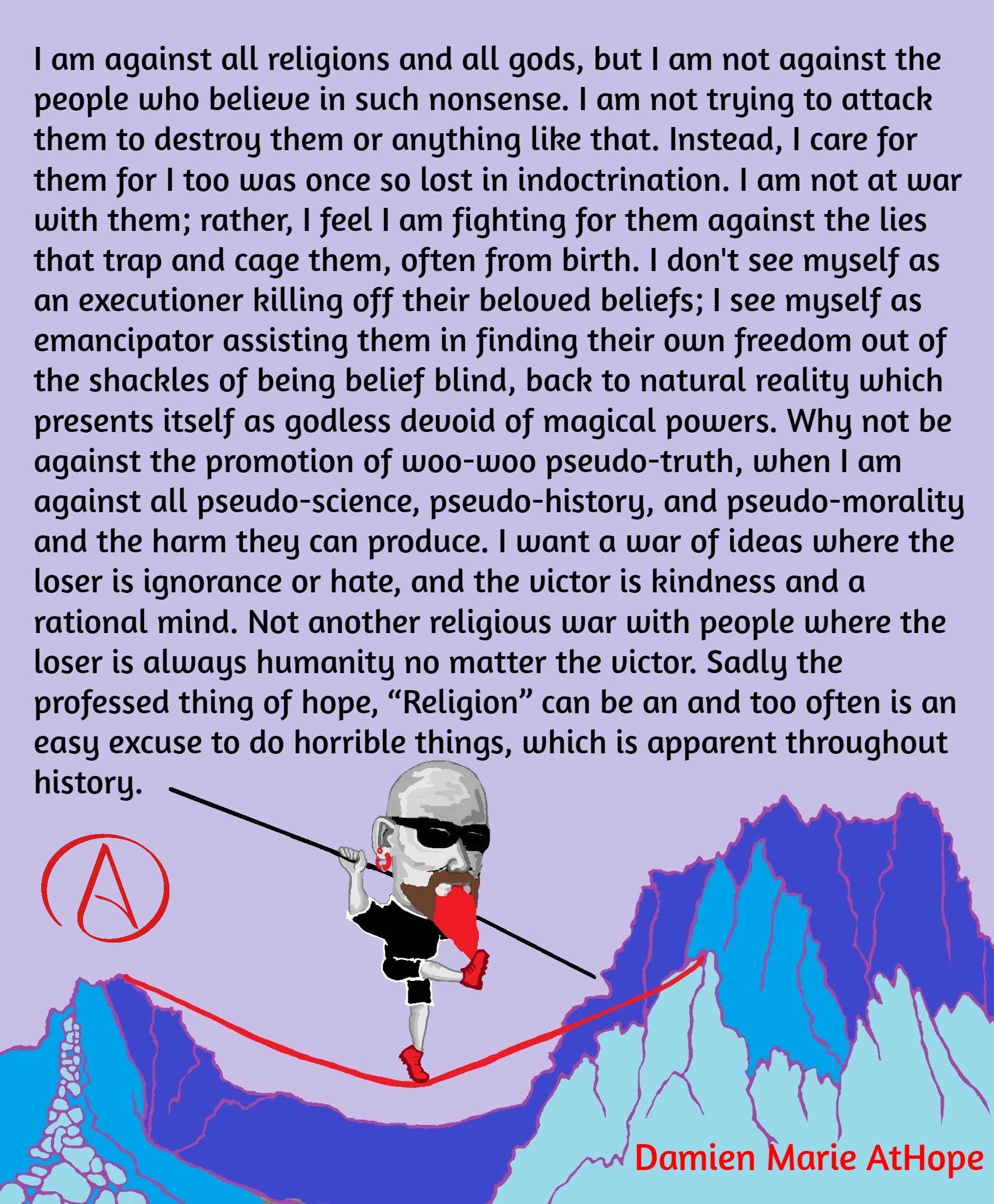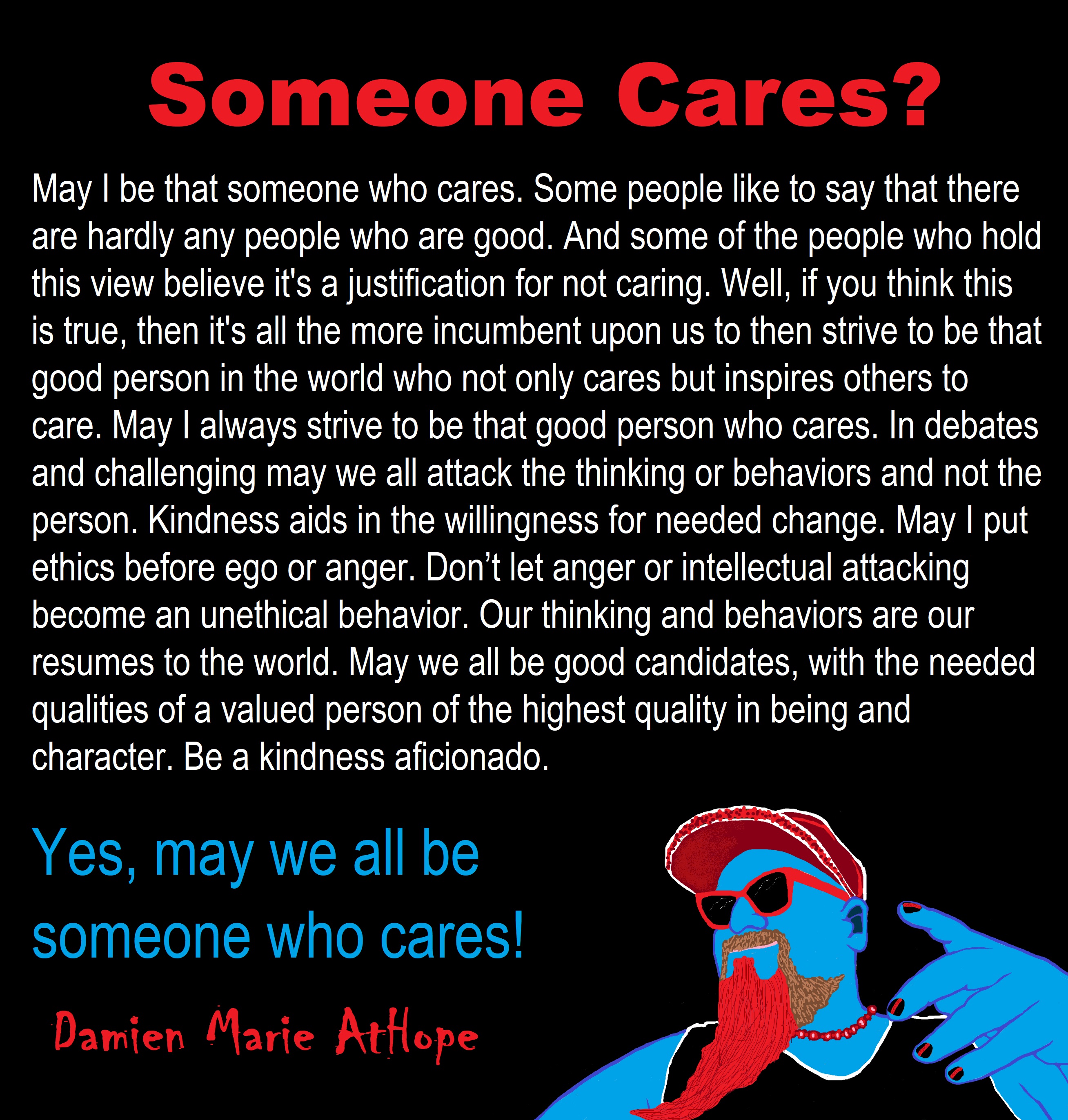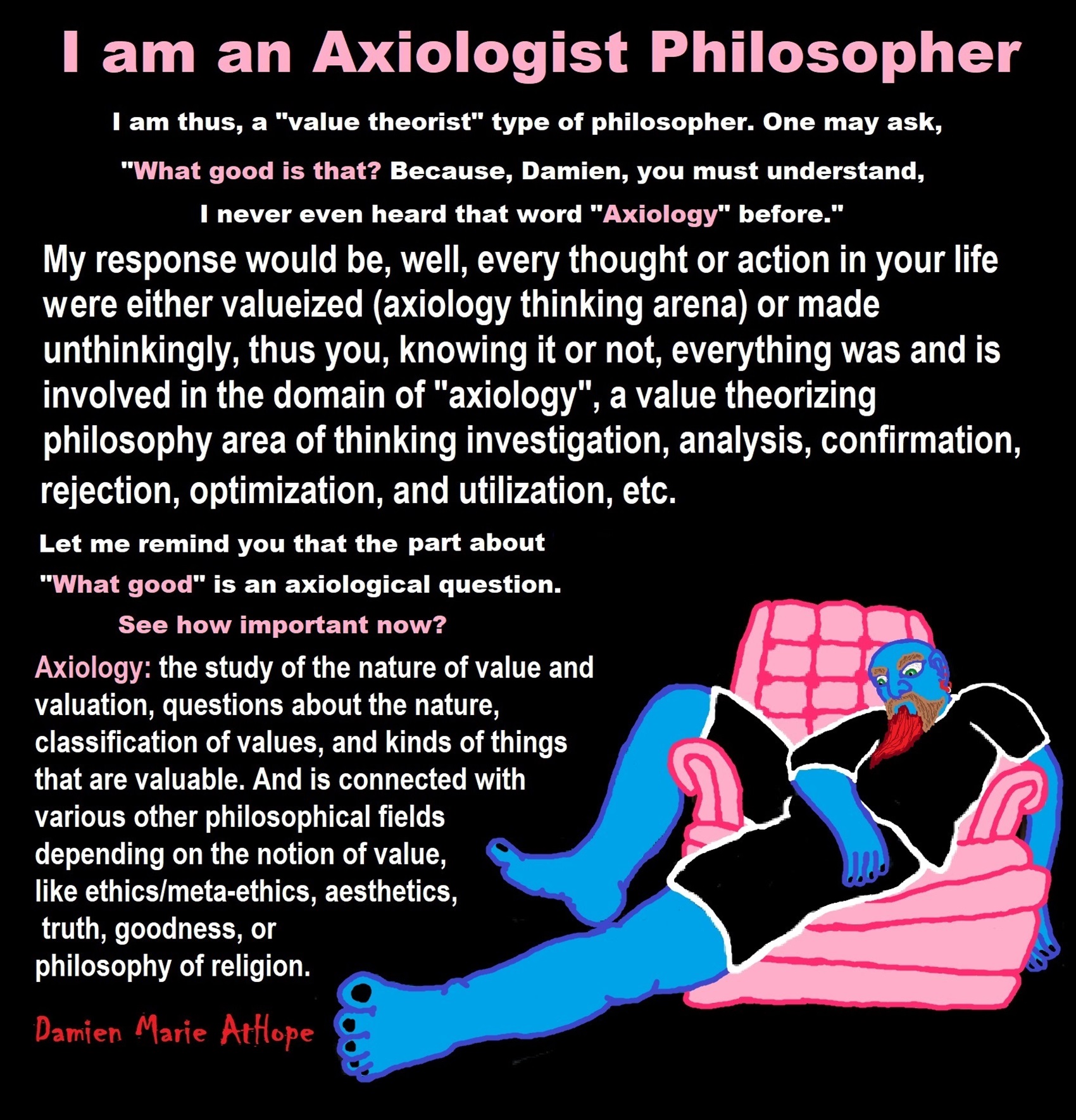
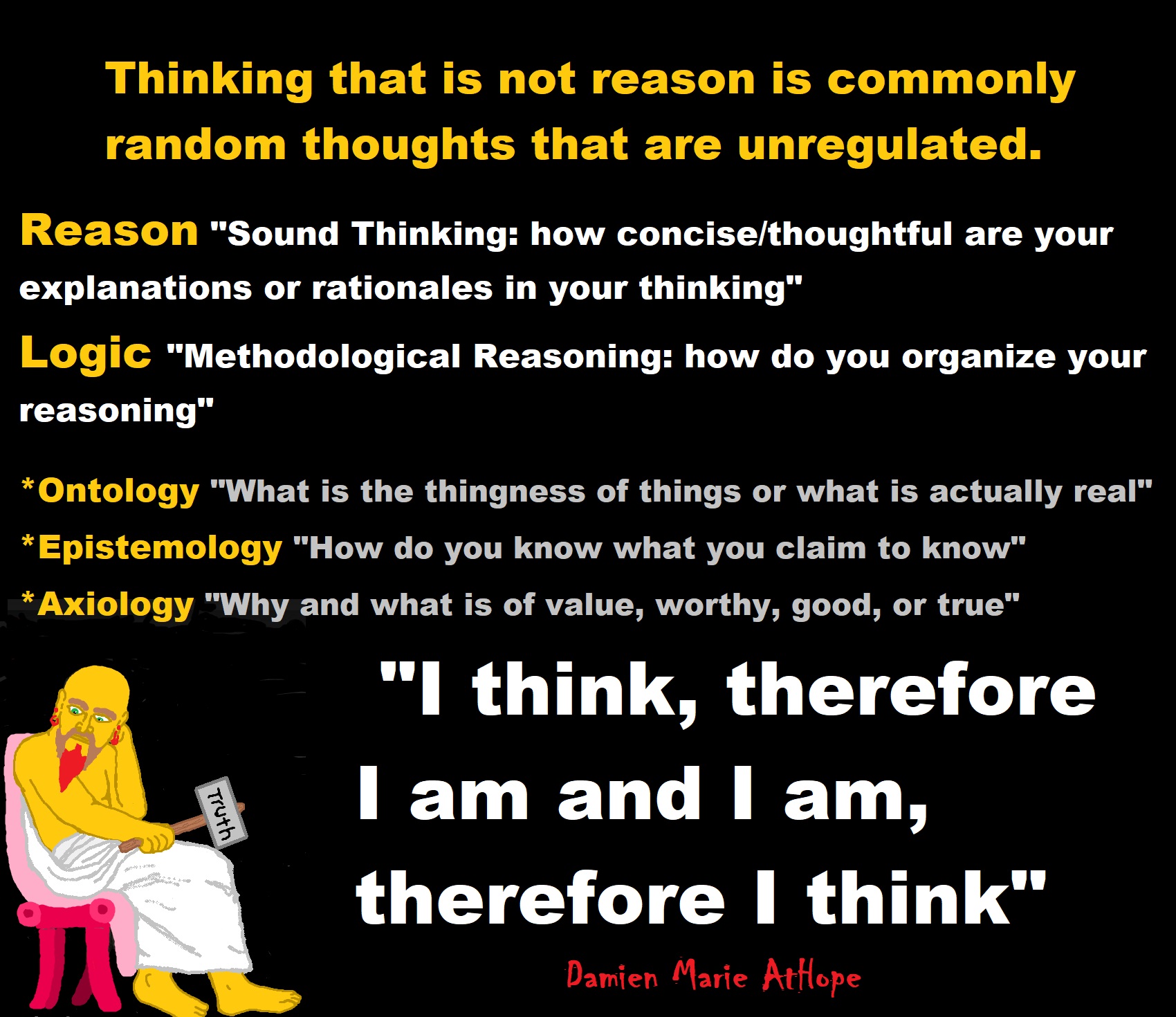
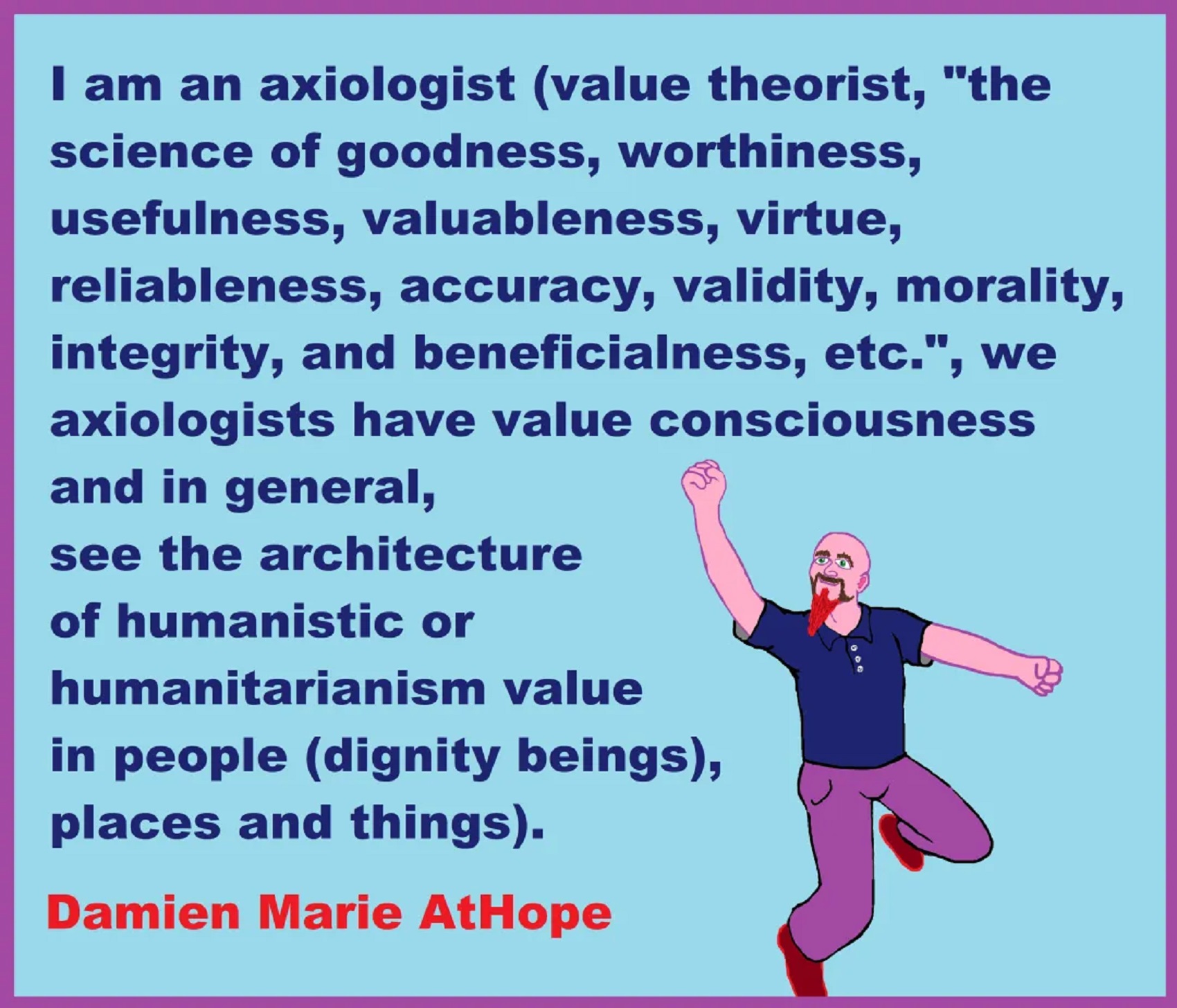
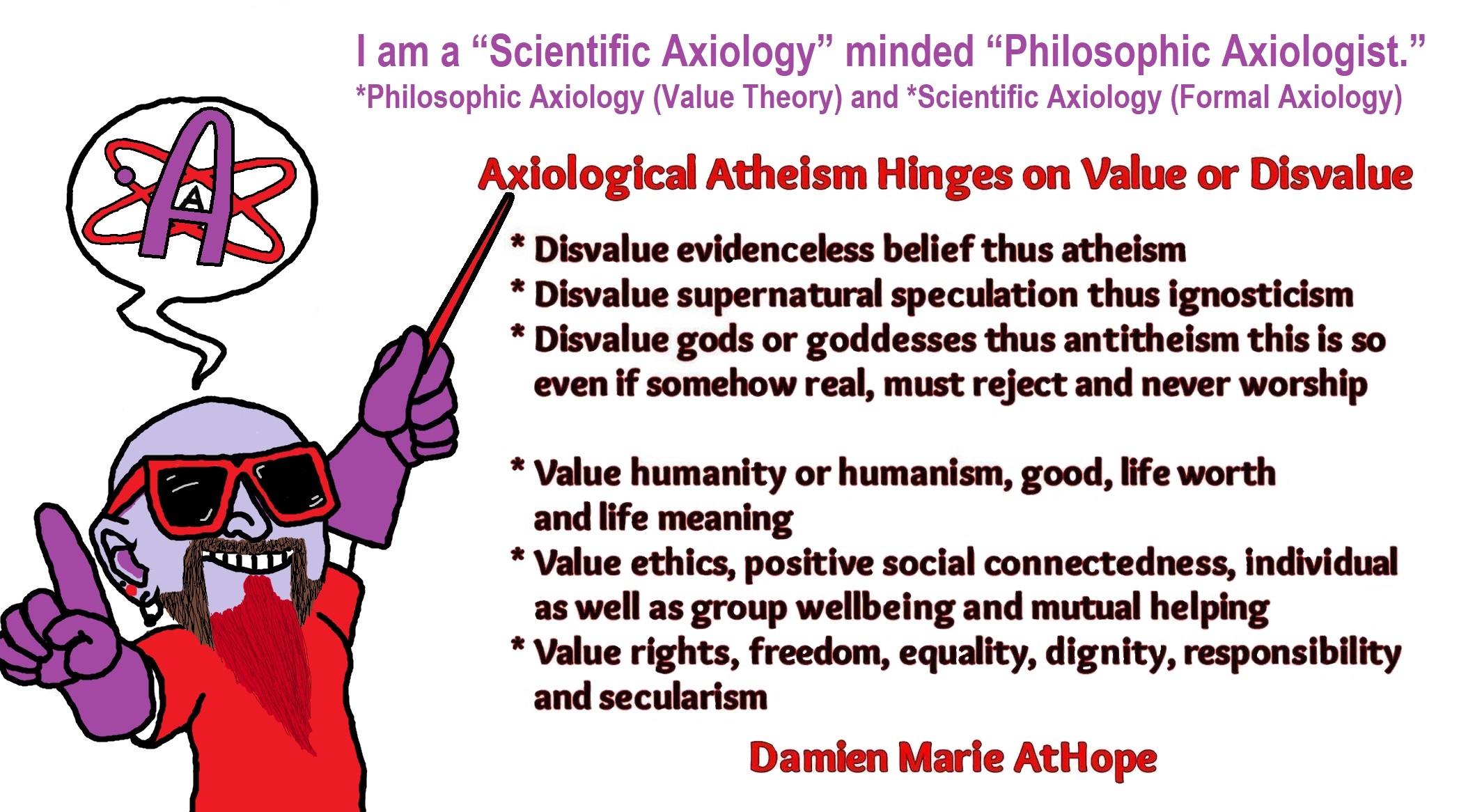



My thoughts on Religion Evolution with external links for more info:
- (Pre-Animism Africa mainly, but also Europe, and Asia at least 300,000 years ago), (Pre-Animism – Oxford Dictionaries)
- (Animism Africa around 100,000 years ago), (Animism – Britannica.com)
- (Totemism Europe around 50,000 years ago), (Totemism – Anthropology)
- (Shamanism Siberia around 30,000 years ago), (Shamanism – Britannica.com)
- (Paganism Turkey around 12,000 years ago), (Paganism – BBC Religion)
- (Progressed Organized Religion “Institutional Religion” Egypt around 5,000 years ago), (Ancient Egyptian Religion – Britannica.com)
- (CURRENT “World” RELIGIONS after 4,000 years ago) (Origin of Major Religions – Sacred Texts)
- (Early Atheistic Doubting at least by 2,600 years ago) (History of Atheism – Wikipedia)
“Religion is an Evolved Product” and Yes, Religion is Like Fear Given Wings…
Atheists talk about gods and religions for the same reason doctors talk about cancer, they are looking for a cure, or a firefighter talks about fires because they burn people and they care to stop them. We atheists too often feel a need to help the victims of mental slavery, held in the bondage that is the false beliefs of gods and the conspiracy theories of reality found in religions.
Understanding Religion Evolution:
- Pre-Animism (at least 300,000 years ago)
- Animism (Africa: 100,000 years ago)
- Totemism (Europe: 50,000 years ago)
- Shamanism (Siberia: 30,000 years ago)
- Paganism (Turkey: 12,000 years ago)
- Progressed organized religion (Egypt: 5,000 years ago), (Egypt, the First Dynasty 5,150 years ago)
- CURRENT “World” RELIGIONS (after 4,000 years ago)
- Early Atheistic Doubting (at least by 2,600 years ago)
“An Archaeological/Anthropological Understanding of Religion Evolution”
It seems ancient peoples had to survived amazing threats in a “dangerous universe (by superstition perceived as good and evil),” and human “immorality or imperfection of the soul” which was thought to affect the still living, leading to ancestor worship. This ancestor worship presumably led to the belief in supernatural beings, and then some of these were turned into the belief in gods. This feeble myth called gods were just a human conceived “made from nothing into something over and over, changing, again and again, taking on more as they evolve, all the while they are thought to be special,” but it is just supernatural animistic spirit-belief perceived as sacred.
Quick Evolution of Religion?
Pre-Animism (at least 300,000 years ago) pre-religion is a beginning that evolves into later Animism. So, Religion as we think of it, to me, all starts in a general way with Animism (Africa: 100,000 years ago) (theoretical belief in supernatural powers/spirits), then this is physically expressed in or with Totemism (Europe: 50,000 years ago) (theoretical belief in mythical relationship with powers/spirits through a totem item), which then enlists a full-time specific person to do this worship and believed interacting Shamanism (Siberia/Russia: 30,000 years ago) (theoretical belief in access and influence with spirits through ritual), and then there is the further employment of myths and gods added to all the above giving you Paganism (Turkey: 12,000 years ago) (often a lot more nature-based than most current top world religions, thus hinting to their close link to more ancient religious thinking it stems from). My hypothesis is expressed with an explanation of the building of a theatrical house (modern religions development). Progressed organized religion (Egypt: 5,000 years ago) with CURRENT “World” RELIGIONS (after 4,000 years ago).
Historically, in large city-state societies (such as Egypt or Iraq) starting around 5,000 years ago culminated to make religion something kind of new, a sociocultural-governmental-religious monarchy, where all or at least many of the people of such large city-state societies seem familiar with and committed to the existence of “religion” as the integrated life identity package of control dynamics with a fixed closed magical doctrine, but this juggernaut integrated religion identity package of Dogmatic-Propaganda certainly did not exist or if developed to an extent it was highly limited in most smaller prehistoric societies as they seem to lack most of the strong control dynamics with a fixed closed magical doctrine (magical beliefs could be at times be added or removed). Many people just want to see developed religious dynamics everywhere even if it is not. Instead, all that is found is largely fragments until the domestication of religion.
Religions, as we think of them today, are a new fad, even if they go back to around 6,000 years in the timeline of human existence, this amounts to almost nothing when seen in the long slow evolution of religion at least around 70,000 years ago with one of the oldest ritual worship. Stone Snake of South Africa: “first human worship” 70,000 years ago. This message of how religion and gods among them are clearly a man-made thing that was developed slowly as it was invented and then implemented peace by peace discrediting them all. Which seems to be a simple point some are just not grasping how devastating to any claims of truth when we can see the lie clearly in the archeological sites.
I wish people fought as hard for the actual values as they fight for the group/clan names political or otherwise they think support values. Every amount spent on war is theft to children in need of food or the homeless kept from shelter.
Here are several of my blog posts on history:
- To Find Truth You Must First Look
- (Magdalenian/Iberomaurusian) Connections to the First Paganists of the early Neolithic Near East Dating from around 17,000 to 12,000 Years Ago
- Natufians: an Ancient People at the Origins of Agriculture and Sedentary Life
- Possible Clan Leader/Special “MALE” Ancestor Totem Poles At Least 13,500 years ago?
- Jewish People with DNA at least 13,200 years old, Judaism, and the Origins of Some of its Ideas
- Baltic Reindeer Hunters: Swiderian, Lyngby, Ahrensburgian, and Krasnosillya cultures 12,020 to 11,020 years ago are evidence of powerful migratory waves during the last 13,000 years and a genetic link to Saami and the Finno-Ugric peoples.
- The Rise of Inequality: patriarchy and state hierarchy inequality
- Fertile Crescent 12,500 – 9,500 Years Ago: fertility and death cult belief system?
- 12,400 – 11,700 Years Ago – Kortik Tepe (Turkey) Pre/early-Agriculture Cultic Ritualism
- Ritualistic Bird Symbolism at Gobekli Tepe and its “Ancestor Cult”
- Male-Homosexual (female-like) / Trans-woman (female) Seated Figurine from Gobekli Tepe
- Could a 12,000-year-old Bull Geoglyph at Göbekli Tepe relate to older Bull and Female Art 25,000 years ago and Later Goddess and the Bull cults like Catal Huyuk?
- Sedentism and the Creation of goddesses around 12,000 years ago as well as male gods after 7,000 years ago.
- Alcohol, where Agriculture and Religion Become one? Such as Gobekli Tepe’s Ritualistic use of Grain as Food and Ritual Drink
- Neolithic Ritual Sites with T-Pillars and other Cultic Pillars
- Paganism: Goddesses around 12,000 years ago then Male Gods after 7,000 years ago
- First Patriarchy: Split of Women’s Status around 12,000 years ago & First Hierarchy: fall of Women’s Status around 5,000 years ago.
- Natufians: an Ancient People at the Origins of Agriculture and Sedentary Life
- J DNA and the Spread of Agricultural Religion (paganism)
- Paganism: an approximately 12,000-year-old belief system
- Paganism 12,000 years old: related to “Anarchism and Socialism” (Pre-Capitalism)
- Shaman burial in Israel 12,000 years ago and the Shamanism Phenomena
- Need to Mythicized: gods and goddesses
- 12,000 – 7,000 Years Ago – Paleo-Indian Culture (The Americas)
- 12,000 – 2,000 Years Ago – Indigenous-Scandinavians (Nordic)
- Norse did not wear helmets with horns?
- Pre-Pottery Neolithic Skull Cult around 11,500 to 8,400 Years Ago?
- 10,400 – 10,100 Years Ago, in Turkey the Nevail Cori Religious Settlement
- 9,000-6,500 Years Old Submerged Pre-Pottery/Pottery Neolithic Ritual Settlements off Israel’s Coast
- Catal Huyuk “first religious designed city” around 9,500 to 7,700 years ago (Turkey)
- Cultic Hunting at Catal Huyuk “first religious designed city”
- Special Items and Art as well as Special Elite Burials at Catal Huyuk
- New Rituals and Violence with the appearance of Pottery and People?
- Haplogroup N and its related Uralic Languages and Cultures
- Ainu people, Sámi people, Native Americans, the Ancient North Eurasians, and Paganistic-Shamanism with Totemism
- Ideas, Technology and People from Turkey, Europe, to China and Back again 9,000 to 5,000 years ago?
- First Pottery of Europe and the Related Cultures
- 9,000 years old Neolithic Artifacts Judean Desert and Hills Israel
- 9,000-7,000 years-old Sex and Death Rituals: Cult Sites in Israel, Jordan, and the Sinai
- 9,000-8500 year old Horned Female shaman Bad Dürrenberg Germany
- Neolithic Jewelry and the Spread of Farming in Europe Emerging out of West Turkey
- 8,600-year-old Tortoise Shells in Neolithic graves in central China have Early Writing and Shamanism
- Swing of the Mace: the rise of Elite, Forced Authority, and Inequality begin to Emerge 8,500 years ago?
- Migrations and Changing Europeans Beginning around 8,000 Years Ago
- My “Steppe-Anatolian-Kurgan hypothesis” 8,000/7,000 years ago
- Around 8,000-year-old Shared Idea of the Mistress of Animals, “Ritual” Motif
- Pre-Columbian Red-Paint (red ochre) Maritime Archaic Culture 8,000-3,000 years ago
- 7,522-6,522 years ago Linear Pottery culture which I think relates to Arcane Capitalism’s origins
- Arcane Capitalism: Primitive socialism, Primitive capital, Private ownership, Means of production, Market capitalism, Class discrimination, and Petite bourgeoisie (smaller capitalists)
- 7,500-4,750 years old Ritualistic Cucuteni-Trypillian culture of Moldova, Romania, and Ukraine
- Roots of a changing early society 7,200-6,700 years ago Jordan and Israel
- Agriculture religion (Paganism) with farming reached Britain between about 7,000 to 6,500 or so years ago and seemingly expressed in things like Western Europe’s Long Barrows
- My Thoughts on Possible Migrations of “R” DNA and Proto-Indo-European?
- “Millet” Spreading from China 7,022 years ago to Europe and related Language may have Spread with it leading to Proto-Indo-European
- Proto-Indo-European (PIE), ancestor of Indo-European languages: DNA, Society, Language, and Mythology
- The Dnieper–Donets culture and Asian varieties of Millet from China to the Black Sea region of Europe by 7,022 years ago
- Kurgan 6,000 years ago/dolmens 7,000 years ago: funeral, ritual, and other?
- 7,020 to 6,020-year-old Proto-Indo-European Homeland of Urheimat or proposed home of their Language and Religion
- Ancient Megaliths: Kurgan, Ziggurat, Pyramid, Menhir, Trilithon, Dolman, Kromlech, and Kromlech of Trilithons
- The Mytheme of Ancient North Eurasian Sacred-Dog belief and similar motifs are found in Indo-European, Native American, and Siberian comparative mythology
- Elite Power Accumulation: Ancient Trade, Tokens, Writing, Wealth, Merchants, and Priest-Kings
- Sacred Mounds, Mountains, Kurgans, and Pyramids may hold deep connections?
- Between 7,000-5,000 Years ago, rise of unequal hierarchy elite, leading to a “birth of the State” or worship of power, strong new sexism, oppression of non-elites, and the fall of Women’s equal status
- Paganism 7,000-5,000 years old: related to “Anarchism and Socialism” (Capitalism) (World War 0) Elite & their slaves
- Hell and Underworld mythologies starting maybe as far back as 7,000 to 5,000 years ago with the Proto-Indo-Europeans?
- The First Expression of the Male God around 7,000 years ago?
- White (light complexion skin) Bigotry and Sexism started 7,000 years ago?
- Around 7,000-year-old Shared Idea of the Divine Bird (Tutelary and/or Trickster spirit/deity), “Ritual” Motif
- Nekhbet an Ancient Egyptian Vulture Goddess and Tutelary Deity
- 6,720 to 4,920 years old Ritualistic Hongshan Culture of Inner Mongolia with 5,000-year-old Pyramid Mounds and Temples
- First proto-king in the Balkans, Varna culture around 6,500 years ago?
- 6,500–5,800 years ago in Israel Late Chalcolithic (Copper Age) Period in the Southern Levant Seems to Express Northern Levant Migrations, Cultural and Religious Transfer
- KING OF BEASTS: Master of Animals “Ritual” Motif, around 6,000 years old or older…
- Around 6000-year-old Shared Idea of the Solid Wheel & the Spoked Wheel-Shaped Ritual Motif
- “The Ghassulian Star,” a mysterious 6,000-year-old mural from Jordan; a Proto-Star of Ishtar, Star of Inanna or Star of Venus?
- Religious/Ritual Ideas, including goddesses and gods as well as ritual mounds or pyramids from Northeastern Asia at least 6,000 years old, seemingly filtering to Iran, Iraq, the Mediterranean, Europe, Egypt, and the Americas?
- Maykop (5,720–5,020 years ago) Caucasus region Bronze Age culture-related to Copper Age farmers from the south, influenced by the Ubaid period and Leyla-Tepe culture, as well as influencing the Kura-Araxes culture
- 5-600-year-old Tomb, Mummy, and First Bearded Male Figurine in a Grave
- Kura-Araxes Cultural 5,520 to 4,470 years old DNA traces to the Canaanites, Arabs, and Jews
- Minoan/Cretan (Keftiu) Civilization and Religion around 5,520 to 3,120 years ago
- Evolution Of Science at least by 5,500 years ago
- 5,500 Years old birth of the State, the rise of Hierarchy, and the fall of Women’s status
- “Jiroft culture” 5,100 – 4,200 years ago and the History of Iran
- Stonehenge: Paganistic Burial and Astrological Ritual Complex, England (5,100-3,600 years ago)
- Around 5,000-year-old Shared Idea of the “Tree of Life” Ritual Motif
- Complex rituals for elite, seen from China to Egypt, at least by 5,000 years ago
- Around 5,000 years ago: “Birth of the State” where Religion gets Military Power and Influence
- The Center of the World “Axis Mundi” and/or “Sacred Mountains” Mythology Could Relate to the Altai Mountains, Heart of the Steppe
- Progressed organized religion starts, an approximately 5,000-year-old belief system
- China’s Civilization between 5,000-3,000 years ago, was a time of war and class struggle, violent transition from free clans to a Slave or Elite society
- Origin of Logics is Naturalistic Observation at least by around 5,000 years ago.
- Paganism 5,000 years old: progressed organized religion and the state: related to “Anarchism and Socialism” (Kings and the Rise of the State)
- Ziggurats (multi-platform temples: 4,900 years old) to Pyramids (multi-platform tombs: 4,700 years old)
- Did a 4,520–4,420-year-old Volcano In Turkey Inspire the Bible God?
- Finland’s Horned Shaman and Pre-Horned-God at least 4,500 years ago?
- 4,000-year-Old Dolmens in Israel: A Connected Dolmen Religious Phenomenon?
- Creation myths: From chaos, Ex nihilo, Earth-diver, Emergence, World egg, and World parent
- Bronze Age “Ritual” connections of the Bell Beaker culture with the Corded Ware/Single Grave culture, which were related to the Yamnaya culture and Proto-Indo-European Languages/Religions
- Low Gods (Earth/ Tutelary deity), High Gods (Sky/Supreme deity), and Moralistic Gods (Deity enforcement/divine order)
- The exchange of people, ideas, and material-culture including, to me, the new god (Sky Father) and goddess (Earth Mother) religion between the Cucuteni-Trypillians and others which is then spread far and wide
- Koryaks: Indigenous People of the Russian Far East and Big Raven myths also found in Tlingit, Haida, Tsimshian, and other Indigenous People of North America
- 42 Principles Of Maat (Egyptian Goddess of the justice) around 4,400 years ago, 2000 Years Before Ten Commandments
- “Happy Easter” Well Happy Eostre/Ishter
- 4,320-3,820 years old “Shimao” (North China) site with Totemistic-Shamanistic Paganism and a Stepped Pyramid
- 4,250 to 3,400 Year old Stonehenge from Russia: Arkaim?
- 4,100-year-old beaker with medicinal & flowering plants in a grave of a woman in Scotland
- Early European Farmer ancestry, Kelif el Boroud people with the Cardial Ware culture, and the Bell Beaker culture Paganists too, spread into North Africa, then to the Canary Islands off West Africa
- Flood Accounts: Gilgamesh epic (4,100 years ago) Noah in Genesis (2,600 years ago)
- Paganism 4,000 years old: related to “Anarchism and Socialism” (First Moralistic gods, then the Origin time of Monotheism)
- When was the beginning: TIMELINE OF CURRENT RELIGIONS, which start around 4,000 years ago.
- Early Religions Thought to Express Proto-Monotheistic Systems around 4,000 years ago
- Kultepe? An archaeological site with a 4,000 years old women’s rights document.
- Single God Religions (Monotheism) = “Man-o-theism” started around 4,000 years ago with the Great Sky Spirit/God Tiān (天)?
- Confucianism’s Tiān (Shangdi god 4,000 years old): Supernaturalism, Pantheism or Theism?
- Yes, Your Male God is Ridiculous
- Mythology, a Lunar Deity is a Goddess or God of the Moon
- Sacred Land, Hills, and Mountains: Sami Mythology (Paganistic Shamanism)
- Horse Worship/Sacrifice: mythical union of Ruling Elite/Kingship and the Horse
- The Amorite/Amurru people’s God Amurru “Lord of the Steppe”, relates to the Origins of the Bible God?
- Bronze Age Exotic Trade Routes Spread Quite Far as well as Spread Religious Ideas with Them
- Sami and the Northern Indigenous Peoples Landscape, Language, and its Connection to Religion
- Prototype of Ancient Analemmatic Sundials around 3,900-3,150 years ago and a Possible Solar Connection to gods?
- Judaism is around 3,450 or 3,250 years old. (“Paleo-Hebrew” 3,000 years ago and Torah 2,500 years ago)
- The Weakening of Ancient Trade and the Strengthening of Religions around 3000 years ago?
- Are you aware that there are religions that worship women gods, explain now religion tears women down?
- Animistic, Totemistic, and Paganistic Superstition Origins of bible god and the bible’s Religion.
- Myths and Folklore: “Trickster gods and goddesses”
- Jews, Judaism, and the Origins of Some of its Ideas
- An Old Branch of Religion Still Giving Fruit: Sacred Trees
- Dating the BIBLE: naming names and telling times (written less than 3,000 years ago, provable to 2,200 years ago)
- Did a Volcano Inspire the bible god?
- Dené–Yeniseian language, Old Copper Complex, and Pre-Columbian Mound Builders?
- No “dinosaurs and humans didn’t exist together just because some think they are in the bible itself”
- Sacred Shit and Sacred Animals?
- Everyone Killed in the Bible Flood? “Nephilim” (giants)?
- Hey, Damien dude, I have a question for you regarding “the bible” Exodus.
- Archaeology Disproves the Bible
- Bible Battle, Just More, Bible Babble
- The Jericho Conquest lie?
- Canaanites and Israelites?
- Accurate Account on how did Christianity Began?
- Let’s talk about Christianity.
- So the 10 commandments isn’t anything to go by either right?
- Misinformed christian
- Debunking Jesus?
- Paulism vs Jesus
- Ok, you seem confused so let’s talk about Buddhism.
- Unacknowledged Buddhism: Gods, Savior, Demons, Rebirth, Heavens, Hells, and Terrorism
- His Foolishness The Dalai Lama
- Yin and Yang is sexist with an ORIGIN around 2,300 years ago?
- I Believe Archaeology, not Myths & Why Not, as the Religious Myths Already Violate Reason!
- Archaeological, Scientific, & Philosophic evidence shows the god myth is man-made nonsense.
- Aquatic Ape Theory/Hypothesis? As Always, Just Pseudoscience.
- Ancient Aliens Conspiracy Theorists are Pseudohistorians
- The Pseudohistoric and Pseudoscientific claims about “Bakoni Ruins” of South Africa
- Why do people think Religion is much more than supernaturalism and superstitionism?
- Religion is an Evolved Product
- Was the Value of Ancient Women Different?
- 1000 to 1100 CE, human sacrifice Cahokia Mounds a pre-Columbian Native American site
- Feminist atheists as far back as the 1800s?
- Promoting Religion as Real is Mentally Harmful to a Flourishing Humanity
- Screw All Religions and Their Toxic lies, they are all fraud
- Forget Religions’ Unfounded Myths, I Have Substantiated “Archaeology Facts.”
- Religion Dispersal throughout the World
- I Hate Religion Just as I Hate all Pseudoscience
- Exposing Scientology, Eckankar, Wicca and Other Nonsense?
- Main deity or religious belief systems
- Quit Trying to Invent Your God From the Scraps of Science.
- Archaeological, Scientific, & Philosophic evidence shows the god myth is man-made nonsense.
- Ancient Alien Conspiracy Theorists: Misunderstanding, Rhetoric, Misinformation, Fabrications, and Lies
- Misinformation, Distortion, and Pseudoscience in Talking with a Christian Creationist
- Judging the Lack of Goodness in Gods, Even the Norse God Odin
- Challenging the Belief in God-like Aliens and Gods in General
- A Challenge to Christian use of Torture Devices?
- Yes, Hinduism is a Religion
- Trump is One of the Most Reactionary Forces of Far-right Christian Extremism
- Was the Bull Head a Symbol of God? Yes!
- Primate Death Rituals
- Christian – “God and Christianity are objectively true”
- Australopithecus afarensis Death Ritual?
- You Claim Global Warming is a Hoax?
- Doubter of Science and Defamer of Atheists?
- I think that sounds like the Bible?
- History of the Antifa (“anti-fascist”) Movements
- Indianapolis Anti-Blasphemy Laws #Free Soheil Rally
- Damien, you repeat the golden rule in so many forms then you say religion is dogmatic?
- Science is a Trustable Methodology whereas Faith is not Trustable at all!
- Was I ever a believer, before I was an atheist?
- Atheists rise in reason
- Mistrust of science?
- Open to Talking About the Definition of ‘God’? But first, we address Faith.
- ‘United Monarchy’ full of splendor and power – Saul, David, and Solomon? Most likely not.
- Is there EXODUS ARCHAEOLOGY? The short answer is “no.”
- Lacking Proof of Bigfoots, Unicorns, and Gods is Just a Lack of Research?
- Religion and Politics: Faith Beliefs vs. Rational Thinking
- Hammer of Truth that lying pig RELIGION: challenged by an archaeologist
- “The Hammer of Truth” -ontology question- What do You Mean by That?
- Navigation of a bad argument: Ad Hominem vs. Attack
- Why is it Often Claimed that Gods have a Gender?
- Why are basically all monotheistic religions ones that have a male god?
- Shifting through the Claims in support of Faith
- Dear Mr. AtHope, The 20th Century is an Indictment of Secularism and a Failed Atheist Century
- An Understanding of the Worldwide Statistics and Dynamics of Terrorist Incidents and Suicide Attacks
- Intoxication and Evolution? Addressing and Assessing the “Stoned Ape” or “Drunken Monkey” Theories as Catalysts in Human Evolution
- Sacred Menstrual cloth? Inanna’s knot, Isis knot, and maybe Ma’at’s feather?
- Damien, why don’t the Hebrews accept the bible stories?
- Dealing with a Troll and Arguing Over Word Meaning
- Knowledge without Belief? Justified beliefs or disbeliefs worthy of Knowledge?
- Afrocentrism and African Religions
- Crecganford @crecganford offers history & stories of the people, places, gods, & culture
- Empiricism-Denier?
I am not an academic. I am a revolutionary that teaches in public, in places like social media, and in the streets. I am not a leader by some title given but from my commanding leadership style of simply to start teaching everywhere to everyone, all manner of positive education.

People don’t commonly teach religious history, even that of their own claimed religion. No, rather they teach a limited “pro their religion” history of their religion from a religious perspective favorable to the religion of choice.
We are like believing machines we vacuum up ideas, like Velcro sticks to almost everything. We accumulate beliefs that we allow to negatively influence our lives, often without realizing it. Our willingness must be to alter skewed beliefs that impend our balance or reason, which allows us to achieve new positive thinking and accurate outcomes.

To me, Animism starts in Southern Africa, then to West Europe, and becomes Totemism. Another split goes near the Russia and Siberia border becoming Shamanism, which heads into Central Europe meeting up with Totemism, which also had moved there, mixing the two which then heads to Lake Baikal in Siberia. From there this Shamanism-Totemism heads to Turkey where it becomes Paganism.

Do you truly think “Religious Belief” is only a matter of some personal choice?
Do you not see how coercive one’s world of choice is limited to the obvious hereditary belief, in most religious choices available to the child of religious parents or caregivers? Religion is more commonly like a family, culture, society, etc. available belief that limits the belief choices of the child and that is when “Religious Belief” is not only a matter of some personal choice and when it becomes hereditary faith, not because of the quality of its alleged facts or proposed truths but because everyone else important to the child believes similarly so they do as well simply mimicking authority beliefs handed to them. Because children are raised in religion rather than being presented all possible choices but rather one limited dogmatic brand of “Religious Belief” where children only have a choice of following the belief as instructed, and then personally claim the faith hereditary belief seen in the confirming to the belief they have held themselves all their lives. This is obvious in statements asked and answered by children claiming a faith they barely understand but they do understand that their family believes “this or that” faith, so they feel obligated to believe it too. While I do agree that “Religious Belief” should only be a matter of some personal choice, it rarely is… End Hereditary Religion!
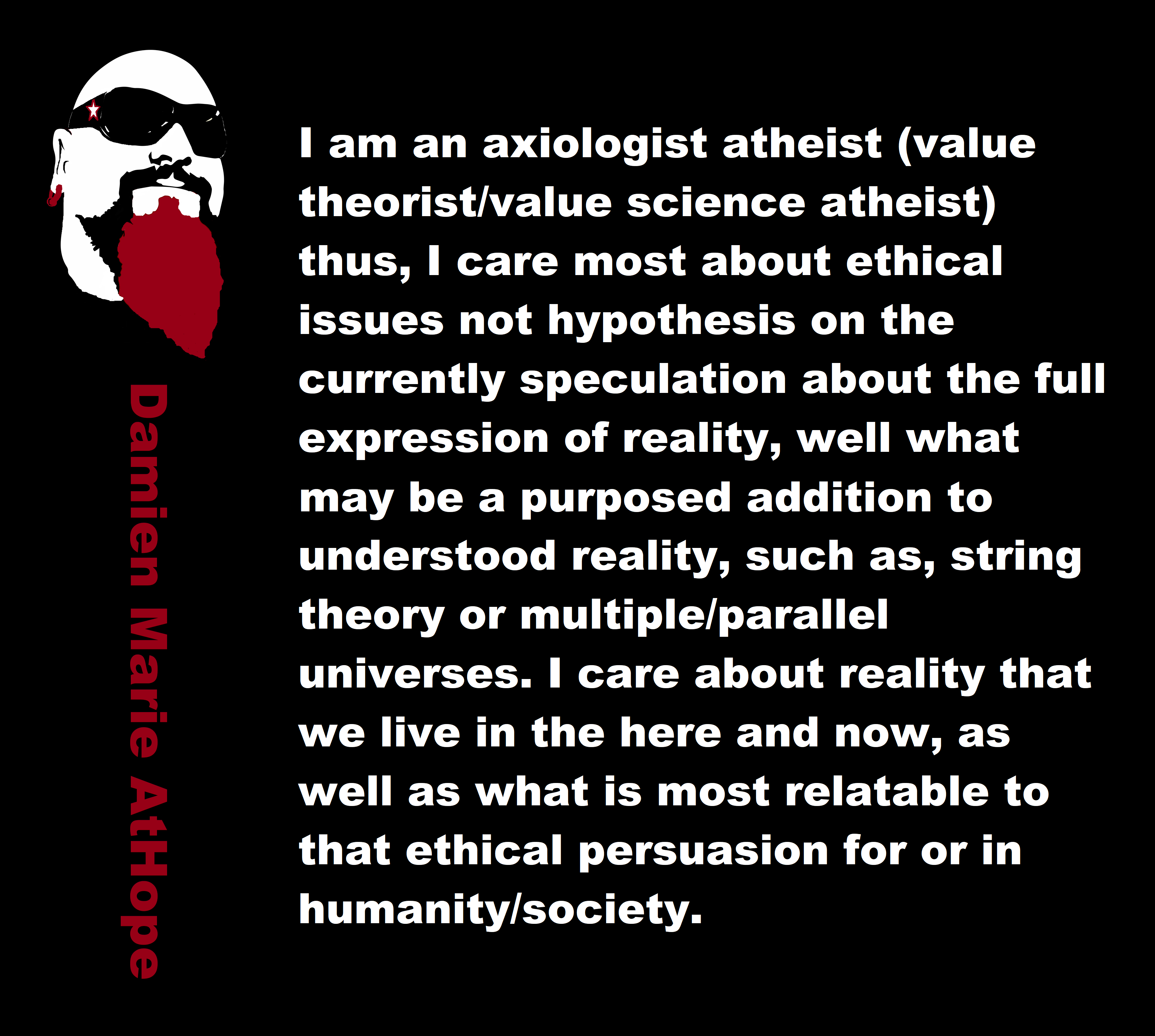
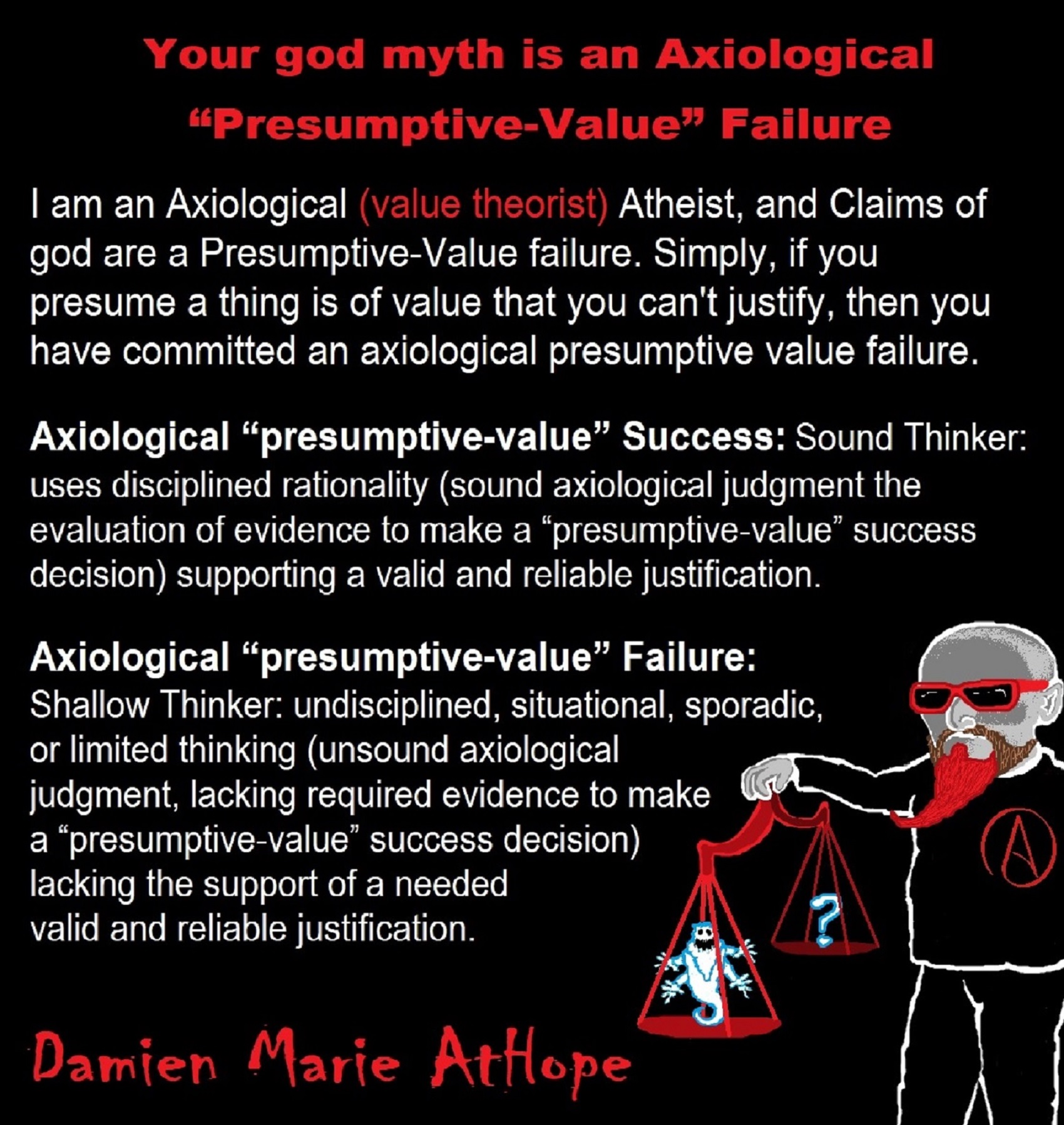
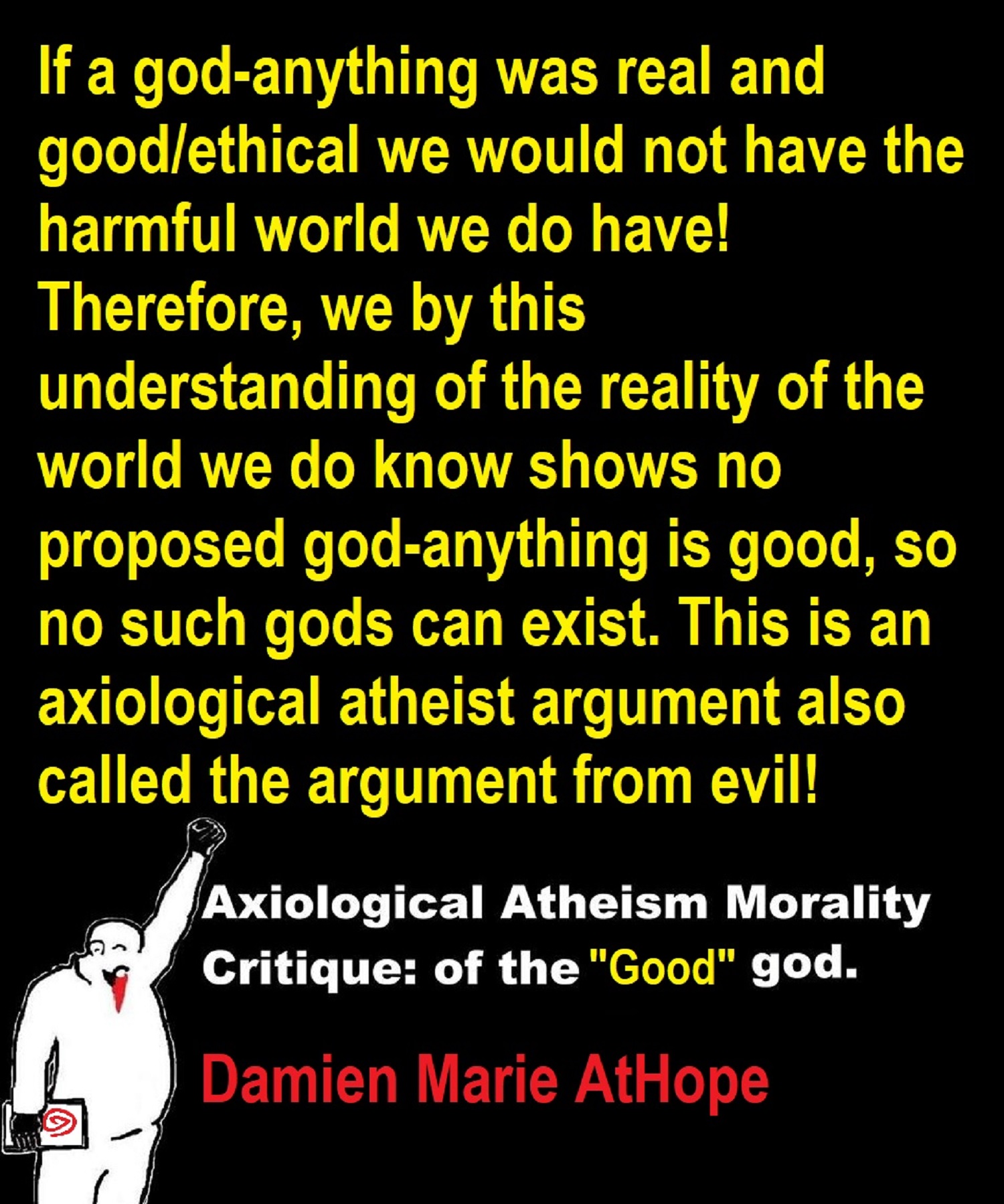
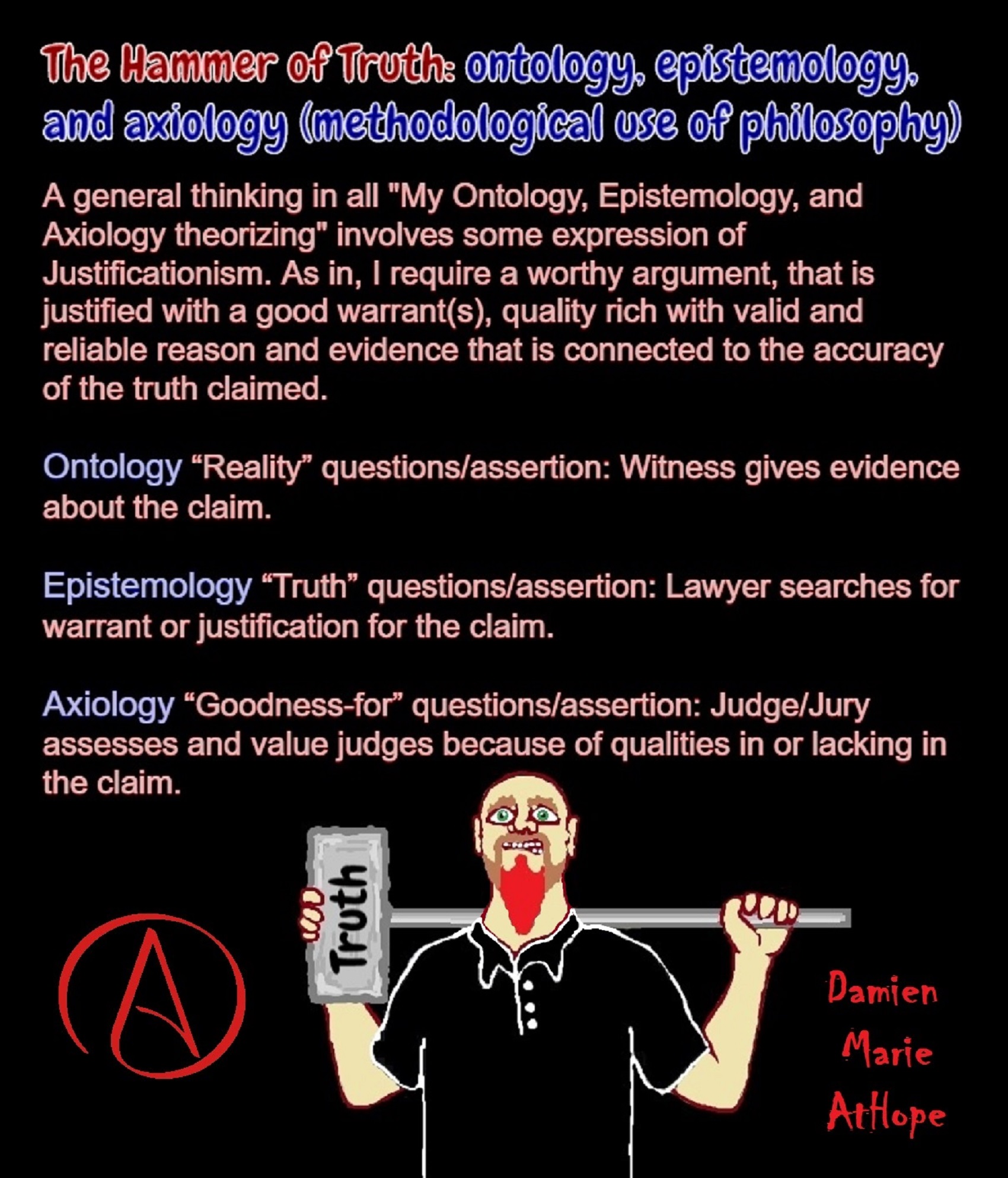
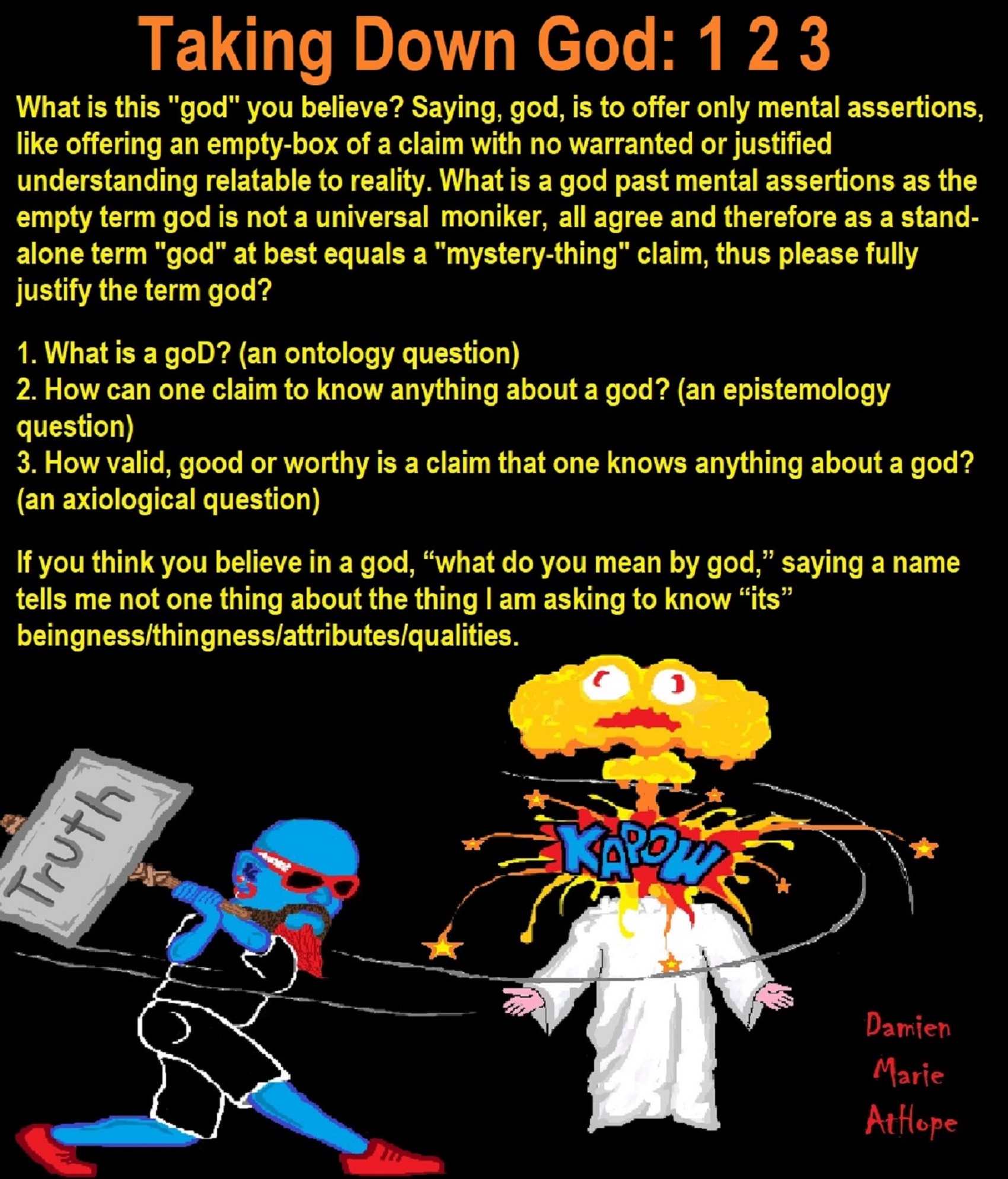
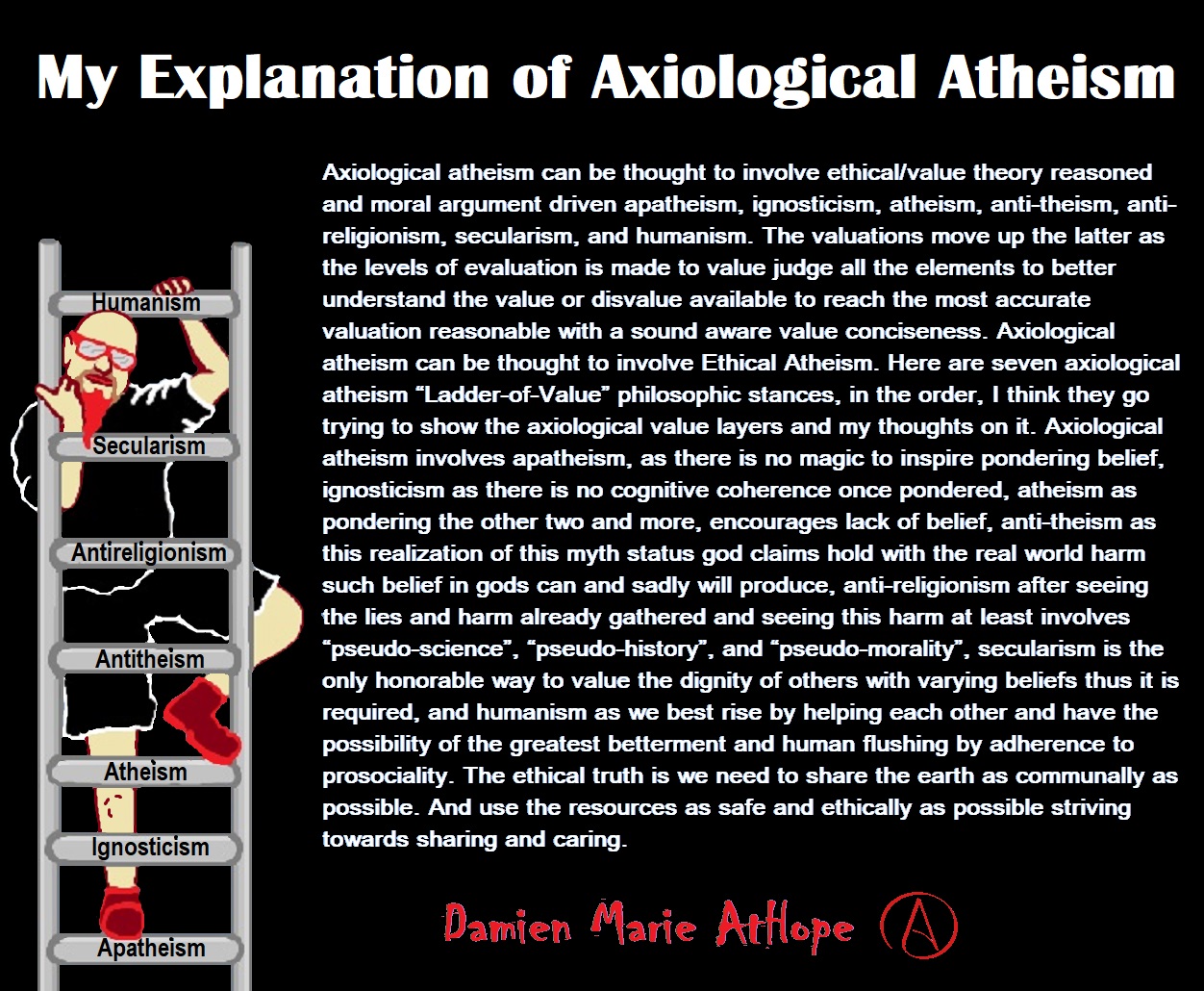
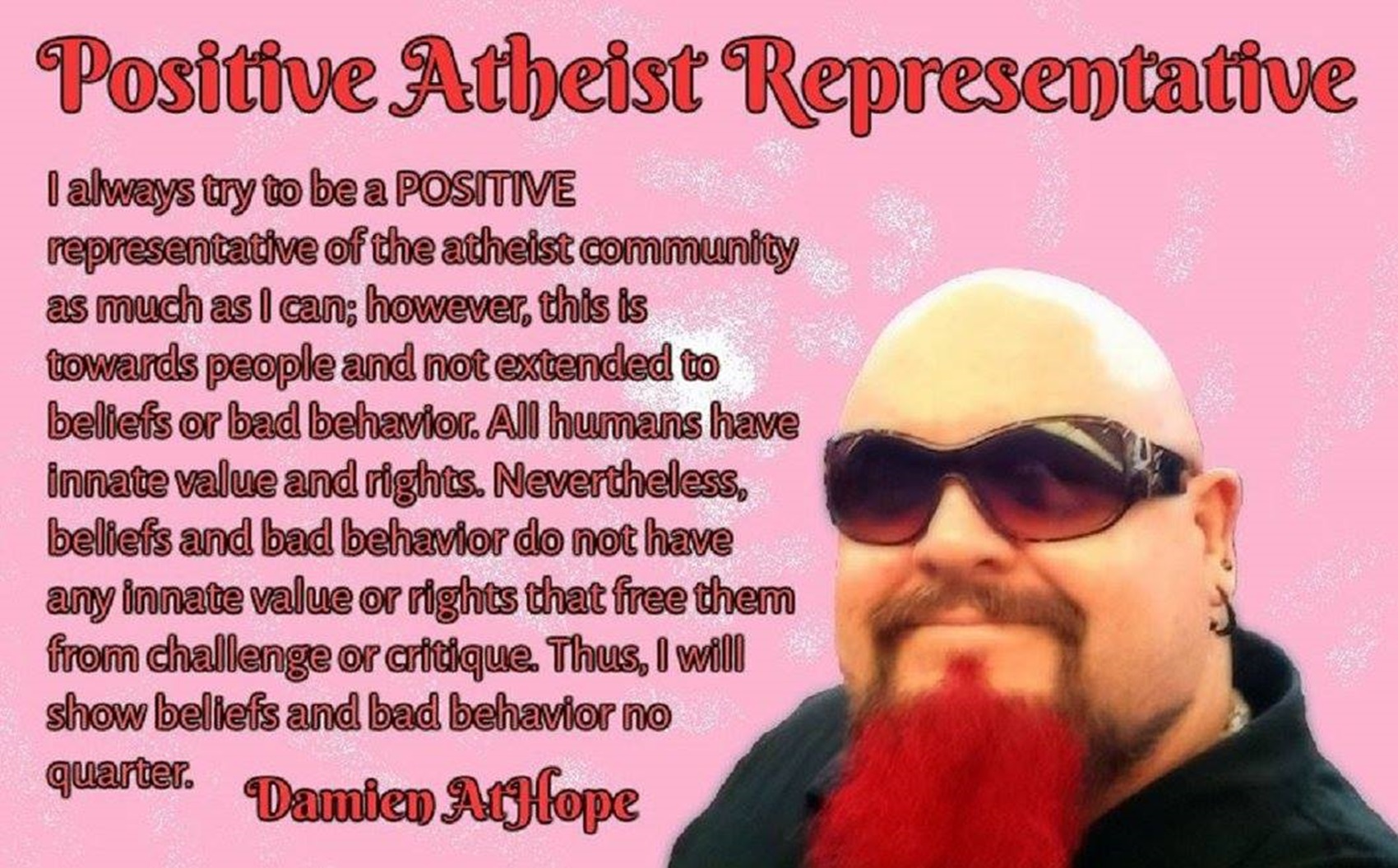
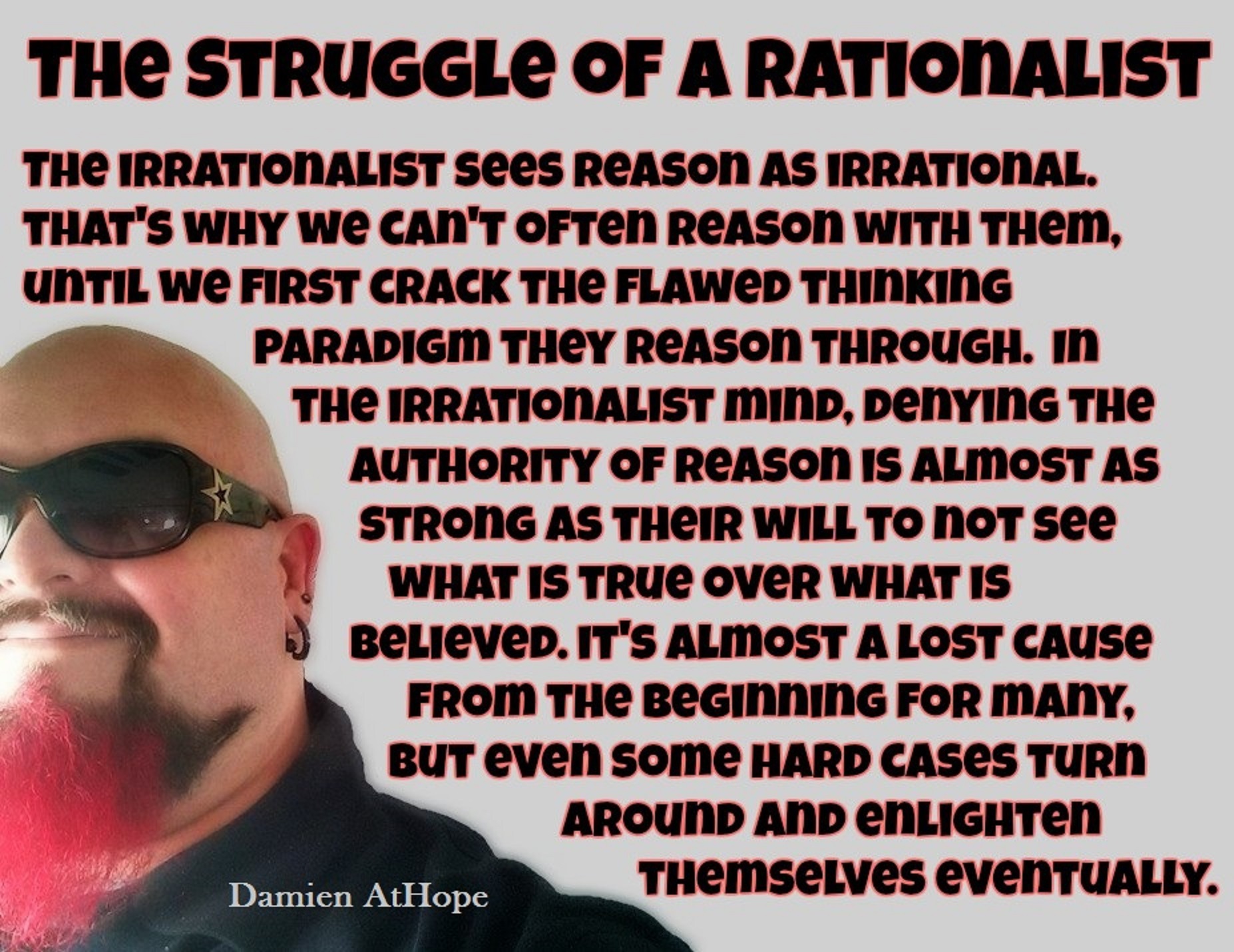
Different Kind of Atheist: Axiological, Methodological, Anarchist, Universal Ethicist, Realist, and Rationalist
I am an axiological atheist and Axiological Atheism is like
humanistic anti-theism and anti-religionism with strong secularism.
Some people may notice I am kind of a different kind of atheist this is because I am an axiological atheist (value theory or value science atheist). Axiological Atheism is like humanistic anti-theism and anti-religionism with strong secularism. Remember when someone announces that they are an atheist; listeners may assume there is only one type of atheist available, when really she is a different type of atheist. As an axiological atheist Axiology is a large motivation and it is value theory which is a lens to view and valuize or value judge worth or what is worthy as well as what is good or bad of greater or lesser value. To read more on value theory check it out online at: Stanford Encyclopedia of Philosophy (value theory) Link
As an axiological atheist, I see intrinsic value in people and want them to see that value in themselves as well as others. Doing such would never allow for a god who devalues you and asks you to devalue others. Similarly to follow such a high standard I too must value myself, value others, and strive to help other people value others. I strive to be as strong in devaluing myths and lies as I am in valuing the person who may hold them. Value to an axiologist has multiple realms/categories and meanings going from internal value, external value, and systemic or global value. Likewise, there can be value distinctions differentiating, for example, between the instrumental value (being good for some purpose) and technical value (being good at doing something) or between the contributory value (being good as part of a whole) and final value (being good as a whole). To read more on axiology check it out online at: Encyclopedia Britannica (axiology) Link To read more on the science of axiology check it out online at: Robert S. Hartman Institute (applications of axiology) Link Axiological Atheism is a type of atheist philosophy it can be thought of as similar to existentialist antitheism and Humanist antitheism. Moreover, here is a short explanation from Wikipedia, Axiological atheism: “Axiological, or constructive, atheism rejects the existence of gods in favor of a “higher absolute”, such as humanity. This form of atheism favors humanity as the absolute source of ethics and values permitting individuals to resolve moral problems without resorting to God. Marx and Freud used this argument to convey messages of liberation, full-development, and unfettered happiness. One of the most common criticisms of atheism has been to the contrary—that denying the existence of a god leads to moral relativism, leaving one with no moral or ethical foundation, or renders life meaningless and miserable. Blaise Pascal argued this view in his Pensées.” To read more on atheist philosophies check it out online at: Wikipedia (Atheism – Atheist philosophies) Link Axiological Atheism would affirm rejecting gods and does not have to lead to moral nihilism or moral relativism but can allow and axiological atheism supports a kind of atheistic objective morality foundation. Also, axiological atheism supports that life has value and meaning as well as can be rich and meaningful. To read more on objective morality check it out online at: Strong Atheism (case for objective morality) Link Again, some may not like what I am but your lack of agreement to my educated philosophical unbelief stance does little to either diminish its reticence or truth. Atheism is just the beginning; now it’s time to solve the harder questions. There are many different kinds of atheism but to offer a cleaner rough view here are a few organized common categories, 7 sets will be offered some kinds of atheism can be combined in a person, and some cannot.
1. Difference in Knowledge
2. Difference in Affirmation
3. Difference in Scope
4. Difference in the Assessed Rationality of Theism
5. Difference in Openness
6. Difference in Action
7. Difference in Bent on Religiosity
To read more on this check it out online at: Commonsense Atheism (17 Kinds of Atheism) Link Some may say it’s all atheism why complicate the issue? To say why complicate you’re thinking is paramount to saying “why be educated at all in your unbelief?” “Why defend it with reasoning or evidence?” “Why strive to be more informed on the untruth of religion or gods?” That can’t truly be something we who are critical thinkers really support to champion a uninformed atheist position just because it is simpler? I support nonbelievers just calling themselves atheist. I am not saying my way of being an axiological atheist is the only or even the best way for all other nonbelievers, in fact I only am only mentioned me my philosophical atheist stance and wanted to quickly explain how, why and in what way I disbelieve. I am not the thought police nor would I ever support that or let others be thought police to me. As they say atheism is not a group movement or a cult like religion so to me there is no one correct liable all should or must follow. Just like how some atheists prefer bright, freethinker, skeptic, rationalist, secular humanist, etc. whatever xyz. We who value critical thinking must hold reason above opinions. So I say go you I value people being authentic in whatever way they see right to define their personal disbelief. Atheists come in a variety of shapes, colors, beliefs, convictions, and backgrounds. To read more on this check it out online at: American Atheists (What is Atheism?) Link Atheists, as a whole, are not a unified group, so accusation that “atheists” are doing x, y and z hold little water. In fact, a disaffection with organized religion, and the potential for groupthink, is what causes many believers to abandon faith and come out as atheists. It doesn’t follow that such individuals would happily join another organized group. Debate within the atheistic community is robust – debates even about whether there is even an “atheistic community” at all, for instance – and the fact that this debate exists presupposes no dogmatic mandate from an organized group. It does follow from this lack of organization that there is no atheist equivalent of the Bible, Koran, or other holy text. There are, of course, atheist writings, but one does not need to adhere to opinions held by Friedrich Nietzsche, Richard Dawkins or Christopher Hitchens to be considered an atheist. Some atheists will actively oppose what these kind of authors do and say. To read more on this check it out online at: Rational wiki (Atheism) Link Some argue strong atheists add some dictator killed people so we should not have hard atheist stances. I reject this as flawed thinking most claimed atheist killers did not kill for atheism but where killers who may have rejected the concept of gods. Likewise, in two other ways I will reject this reasoning first my hard stance is humanitarian such as the hate of injustice is the motivation for justice. The other being even if atheists had killed it means little as it would be only the people involved. In a since all atheists are an island of personal persuasion, belief, and accountability. As such atheism is not an actual group or sect like a religion so we have no affiliations to the action or philosophical thinking of any other nonbelievers.
“Axiological”
- On the Nature of Value (axiology)
- Truth is a Value (axiological) Judgment.
- My quick definition of Axiology and Axiological Atheism?
- Axiological Ethics not Pseudo Morality
- Axiological Morality Critique of Pseudo-Morality/Pseudomorality?
- Axiological Atheism not Nihilist Atheism
- Applying Axiological Thinking
- Axiological Atheism is Intellectualism
- Axiological Atheism Starts in Apatheism?
- “Value Theory/Value Science” atheism: AXIOLOGICAL ATHEISM
- I am an Axiological Atheist?
- As an Axiological Atheist, I wish for Human Flourishing
- I am an Axiological Atheist, with a Rationalist Persuasion, who Supports Anarcho-Humanism
- Axiological Leftist
- Axiological Atheist “Damien” Live at 25 MeetUps: Atheist Reality TV
- Is bible god ethical? & Would It Be Bad or Good if God Exists? (axiological “value theory” questions)
- My Atheism: “Axiological Atheism”
- I am a caring firebrand axiological atheist, wishing to be hard on ideas but kind to people.
- Chastised in a Message on My Axiological Atheist Page & My Responses
- Caring Firebrand Axiological Atheist, Antitheist, and Antireligionist as a Valuized Ethical Duty.
- Using Axiological Awareness to Assist in Argumentation.
- Moral fear and Moral love (which together motivate my axiological ethics)?
- Axiological Dignity: “Value Consciousness vs Value-Blindness”
- Axiological Dignity Being Theory
- Axiological/axiology (value theory/value science) Atheism?
- Axiological Atheism Explained
- Axiological Atheist Interviews
- Interview of Formal Axiological Atheist Dr. William Kelleher
- Axiological Atheist Damien Marie AtHope interviews BABA BRINKMAN
- Explaining Axiological theism, Axiological agnosticism, and Axiological atheism
- Axiological Atheism Morality Critique: of the bible god
Axiological Atheist: Facebook Page
Axiological atheism: is a constructive Value centered ethics driven atheism which rejects the existence of gods in favor of a “higher absolute,” such as humanity and society. This form of atheism favors humanity as the absolute source of ethics and values, and permits individuals to resolve moral problems without resorting to faith or god myths. Axiological or constructive atheism conveys messages of liberation, full-development, and unfettered happiness. Axiological or constructive atheism life meaning in humanity, ethics, and values surpasses one of the most common criticisms of atheism that denying the existence of a god leads to moral relativism, leaving one with no moral or ethical foundation or renders life meaningless and miserable. Axiological Atheism can be thought to involve ethical/value theory reasoned and moral argument-driven atheism, anti-theism, anti-religionism, ignosticism, apatheism, secularism, and humanism. Axiological Atheist, can be understood as a value theory or value science Atheist. As such axiological atheism’s ethically reasoning is constructive and pro-humanity. We who believe we are thinking rational, leading to opposition or hate of religion may that be limited to the nonfactual or oppressive ideology and not the people. Beyond just not being something lets be something, rational thinking should challenge myths but also prove our love for humanity and care for all living beings. In most cases, Axiological atheism would assert the traditional concept of “Atheism” answers only a single question: Is there a creator god or not? That is an important question, but if your answer is “no”, it is only a starting point and not a way of life. You may have reached that viewpoint based on your respect for logic, evidence, science, and personal experience which to are vital values. Yet, after you have reached that initial “no god” answer, all the other important questions in life, all the options for mental and emotional wholeness and social and environmental harmony, ethics and morality, personal fulfillment, social values, philosophy, and psychology remain open. That is where “Axiological Atheism” holds a connection to both further challenging the god concept and devaluing religion and adding a value meaning and ethical axiological ideology to guide universally desirable secular ethical way of being or a value-driven life lived in this reality. What is Axiology, Formal Axiology & Axiological Profiling? Axiology is the name for “value theory.” It is derived from the Greek word “axios” meaning “worth.” Formal axiology is the logic-based science of value anchored in a “hierarchy of meaning” from the most meaningful or richest value to the most destructive or greatest value loss. The logic specifies 18 different levels of richness. Hartman’s “hierarchy of value” is the mathematical measuring standard for human evaluative judgment and decision-making in life and in all social sectors of life in our culture. When people make value judgments, they use both their mental and emotional capacities to arrive at their decision. Some people have very solid and reliable decision-making abilities – while others routinely make wrong or inaccurate choices. Axiological profiles measure the quality of the respondent’s judgment and decision-making by gauging both their mental clarity and their emotional orientation & conditioning. Dr. Leon Pomeroy in his book, The New Science of Axiological Psychology (Pomeroy, 2005), has shown that formal axiology is also empirically valid. Thus, in our axiological assessment profiles we have the solid support of both scientific methods: the deductive logic-based axiomatic method and the inductive, empirical method. Dr. Pomeroy spent over 20 years collecting statistical data for his book cross-nationally, from numerous and diverse eastern and western countries and cultures, and proving that cultures all over the world make value judgments in the same way. Neuro‐Axiology: merges Neuroscience understanding how the brain works with Axiology’s formal science that makes possible the objective measurement of value how humans make value judgments. (You will ALWAYS choose what you think adds the MOST value to your life.) Accepting the standard of the neuroscientific model of consciousness means that everything we think, feel, remember, and do is a function of the brain. This includes the emotion of empathy. We are not empathic because it makes sense to be empathic – meaning that most humans don’t simply reason their way to empathy. Nor do we simply learn empathy (although brain development is an interactive process with the environment, so we can’t rule out environmental influences). For the most part, we have empathy because our brains are wired with empathy as a specific function. Like every function of the body you can think of, if it is not essential for survival then some subset of the human population likely has a disorder or even absence of this function. We recognize the biological limits of empathy or absence of empathy as the disorder, psychopathy. It is estimated that about 1% of the general population are psychopaths, while about 20-30% of the US prison population. Dr. Robert S. Hartman discovered that people hold back a 40% latent reserve of cooperation and productivity until they have been valued as human beings. Axiology is the science of how humans value and make value judgments as well as how they relate to ethics (not moral values often religious or culture relative). The basics of Axiology are in its 3 Classes of Value and 6 “Advisors”. The following are the Classes of Value: 1. Systemic: plans, rules, best practices, procedures; ideas or expectations 2. Extrinsic: practical or situational; measurable, tracked; tasks (tangible) 3. Intrinsic: personal or transcendent; infinitely valuable; irreplaceable; human beings (intangibles). The following are the 6 Advisors which consist of 2 views of one inward and one outward and one must remember people are neither their thoughts nor their advisors. 1. World View: Empathy-Intuition “people”, Practical Judgment “tasks, & Systems Thinking “plans & ideas” 2. Self View: Self-Esteem “who you are”, Role Awareness “what you do,” & Self Direction “where you go”. The word “Axiological” (to the term “Axiological atheism” is meant to denote an atheistic “Value” rejection of the existence of gods or supreme beings and in favor of a “higher absolute” such as humanity or universal ethical principles. The perception of moral obligation removed from ethical sensitivity to universal justice [is] thus unintelligible as “higher absolute”. As a form of atheism, Axiological favors humanity as the absolute source of holistic ethics and care values which permits individuals to resolve moral problems without resorting to a god’s moral obligation which is anti-humanity and not needing to connect to equal justice. Axiological Atheism can be seen as ethically reasoned antitheism and antireligionism where it is all about axiology values that underlie the universal truths. A few examples of universal truths such as there is no such thing as just rape, no honorable thoughtful unwanted torture, and no just humanistic caring abuse of the innocent. You can offer excuses but the true values violations hold true. Axiologists are broadly concerned with all forms of value including aesthetic values, ethical values, and epistemic values. In a narrow sense, axiologists are concerned with what is intrinsically valuable or worthwhile—what is desirable for its own sake. All axiological issues are necessarily connected to ontological and epistemological assumptions. Axiology in Axiological Atheism can be seen as applying the science of morality, referring to its ethically naturalistic views basing morality on rational and empirical consideration of the natural world. The idea of a science of morality has been explored by writers like Joseph Daleiden in The Science of Morality: The Individual, Community, and Future Generations or more recently by neuroscientist Sam Harris in the 2010 book The Moral Landscape. Harris’ science of morality suggests that scientists using empirical knowledge, especially neuropsychology and metaphysical naturalism, in combination with axiomatic values as “first principles”, would be able to outline a universal basis for morality. Harris and Daleiden chiefly argue that society should consider normative ethics to be a domain of science whose purpose amounts to the pursuit of flourishing (well-being). “Science” should not be so narrowly defined as to exclude important roles for any academic disciplines which base their conclusions on the weight of empirical evidence. The term “science of morality” is also sometimes used for the description of moral systems in different cultures or species. The axiological movement emerges from the phenomenological method. The axiologists sought to characterize the notion of value in general, of which moral value is only one species. They argue against Kant, that goodness does not exclusively derive from the will, but exists in objective hierarchies. They emphasize the extent to which it is through emotions and feelings that human beings discern values. The notion of right action is understood derivatively in terms of the values which emotions reveal. Evolutionary psychology seems to offer an account of the evolution of our “moral sense” (conscience) that dispenses with any reference to objective values. Its apparent elimination of objective values on the grounds of their being unneeded in explanation has led the skeptical writings of J.L. Mackie and Michael Ruse. By contrast, Robert Nozick has resisted this interpretation of evolution (1981) arguing that an evolutionary account of the moral sense can no more dispense with values than an evolutionary account of perception can dispense with perceptual objects objectively present in the world. Axiologists in contemporary ethics are Platonists such as Iris Murdoch and Neo-Kantian theorists such as John Rawls and Robert Nozick. Tenets of Secular Ethics involve a width and diversity of their philosophical views, but secular ethicists generally share one or more principles: • Human beings, through their ability to empathize, are capable of determining ethical grounds. • Human beings, through logic and reason, are capable of deriving normative principles of behavior. • Human beings have the moral responsibility to ensure that societies and individuals act based on these ethical principles. • Societies should if at all possible, advance from a less ethical, less empathy, and unjust form to a more ethical, more empathy and just form. 1 2 3
Disproof by logical contradiction
‘A Logical Impossibility’ Axiological “Presumptive-Value Failure”
No God: No evidence, No intelligence, and No goodness = Valid Atheism Conclusion
- No evidence, to move past the Atheistic Null Hypothesis: There is no God/Gods (in inferential statistics, a Null Hypothesis generally assumed to be true until evidence indicates otherwise. Thus, a Null Hypothesis is a statistical hypothesis that there is no significant difference reached between the claim and the non-claim, as it is relatively provable/demonstratable in reality some way. “The god question” Null Hypothesis is set at as always at the negative standard: Thus, holding that there is no God/Gods, and as god faith is an assumption of the non-evidentiary wishful thinking non-reality of “mystery thing” found in all god talk, until it is demonstratable otherwise to change. Alternative hypothesis: There is a God (offered with no proof: what is a god and how can anyone say they know), therefore, results: Insufficient evidence to overturn the null hypothesis of no God/Gods.
- No intelligence, taking into account the reality of the world we do know with 99 Percent Of The Earth’s Species Are Extinct an intelligent design is ridiculous. Five Mass Extinctions Wiped out 99 Percent of Species that have ever existed on earth. Therefore like a child’s report card having an f they need to retake the class thus, profoundly unintelligent design.
- No goodness, assessed through ethically challenging the good god assumptions as seen in the reality of pain and other harm of which there are many to demonstrates either a god is not sufficiently good, not real or as I would assert, god if responsible for this world, would make it a moral monster ripe for the problem of evil and suffering (Argument from Evil). God would be responsible for all pain as life could easily be less painful and yet there is mass suffering. In fact, to me, every child born with diseases from birth scream out against a caring or loving god with the power to do otherwise. It could be different as there is Congenital insensitivity to pain (CIP), also known as congenital analgesia, in which a person cannot feel (and has never felt) physical pain.[1]
I am an Axiological (Theoretical and Normative VALUE Theorist philosopher) Atheist
“Axiology and Value Theory?”
Theoretical philosophy? – Wikipedia
“The division of philosophy into a practical and a theoretical discipline has its origin in Aristotle‘s moral philosophy and natural philosophy categories. Theoretical philosophy is sometimes confused with Analytic philosophy, but the latter is a philosophical movement, embracing certain ideas and methods but dealing with all philosophical subject matters, while the former is a way of sorting philosophical questions into two different categories in the context of a curriculum. – Wikipedia
Here are examples of theoretical philosophy subjects I delve into:
- Ontology
- Epistemology
- Axiology
- Ignosticism
- Rationalism
- Antitheism
- Antireligion
- Anarchism
- Secularism
- Secular humanism
- Humanism
- Theories of truth
- Questions on knowledge
- Practical philosophy
- Logic
- Questions on Morality
- Feminist philosophy
- Philosophy of science
- Philosophy of language
- Philosophy of mind
- Metaphysics
Noradrenaline and our Presumptions of Reality (regulation of the Brain’s ‘Inner World’)?
Axiological “Presumptive-Value”
Your god myth is an Axiological “Presumptive-Value” Failure
I am an Axiological (value theorist) Atheist, and Claims of god are a Presumptive-Value failure. Simply, if you presume a thing is of value that you can’t justify, then you have committed an axiological presumptive value failure.
Axiological “presumptive-value” Success: Sound Thinker: uses disciplined rationality (sound axiological judgment the evaluation of evidence to make a decision) supporting a valid and reliable justification.
Axiological “presumptive-value” Failure: Shallow Thinker: undisciplined, situational, sporadic, or limited thinking (unsound axiological judgment, lacking required evidence to make a “presumptive-value” success decision) lacking the support of a needed valid and reliable justification.
“Ok, So basically, the difference between reasoning with evidence and without?” – Questioner
My response, Well with or without valid justification because of evidence. As in you can’t claim to know the value of something you can’t demonstrate as having good qualities to attach the value claim too so if you lack evidence of the thing in question then you can not validate its value. So it’s addressing justificationism (uncountable) Theory of justification, An (philosophy standard) approach that regards the justification of a claim as primary, while the claim itself is secondary; thus, criticism consists of trying to show that a claim cannot be reduced to the authority or criteria that it appeals to. Think of is as a use matrix. If I say this is of great use for that, can you validate its use or value, and can I use this as a valid method to state a valid justification for my claims without evidence to value judge from? No, thus an axiological presumptive-value failure as a valid anything. Theory of justification is a part of epistemology that attempts to understand the justification of propositions and beliefs. Epistemologists are concerned with various epistemic features of belief, which include the ideas of justification, warrant, rationality, and probability. Loosely speaking, justification is the reason that someone (properly) holds a belief. When a claim is in doubt, justification can be used to support the claim and reduce or remove the doubt. Justification can use empiricism (the evidence of the senses), authoritative testimony (the appeal to criteria and authority), or reason. – Wikipedia
“Presumptions are things that are credited as being true until evidence of their falsity is presented. Presumptions have many forms and value (Axiology) is just one. In ethics, value denotes the degree of importance of something or action, with the aim of determining what actions are best to do or what way is best to live (normative ethics), or to describe the significance of different actions. It may be described as treating actions as abstract objects, putting VALUE to them. It deals with right conduct and living a good life, in the sense that a highly, or at least relatively high valuable action may be regarded as ethically “good” (adjective sense), and that an action of low value, or relatively low in value, may be regarded as “bad”. What makes an action valuable may, in turn, depend on the ethic values of the objects it increases, decreases or alters. An object with “ethic value” may be termed an “ethic or philosophic good” (noun sense). Values can be defined as broad preferences concerning appropriate courses of actions or outcomes. As such, values reflect a person’s sense of right and wrong or what “ought” to be. “Equal rights for all”, “Excellence deserves admiration”, and “People should be treated with respect and dignity” are representatives of values. Values tend to influence attitudes and behavior and these types include ethical/moral values, doctrinal/ideological(religious, political) values, social values, and aesthetic values. It is debated whether some values that are not clearly physiologically determined, such as altruism, are intrinsic, and whether some, such as acquisitiveness, should be classified as vices or virtues.” ref, ref
Axiological atheism can be thought to involve ethical/value theory reasoned and moral argument driven apatheism, ignosticism, atheism, anti-theism, anti-religionism, secularism, and humanism. The valuations move up the latter as the levels of evaluation is made to value judge all the elements to better understand the value or disvalue available to reach the most accurate valuation reasonable with a sound aware value conciseness. Axiological atheism can be thought to involve Ethical Atheism.
1. Apatheism: we are born and by the fact reality is devoid of magic removes theological desires to understand the obvious naturalistic world, until we learn otherwise. (a “presumptive-value” failure, thus no motivation to adequately start the evaluation needed to understand if there is real value for an Axiology assessment to accurately place it in the value hierarchy). = no value
2. Ignosticism: Sees theological arguments and language as equivocation, contradictory, and/or un-cognitively relatable other than emotionalism or the like. I see Ignosticism as using the Theological non-cognitivism arguments of “mind understanding issues” (rationalism challenging) and an evidentialist/verificationist arguments of “lacking evidence issues” (empiricism challenging). As an atheist, I am a person who disbelieves or lacks belief in the existence of god or gods. In my non-belief, I am also ignostic feeling that every theological position assumes too much about the concept of god(s). As an ignostic, I am a person who rational no idea of anything from reality whatever to label as “a concept of god” thus I can say I have no idea of anything that can connect to the term god and no reason to think anyone else can either. (again a “presumptive-value” failure, no good Ontology of the thing for Identifying values that could influence belief but without what is needed to understand if there is real value for an axiology assessment to accurately place it in the value hierarchy). = no value
3. Atheism: How can we not reject the concept of gods, aka: supposed supreme magical beings, when not even some simple magic is supported in reality. So how then is it not even more ridiculous to claim some supreme magic aka: gods which are even further from reality. May I remind you that faith in the acquisition of knowledge is not a valid method worth believing in. Because, what proof is “faith”, of anything religion claims by faith, as many people have different faith even in the same religion? As an atheist, I am a person who disbelieves or lacks belief in the existence of god or gods. In my non-belief, I am also ignostic feeling that every theological position assumes too much about the concept of god(s). As an ignostic, I am a person who rational no idea of anything from reality whatever to label as “a concept of god” thus I can say I have no idea of anything that can connect to the term god and no reason to think anyone else can either. Atheists talk about gods and religions for the same reason doctors talk about cancer, they are looking for a cure or a firefighter talking about fires because they burn people and they care to stop them. We atheists too often feel a need to help the victim’s of mental slavery, held in the bondage that is the false beliefs of gods and the conspiracy theories of reality found in religions. If you think you believe in a god, “what do you mean by god,” saying a name tells me not one thing about the thing I am asking to know “its” beingness / thingness / attributes / qualities. Thus, what is the thing “god” to which you are talking about and I want you to explain its beingness /thingness / attributes/ qualities? Religious/theistic people with supernatural beliefs often seem as though they haven’t thought much about and that is something we can help using ontology questions about the beingness / thingness / attributes/ qualities they are trying to refer too. What do you mean by god, when you use the term god? And, I am not asking you for the name you attach to the thing you label as a god. I don’t need to know what the god you believe is known “by.” I am asking, what is the thing you are naming as a god and what that thing is, its qualities in every detail like all things have if they are real. Are you just making stuff up or guessing/hoping or just promoting unjustified ideas you want to believe, what is a god? As an atheist, I feel more wonder than I did as a theist because I thought, “big deal” to any wonder I experienced, thinking god could do anything. So with such an unrealistic mindset, everything lost its wonder but it’s the opposite as an atheist. As a theist, the world was full of superstitions and supernatural magic possibilities and thus utilized thinking that was not in the real world. As an atheist all I have now is the real world, not that all atheists seem to get this, we all are in a real world devoid of magic anything, therefore, everything adds to my feeling of awe. There should be little debate with atheist acknowledging discernable reality compared to theists with non-reality claims. Yes, I have way more awe and wonder as an atheist than I ever had as a theist because as a theist anything was possible with god. Therefore, as a theist things where not that amazing. However, as an atheist grasping what an absolute accidental or how random things are, with a 95 to 99 % of all life ever existing on this planet went extinct. I am thoroughly amazed we are even here the evolved children of ancient exploded stars, likely born in galaxies born in super-massive black holes, it’s all amazing. There is no evidence for Gods. But is their proposition outside of reason? As always start in reality from the evidence we do know, such as never in the history of scientific research or investigation has any supernatural claims shown to be true. So it is completely outside of possibility and is utterly ridiculous. Therefore, belief should be rejected as there are no warrants at all and it is axiologically unworthy to such a preponderance to demand disbelief. (yet again a “presumptive value” failure, no good Ontology of the thing not the cognitively meaningful claims relatable to reality that must be attached to all magic and gods claims for Identifying values that could influence belief but without what is needed to understand if there is real value for an axiology assessment to accurately place it in the value hierarchy).
4. Antitheism: Anti-theism requires more than either merely disbelieving in gods or even denying the existence of gods. Anti-theism requires a couple of specific and additional beliefs: first, that theism is harmful to the believer, harmful to society, harmful to politics, harmful, to culture, etc.; second, that theism can and should be countered in order to reduce the harm it causes. If a person believes these things, then they will likely be an anti-theist who works against theism by arguing that it be abandoned, promoting alternatives, or perhaps even supporting measures to suppress it. It’s worth noting here that, however, unlikely it may be in practice, it’s possible in theory for a theist to be an anti-theist. This may sound bizarre at first, but remember that some people have argued in favor of promoting false beliefs if they are socially useful. To me, I think many may have a misconception of the term. Atheism and anti-theism so often occur together at the same time and in the same person that it’s understandable if many individuals fail to realize that they aren’t the same. Making a note of the difference is important, however, because not every atheist is anti-theistic and even those who are, aren’t anti-theistic all the time. Atheism is simply the absence of belief in gods; anti-theism is a conscious and deliberate opposition to theism. Many atheists are also anti-theists, but not all and not always. To me as an antitheist, I see the concept of gods antihumanistic and wholly harmful to a free humanity and if the so-called gods somehow do end up being real that I will switch to direct opposition as I would any tyrant oppressing humanity. Antitheism (sometimes anti-theism) is a term used to describe an opposition to theism. The term has had a range of applications and definitions. In secular contexts, it typically refers to direct opposition to the validity of theism, but not necessarily to the existence of a deity. As an anti-theist, I am a person who is active in opposition to theism: both the concepts of god(s) as well as the religions that support them. This is because theistic concepts and theistic religions are harmful and that even if theistic beliefs were true, they would be undesirable. (And, again a “presumptive value” failure, of the other value challenges of the lesser evaluations and value judgments addressed in theapatheism, ignosticism, atheism value judgment conclusion and an Axiological Atheism assessment of the god concept that must be attached to all magic and gods claims Identifying a lack of value and/or disvalue that influence harm to real value in an axiology assessment to accurately place its value violations in the value hierarchy).
5. Antireligionism: Not just Atheist, axiological atheists should be antitheists but this generally will involve anti-religionism. it would generally thus hold anti-religionist thinking. Especially, I am an anti-religionist, not just an atheist, and here is why summed up in three ideas I am against. And, in which these three things are common in all religions: “pseudo-science”, “pseudo-history”, and “pseudo-morality”. And my biggest thing of all is the widespread forced indoctrination of children, violating their free choice of what to not believe or believe, I hate forced hereditary religion. And my biggest thing of all is the widespread forced indoctrination of children, violating their free choice of what to not believe or believe, I hate forced hereditary religion. As well as wish to offer strong critiques regarding the pseudo-meaning of the “three letter noise” people call “G.o.d” (group originated delusion)! As an anti-religionist, I am a person who can look at religion on the whole and see it is detrimental to the progress of humanity thus am in opposition to all and every religion, not even just opposition to organized religion. In case you were wondering, I am anti-pseudoscience, anti-supernatural, and anti-superstition as well. May I not be a silent watcher as millions of children are subjugated almost before their birth let alone when they can understand thought and are forcibly coerced, compelled, constrained, and indoctrinated in the mental pollution that religion can be. My main goal against religion is to fully stop as much as possible forced indoctrination, one could ask but then why do I challenge all adults faith? well, who do you think is doing the lying to children in the first place. End Hereditary religion, if its a belief let them the equal right to choose to believe. “Religion is an Evolved Product” and Yes, Religion is Like Fear Given Wings… (And, one last time a “presumptive value” failure, of the other value challenges of the lesser evaluations and value judgments addressed in the apatheism, ignosticism, atheism value judgment conclusion and an Axiological Atheism assessment of the god concept and anti-theism assessment of the god show not just a lack of value but a possibly or likely harm demonstrating bot just a lack of value but a real disvalue and that includes the religions potentially removing value in an axiology assessment to accurately place it in the value hierarchy).
6. Secularism: is the only honorable way to value the dignity of others. If it was not true that there is a large unequal distribution of religion contributing to violence then there would be equal religion and atheist secularism violence. You do not see atheists bombing agnostics the very idea is laughable however even different branches of the same religion do will and have killed one another. So, violence not who we are it’s something we need to be compelled to do. Therefore, please support secularism. We are all one connected human family, proven by DNA showing we should treat each other as fellow dignity beings, supported equally (no gods and no masters). States may often have powers, but only citizens have the glue of morality we call rights. And, as they say, in my “dream society”, lots of things are free (aka. planting free food everywhere, free to everyone); but I wonder what you mean when people say you can’t just let things be free, I think, yeah, how can I take free stuff from a free earth. If one observes the virtues of (T. R. U. E. “The Rational Universal Ethics” or “The Responsible Universal Ethics”) that connect to all things as that of the connectedness equality like those which mirror the rays of the sun, fall down equally with a blind but fair indifference. (what is being expressed is that this sun shining will not favor one over another, no, the same upon everyone offering its light to all plant, animal, human, women, men, single or married, homosexual, bisexual, heterosexual, nonreligious, religious, people of means and those without, able-bodied and those which special needs, people of color, and those who are not, those with access to resources and those which out, young and elderly, etc.) All who wish to follow T. R. U. E. thus embodying a universalize equalitarian standard of ethics should strive to be like a ray of connected light to the world, shining equally and freedom to all of the world. By such efforts a nonbiased unitive ethical approach is possible, one would have an increase in positive feelings to help others understanding equalitarian connectedness. If you don’t think different you will not behave differently, if you have never lived differently it is hard to see things differently and if you do not strive to understand difference one is thus unknowingly or not bound by limited encapsulation. I am for a Free Secular Society. I am not for oppression or abuse of religious believer and want a free secular society with both freedoms of religion and freedom from religion. Even though I wish the end of faith and believing in myths and superstition, I wish this by means of informing the willing and not force of the unwilling. I will openly challenge and rebuff religious falsehoods and misunderstanding as well as rebuke and ridicule harmful or unethical religious ideology or behavior.
7. Humanism: is the philosophic thinking that humans can solve human problems by human means, without feeling a need to appeal to the likes of holy books, mystical anything, nor the belief in gods or religions. But, instead, aspires to a true belief in humanity, viewing it with a persuasion of equality. This caring realist thinking found in humanism utilizes an unstated assumption or aspiration, to do no harm as much as possible and to do good whenever one can. Moreover, we are all one connected human family, proven by DNA showing we should treat each other as fellow dignity beings, supported equally. And, no one really owns the earth, we may make claims to it even draw lines on maps thinking this makes the fantasy borders, illusion supported by force and the potential for threat. Thus the ethical truth is we need to share the earth as communally as possible. And use the resources as safe and ethically as possible striving towards sharing and caring. (do no Harm and do good = Humanism). My core definition of humanism is that humans can solve human problems by human means. I am not saying other things can’t or shouldn’t be added to it but to me, a definition of humanism must always contain something coherent to such a thinking or not contradict such as I have offered. Thus, why it is appropriate to say “good without god” when one is a humanist.
“Methodological”
- Methodological Rationalism (Ontology, Epistemology, & Axiology) and Skepticism
- My Methodological Rationalism: investigate (ontology), expose (epistemology) and judge (axiology)
- My Methodological Skepticism Style
- Basics of my Methodological Rationalism Epistemology Approach
- My “Methodological Rationalism” approach
- Objective and Subjective Logic?
- Addressing a Theistic Philosopher with Fallacious Thinking
- Apistevist atheism (anti-Fideist atheism)
- Truth Navigation and the fallacy of Fideism “faith-ism”
- Dealing with Presuppositionalism, a school of Christian apologetics (Fascistic Fideism or “faith-ism”)
- Fideism/Faith-ism (“faith-drunk-thinkers”)
- Presuppositional Apologetics is Just Fascist Fideism
- Two Dogmatic-Propaganda Fallacies and the fallacy of Fideism “faith-ism”
- Hammer of Truth: Yes, you too, have lots of beliefs…
- Using Ontology to Attack Theistic Errors
- Grasping the status of truth (ontology of truth): pre-logic, logic, and post-logic?
Objectivism atheism: objectivism holds that in order to obtain knowledge, man must use an objective process of thought. The essence of objective thought is, first, integration of perceptual data in accordance with logic and, second, a commitment to acknowledging all of the facts of reality, and only the facts. In other words, the only thoughts to consider when forming knowledge of reality are those logically derived from reality. objectivism as an atheistic thinking upholds ultimate reason, not faith of any kind could be seen as a form of agnosticism. Objectivism atheist asserts proof of disbelief by our level of knowledge such as a certainty of religious rightness only a subjective deduction, probability of rightness is an unreasonable inconclusive induction, probability of wrongness is the most reasonable conclusive induction, certainty of complete wrongness holds more reason but still can be only a subjective deduction. Regardless of what certain religions, scientists, or philosophers believe or say they have to either prove that a thing is certain (i.e. it can never be altered) or they have to accept its probabilistic nature (i.e. there might be a time in the future or unobserved past when the reason does not hold). 1
Investigative atheism: investigative atheism may take some interest in showing how the skeptical theistic way of reasoning, brought into the larger flow of total evidence skepticism, can be used to expose certain additional sources of doubt about theism sufficient to prevent overhasty migration to theism on the part of those left unconvinced by atheism. Moreover, and more positively, it can be used to inspire a greater openness to new religiously-relevant investigative results in the future. With these thoughts in mind, let’s add two more skeptical theses to our list: We have no good reason for thinking that the arguments from horrors or hiddenness against theism we know of are representative, relative to the property of (potentially) constituting a successful proof that theism is false, of the arguments from horrors or hiddenness against theism there are. And we have no good reason for thinking that the possible goods we know of are representative, relative to the property of consistency with a person being axiologically ultimate, of the possible goods there are but are always investigating and open. 1
Logical atheism: logical atheism holds that the various conceptions of gods, such as the personal god, are ascribed logically inconsistent qualities. Such atheists present deductive arguments against the existence of God, which assert the incompatibility between certain traits, such as perfection, creator-status, immutability, omniscience, omnipresence, omnipotence, omnibenevolence, transcendence, personhood (a personal being), nonphysicality, justice, and mercy. Logical arguments for atheism attempt to show that the concept of god is self-contradictory with some known fact. These incompatible-properties arguments attempt to demonstrate a contradiction in the concept of God. If an argument of this type were successful, it would mean that the existence of god is utterly impossible; there is a 0% probability that gods exists. 1 2
Evidential atheism: thinks that whether or not belief in a divine being is epistemically acceptable will be determined by the evidence. I intend to treat “evidence” in a broad sense including a priori arguments, arguments to the best explanation, inductive and empirical reasons, as well as deductive and conceptual premises. (Also note that one could be an evidentialist theist.) The evidentialist theist and the evidentialist atheist may have a number of general epistemological principles concerning evidence, arguments, implication in common, but then disagree about what the evidence is, how it should be understood, and what it implies. They may disagree, for instance, about whether the values of the physical constants and laws in nature constitute evidence for intentional fine tuning, but agree that whether God exists is a matter that can be explored empirically. 1
Philosophical atheism: uses philosophy to justify non-belief. Philosophical atheists have not shared a common set of atheism no god or gods exist views, philosophical convictions can often set them off from other groups of atheism thinkers. There are different kinds of philosophical atheists as well as many philosophical justifications for atheism. Many rationalist atheists feel that the idea of a god something as presented by the major religions is essentially self-contradictory, and that it is logically impossible that such a god something could exist. Others are atheists through skepticism, because they see no evidence that a god something exists. Of course, some people are atheists without having any particular logical argument to back up their atheism. For some, it is simply the most comfortable, common sense position to take. Philosophical atheism is different addressing one of agnosticism’s biggest objections the limit to knowledge a god something exists or agnosticism’s believed impossibility to prove the nonexistence of something. There are many counterexamples to prove the nonexistence of something. For example, it is quite simple to prove that there does not exist a prime number larger than all other prime numbers. Of course, this deals with well-defined objects obeying well-defined rules. Whether a god somethings or universes are similarly well-defined is a matter for debate. However, assuming for the moment that the existence of a god something is not provably impossible, there are still subtle reasons for assuming the nonexistence of a god something. If we assume that something does not exist, it is always possible to show that this assumption is invalid by finding a single counterexample. If on the other hand we assume that something does exist, and if the thing in question is not provably impossible, showing that the assumption is invalid may require an exhaustive search of all possible places where such a thing might be found, to show that it isn’t there. Such an exhaustive search is often impractical or impossible. There is no such problem with largest primes, because we can prove that they don’t exist. Therefore it is generally accepted that we must assume things do not exist unless we have evidence that they do. To assume that a god something exists is to make an assumption which probably cannot be tested. We cannot make an exhaustive search of everywhere a god something might be to prove that he doesn’t exist anywhere. If a god something interacts with our universe in any way, the effects of his interaction must have some physical manifestation. Hence his interaction with our universe must be in principle detectable. If a god something is essentially undetectable, it must therefore be the case that he does not interact with our universe in any way. Many atheists would argue that if a god something does not interact with our universe at all, it is of no importance whether he exists or not. A thing which cannot even be detected in principle does not logically exist. Things do not exist merely because they have been defined to do so. We know a lot about the definition of Santa Claus–what he looks like, what he does, where he lives, what his reindeer are called, and so on. But that still doesn’t mean that Santa exists. 1
Ontological atheism: ontological atheism asserts Ontological theism arguments aim too high. Just like logical calculus cannot ascertain a specific basic proposition is correct, existential calculus should not be able to conclude that some specific being exists. Logical calculus can show that if a bachelor exists then a man exists (since a bachelor is, specifically, a man), and existential calculus might be able to show that if certain things exist then a god something exists. But ontological arguments try to prove that something (god) exists without committing to the existence of any specific thing. They can, therefore, be roughly divided into several types:- (a) ones that assume that a god something exists from the get-go, but disguise it in some way; (b) ones that make an error in existential calculus, so are not sound; (c) ones that are correct but trivial, e.g. showing that the sum of all things exists in some sense. rethinks if one agrees that the existence of a god something has indeed been proven, you still really don’t know much about that god other than that it is infinite and perfect. These characteristics seem to be quite dangerous in light of the characteristics of a god something that have been posited by many organized religions. They posit someone who cares for us and who would simultaneously damn us to eternity in hell for our failure to believe in him thus we cannot and should not believe in a god something. Using rationality, one cannot conceive of a god something with infinite perfection, with anthropomorphic qualities (i.e. human motivation, characteristics, or behavior) or an infinite god holding judgments or care about what humans do. Ontological atheism reveals that the Ontological theism argument is problematic on four grounds: A) It defines a god something as a Necessary being which is necessarily O, and then “derives” that god is a necessary being. This isn’t so much a flaw as it is misleading. B) It assumes that which it seeks to prove, namely it assumes that the Necessary-god-Something is logically possible, which denies the very possibility that god doesn’t exist. Instead of wrestling with the claim that god doesn’t exist and showing it is false, the argument a-priori assumes that it is false. C) It relies on a confusion between epistemic and logical possibility. As a broad proposition, the Necessary-god-Something needs to be treated as an epistemic possibility, leading to a weakened 1B which cannot support the rest of the argument. D) Even the weakened 1B should not be accepted. Like all Necessary postulates, that a Necessary-god-Something exists is either true in all possible worlds or not true in all possible worlds. The argument doesn’t advance the position that it is true in all possible worlds. Ontology (Greek meaning ontos, “being; that which is”; and logos meaning “discourse, study, ratio, calculation, reason”). Ontology is the philosophical study of the nature of being, becoming, existence, or reality, as well as the basic categories of being and their relations. *Ontology (thingness of things) questions to define or compare and contrast thingness.* Ontology “Reality” questions/assertion: Witness gives evidence about the claim. Ontology, (understanding the thingness of things; like what is or can be real, like not god). -What is your claim? -What aspects must be there for your claim? -What makes your claim different than other similar claims? Take for instance how Religion supporters try the evaluation tactic of saying “there are peaceful Religions.” I may respond, what do you mean by Religion and what do you mean by painful or good” (asking to find the truth or as usual expose the lack of a good Ontology). To me belief ontologies address the conceptual schemas involved, at the intersection of three elements: A belief is a placeholder for a mental agreement to a offered idea, behavior or thing. We don’t know what us being accurately believed and this means all beliefs are open to challenge or they should be. Many people either have no standard to how they test or process their thinking and thus have untrustworthy and such a lack of a developed thought structure employ thinking systems with a high susceptibility to flaws, And this is where we use ontological challenging or ontological disproofs which are logical arguments posed against arguments made by an attacker/challenger to hone in and access the thinking of believing flaws, and the attacker capability to exploit a flaw. Ontological disproofs, are sophisticated ontological arguments, ontological challenges or ontological disproofs accusations that demand equally sophisticated responses, to which, many people are unprepared. Belief or argument forms should be valid, to prove them sound or unsound, strong/weak, or well defined/undefined, as weak premises must be shown to be false. By use ontological challenging, you are shining a light on its ways claimed or points proposed, outlined or arranged which equals a thing or its qualities to define it that makes the depth and fullness to a being or thing, like just what is provisional about the thing in question or offer, are the characteristics of adequate development structure and infrastructure of the ontology involved in claims or propositions as truth, fact, or knowledge? One ontological criticism focuses on the semantics that are given for quantifiers qualities used or involved as the notation of the language representations of the contents of belief talk, proposing that the qualities offered are fully alike (unequivocal) when the items or properties identified to you are likely one of the three partly unlike (equivocal). To me, ontologies are like an adequate way or web of elements involved in the thingness of things or ideas. Point by slow methodological point, is the most effective way to use ontological challenging. Ontologically challenge needs to be done, in order to develop in the other person, an ontological insecurity about what the person, place, thing, or idea are the construction of and just what is being claimed, portrayed or proposed as truth, fact, or knowledge? A belief or set of beliefs, likely have a relationship between ideas of the thing expose the cracks and fissure in the conceptualizations divided up or overlap but often while a belief or set of beliefs are offered with assurance, they instead ontologically inadequate or almost completely ontologically empty. By exposing ontological vulnerabilities or weakness in a belief or set of beliefs can rise person’s sense of ontological Insecurity as the thinker realized they may not know that that know. In my way of thinking as ontological insecurity refers or relates to in an existential sense a person’s sense of “belief” deflation, discrediting, or disproving. Such an ontologically insecure thinker, maybe so ontologically desperate, to stop/lower believing/accepting the level of “reality or existence” of the things or ideas they were just referring to. In contrast, the ontologically secure thinker, maybe so ontologically stable in relation to ontological commitment of their fragments involved to feel a high level. Ontological arguments or Ontological commitment need to demonstrate or require demonstration of the disciplined or disordered structures but, a priori and necessary premises to the conclusion. 1, 2
Metaphysical atheism: metaphysical atheism can include any doctrines that hold to a atheistic metaphysical monism (the homogeneity of reality). Only a metaphysical atheism is based on absolute metaphysical atheism thus subscribe to some degree of physicalism, and explicitly deny the existence of non-physical beings most notably gods. Metaphysical atheism may be either: a) absolute — an explicit denial of God’s existence associated with materialistic monism (all materialistic trends, both in ancient and modern times); b) relative — the implicit denial of God in all philosophies that, while they accept the existence of an absolute, conceive of the absolute as not possessing any of the attributes proper to God: transcendence, a personal character or unity. Relative atheism is associated with idealistic monism (apantheism, pantheism, panentheism, deism). Metaphysical atheism could be the view that a god exists but doesn’t have a mind, which is basically a special type of deism. One important distinction is precisely whether an atheist can be a deist or pantheist. One view of atheism is that no gods can exist. Another view is merely that personal gods don’t exist. 1
Epistemological atheism: highlights a branch of philosophy that deals with determining what is and what is not true, and why we believe or disbelieve what we or others do. On one hand, this is begging the question of having the ability to measure “truth” – as though there is an “external” something that one measures against. Epistemology is the analysis of the nature of knowledge, how we know, what we can and cannot know, and how we can know that there are things we know we cannot know. In Greek episteme, meaning “knowledge, understanding”, and logos, meaning “discourse, study, ratio, calculation, reason. Epistemology is the investigation of what distinguishes justified belief from opinion. In other words, it is the academic term associated with study of how we conclude that certain things are true. Epistemology: the theory of knowledge, especially with regard to its methods, validity, and scope. From this atheist orientation, there is no, nor has there ever been, nor will there ever be, any “external” something so there can be no god-concept. Many debates between atheist and theists revolve around fundamental issues which people don’t recognize or never get around to discussing. Many of these are epistemological in nature: in disagreeing about whether it’s reasonable to believe in the existence of a god something, to believe in miracles, to accept revelation and scriptures as authoritative, and so forth, atheists and theists are ultimately disagreeing about basic epistemological principles. Without understanding this and understanding the various epistemological positions, people will just end up talking past each other. it’s common for Epistemological atheism to differ in what they consider to be appropriate criteria for truth and, therefore, the proper criteria for a reasonable disbelief. Atheists demand proof and evidence for other worldviews, yet there is no proof and evidence that atheism is true. Also, despite the abundant evidence for Christianity and the lack of proof and evidence for atheism, atheist reject the truth of Christianity. *Epistemology (knowledge of things) questions to explode or establish and confirm knowledge. Epistemology “Truth” questions/assertion: Lawyer searches for warrant or justification for the claim. Epistemology, (understanding what you know or can know; as in you do have any thing in this reality to know anything about this term you call god, and no way of knowing if there is anything non-naturalism beyond this universe and no way to state any about it if there were). -How do know your claim? -How reliable or valid must aspects be for your claim? -How does the source of your claim make it different than other similar claims? I may respond, “how do you know that, what is your sources and how reliable they are” (asking to find the truth or as usual expose the lack of a good Epistemology) Atheists refuse to go where the evidence clearly leads. In addition, when atheist make claims related to naturalism, make personal claims or make accusations against theists, they often employ lax evidential standards instead of employing rigorous evidential standards. For the most part, atheists have presumed that the most reasonable conclusions are the ones that have the best evidential support. And they have argued that the evidence in favor of a god something’s existence is too weak, or the arguments in favor of concluding there is no a god something are more compelling. Traditionally the arguments for a god something’s existence have fallen into several families: ontological, teleological, and cosmological arguments, miracles, and prudential justifications. For a detailed discussion of those arguments and the major challenges to them that have motivated the atheist conclusion, the reader is encouraged to consult the other relevant sections of the encyclopedia. Arguments for the non-existence of a god something are deductive or inductive. Deductive arguments for the non-existence of a god something are either single or multiple property disproofs that allege that there are logical or conceptual problems with one or several properties that are essential to any being worthy of the title “GOD.” Inductive arguments typically present empirical evidence that is employed to argue that a god something’s existence is improbable or unreasonable. Briefly stated, the main arguments are: a god something’s non-existence is analogous to the non-existence of Santa Claus. The existence of widespread human and non-human suffering is incompatible with an all powerful, all knowing, all good being. Discoveries about the origins and nature of the universe, and about the evolution of life on Earth make the a god something hypothesis an unlikely explanation. Widespread non-belief and the lack of compelling evidence show that a god something who seeks belief in humans does not exist. Broad considerations from science that support naturalism, or the view that all and only physical entities and causes exist, have also led many to the atheism conclusion. 1 2 3 4
Apistevist atheism (To me, it is what I would call anti-Fideist atheism): an atheist is one who is not a theist, one who is not a believer; an agnostic is one who lacks knowledge; Apistevist is the term for one who lacks or denies faith, especially of the religious or superstition variety. Apistevist, I happen to know many people who are hard-core theists and insist that their faith is rational, based on things they see as evidence supporting or convincing what they feel is a need for religious faith. Then there are others religious believers who go the route of pure and simple faith without feeling the need for evidence. Apistevist (noun) – a person who does not use faith to know things, especially in the religious sense. An Apistevist atheist (anti-Fideist atheist) rejects how many theists arguing for their beliefs coming from faith alone even if believers think it has some kind of evidence. Popular YouTube atheist Aron Ra states that he is an apistevist who denies that he has faith (in anything). AronRa defines ‘faith’ as: Belief without evidence and got this term “apistevist” from Kate Fahr (BionicDance) I believe. Apistevism means specifically “not relying on religious faith to discern facts.” The god claim is a clown car in the magic big top of Fideism! Fideism/Faith-ism (“faith-drunk-thinkers”) (/ˈfiːdeɪɪzəm,
- Correspondence theory of truth
- Pragmatic theory of truth
- Constructivist epistemology
- Consensus theory of truth
- Coherence theory of truth
- Subjectivism
Another form of fideism is assumed by Pascal’s Wager. Blaise Pascal invites the atheist considering faith to see faith in God as a cost-free choice that carries a potential reward. He does not attempt to argue that God indeed exists, only that it might be valuable to assume that it is true. Of course, the problem with Pascal’s Wager is that it does not restrict itself to a specific God, although Pascal did have in mind the Christian God as is mentioned. Criticism of Pascal’s Wager began in his own day, and came from both atheists, who questioned the ‘benefits’ of a deity whose ‘realm’ is beyond reason, and the religiously orthodox, who primarily took issue with the wager’s deistic and agnostic language. It is criticized for not proving God’s existence, the encouragement of false belief, and the problem of which religion and which God should be worshipped. Nature as not a proof of the existence of God. Voltaire (another prominent French writer of the Enlightenment), a generation after Pascal, rejected the idea that the wager was “proof of God” as “indecent and childish”, adding, “the interest I have to believe a thing is no proof that such a thing exists”. Pascal, however, did not advance the wager as a proof of God’s existence but rather as a necessary pragmatic decision which is “impossible to avoid” for any living person. He argued that abstaining from making a wager is not an option and that “reason is incapable of divining the truth”; thus, a decision of whether to believe in the existence of God must be made by “considering the consequences of each possibility”. Voltaire’s critique concerns not the nature of the Pascalian wager as proof of God’s existence, but the contention that the very belief Pascal tried to promote is not convincing. As Étienne Souriau explained, in order to accept Pascal’s argument, the bettor needs to be certain that God seriously intends to honour the bet; he says that the Wager assumes that God also accepts the bet, which is not proved; Pascal’s Bettor (a person who bets, typically regularly or habitually) is here like the fool who seeing a leaf floating on a river’s waters and quivering at some point, for a few seconds, between the two sides of a stone, says: “I bet a million with Rothschild that it takes finally the left path.” And, effectively, the leaf passed on the left side of the stone, but unfortunately for the fool Rothschild never said “I [will take that] bet”. Fideism (faith-ism) is Theistic Reality Confusion, theists like to confuse the understanding of atheism to lessen its obvious reason. So here’s a definition of atheism: all offered claims of god(s) are baseless and devoid of a shred of testable or provable evidence and the claims of or about gods either don’t represent in reality or claim to represent things contrary to reality requiring a conclusion of atheism (lack of belief or disbelief in theism). The god claim, is a clown car in the magic big top of Fideism (faith-ism)! Two Dogmatic-Propaganda Fallacies and the fallacy of Fideism “faith-ism” 1, 2, 3
Compare ideas not people, attack thinking and not people. In this way, we have a higher chance to promote change because it’s the thinking we can help change if we address the thinking and don’t attack them.
My eclectic set of tools for my style I call “Truth Navigation” (Techniques for Discussions or Debates) which involves:
*REMS: reason (rationalism), evidence (empiricism), and methodological “truth-seeking” skepticism (Methodic doubt) (the basic or general approach)
*The Hammer of Truth: ontology, epistemology, and axiology (methodological use of philosophy)
*Dialectical Rhetoric = truth persuasion: use of facts and reasoning (motivational teaching)
*Utilizing Dignity: strategic dignity attacks or dignity enrichments (only used if confusion happens or resistance is present)
Asking the right questions at the right time with the right info can also change minds, you can’t just use facts all on their own. Denial likes consistency, the pattern of thinking cannot vary from a fixed standard of thinking, or the risk of truth could slip in. Helping people alter skewed thinking is indeed a large task but most definitely a worthy endeavor. Some of my ideas are because I am educated both some in college (BA in Psychology with addiction treatment, sociology, and a little teaching and criminology) and also as an autodidact I have become somewhat educated in philosophy, science, archeology, anthropology, and history but this is not the only reason for all my ideas. It is also because I am a deep thinker, just striving for truth. Moreover, I am a seeker of truth and a lover of that which is true. Ok, I am a kind of “Militant” Atheist. I want a war of ideas where the loser is ignorance or hate and the victor is kindness and a rational mind. Not another religious war with people where the loser is always humanity no matter the victor. What I hope for with my discussions or expressed ideas is not so much to strive to change people’s mind. But instead, I wish to inspire your mind to reason and to thrive on the search for valid and reliable evidence as well as a high standard n your ethics of belief. This ethics of belief I hope everyone adopts is something like this: reasoned belief acquisitions, good belief maintenance, and honest belief relinquishment. Sadly the professed thing of hope, “Religion” can be an and too often is an easy excuse to do horrible things, which is clear throughout history. I am a BIG fan of the truth.
“Where did you find it?! Mankind has been diligently seeking truth since time memorial!” – Challenger
“Anarchist”
- Anarchy Atheism
- I am a “Real Anarchist” not an “Anarcho-Capitalist”
- Atheist Anarchists Discussion
- Interview with Anarchist and Firebrand Atheist Courtney Connatser
- My Atheistic (socialist-anarchist) Humanism?
- Anarcho-Humanism
- What Inspires My Anarcho-Humanism?
- I am an Axiological Atheist, with a Rationalist Persuasion, who Supports Anarcho-Humanism
- I am an Anarchist and Strive to Fight Injustice
- Feminist atheists as far back as the 1800s?
- Defending my Antireligious Firebrand Atheist Activism
- Self-ownership, Human Rights, and Societal Liberty or Freedoms
- Self-ownership/Body-ownership: Sexual Consent, Abortion, Genital Mutilation, Prostitution, Drugs, and the Right to Die
- The Need for Consent and the value of Body Ownership: Healthy Sex Talk with Kids
- “No gODs, No Masters”
- A Little On MY Revolutionary Politics
- Atheism creates Individualism?
- Atheistic Humanism?
- Don’t be Boxed in by Abstraction
- New Mutualism
- No Magic Zone: including politics and religion
- 7th Annual International Day of Protest Against Hereditary Religion – January 21, 2018
- Religion’s slave no more?
Anarchy atheism: advocate of freethought and anti-religious activism. If you don’t believe any god should control you, you shouldn’t believe any other human being should believe in a sky king or supernatural master and more than human kings or masters. An anarchist would most likely be atheist, anti-theist, agnostic or apatheist believing there should be no rulers thus reject god whether they think one does or doesn’t exist. Certainly excludes rulers like gods, kings, or the state. Anarchy atheism likewise could be anti-religion as well seeing parallels between organized religion external control instead of the individual (even if god was removed) and the state (the primary target of most anarchists) are striking thus rejected. Politicians and preachers are one and the same: both work for a higher power than you, money and power. Ultimately, anarchy to atheism, goes past a simple atheism tendency to only attack god, while ignoring the state, capital, and other possible forms of domination, when anarchy atheists believe they have to attack all of it. “No gods, no masters” is an anarchist, feminist and labor slogan. No gods, no masters comes from a pamphlet handed out by the Industrial Workers of the World during the 1912 Lawrence Textile Strike. The phrase is derived from the French slogan “Ni dieu ni maître!” (literally ‘Neither God nor master’) coined by the socialist Auguste Blanqui in 1880. First feminist usage was in 1914, Margaret Sanger launched The Woman Rebel, an eight-page monthly newsletter which promoted contraception using the slogan “No Gods, No Masters”. Margaret Sanger insisted that every woman was the mistress of her own body.”Women without superstition: No gods – No Masters!” by Annie Laurie Gaylor is a collection of writings by women freethinkers during the 19th and 20th century. Today the slogan continues to find use in anarchist politics. An anthology of anarchist writing was collected under the title “No Gods, No Masters: An Anthology of Anarchism” Anarchism is a political philosophy that advocates self-governed societies based on voluntary institutions. These are often described as stateless societies, although several authors have defined them more specifically as institutions based on non-hierarchical free associations. Anarchism holds the state to be undesirable, unnecessary, and harmful. While anti-statism is central, anarchism entails opposing authority or hierarchical organization in the conduct of all human relations, including, but not limited to, the state system. Anarchism does not offer a fixed body of doctrine from a single particular worldview, instead of luxing and flowing as a philosophy. Many types and traditions of anarchism exist, not all of which are mutually exclusive. Anarchist schools of thought can differ fundamentally, supporting anything from extreme individualism to complete collectivism. Strains of anarchism have often been divided into the categories of social and individualist anarchism or similar dual classifications. Anarchism is usually considered a radical left-wing ideology, and much of anarchist economics and anarchist legal philosophy reflects anti-authoritarian interpretations of communism, collectivism, syndicalism, mutualism, or participatory economics. I am an anarcho-humanist (basically a socialist-collectivist-mutualist-anarchist as well as rather liberal, progressive, and revolutionary, I want all positive change) You keep attacking activists and while you’re doing that, other activists and I will keep fighting for change. Sadly, you may change a few people where they lose their way in the momentum of activism. However, happily, while you’re doing that, other activists and I will help positively change the world. I hate when someone states anarchism is about not wanting to pay taxes, as if they don’t know the main persuasion of true anarchism is humanity not selfishness of self only concern as in “i” language instead of “we” language of true anarchism is socialist anarchism that wishes to add us all in liberation of humanity from oppressors, as much as possible. With a general rationale of compassion and comradery with our fellow humans, who we know are all our fellow humans, sisters, brothers, and others are all equal beings of dignity in one human family. My anarchism is because of my care for humanity. I will leave selfishness for the capitalists where it belongs. I do not support sucker punching people, even Nazis. To me, violence should be for self-defense or other-defense. I only hit those that try to hit me or others around me, I am for non-aggression. What Inspires My Anarcho-Humanism:
- We are all one connected human family.
- No one owns the earth.
- If you can’t trust people with freedom how can you trust them with power?
What inspires my anarcho-humanism has three core truths to my ethical anarchist persuasion:
1. We are all one connected human family, proven by DNA showing we should treat each other as fellow dignity beings, supported equally (no gods and no masters = “Anarcho”).
2. No one owns the earth, we may make claims to it even draw lines on maps thinking this makes the fantasy borders, illusion supported by force and the potential for threat. Thus the ethical truth is we need to share the earth as communally as possible. And use the resources as safe and ethically as possible striving towards sharing and caring. (do no Harm and do good = Humanism)
3. If you can’t trust people with freedom how can you trust them with power? Government is only as good as what they provide but I don’t trust ones that have rights over my body. How much more of a violation do you need to show their harm? I am not anti-society, I value good governance just don’t need the extra dead weight of government. There is not one thing a government is valued for that a non-government group with the same financial support and resources could not also do. I get we rise by helping each other and supporting universal betterment and human flourishing. Helping is Helpful: Valuing, Motivating, Supporting humanity is limited by nationalism and the, us Vs them, as if you should feel connected to only a few humans just because people invented the mental concept of land ownership, you mean you assert that you will harm others for an amount of the earth’s surface. Seeing with anarcho-humanism eyes helps you see how to Grow in Our Positive Outcomes: Gratitude, Empathy, and Kindness. We can become a more quality person by actively being aware and developing a gratitude for life, which supports as well as grows our feelings of empathy, that then motivates the behavior of kindness. And kindness flourishes in openness and freedom. (No gods no masters as well as do no harm and do good = Anarcho-humanism) Lastly, I Am an Atheist-Humanist who is a Socialist, Collectivist, Mutualist, Anarchist: (Anarcho-Humanist) But Why do I Hate Religion? Religion and gods are an attack to self-freedom and self-mastery. I was asked why I openly and publicly am so passionate in my hate of religion. further asking what specifically in your life contributed to this outcome. I hate harm, oppression, bigotry, and love equality, self-ownership, self-empowerment, self-actualization, and self-mastery, as well as truth and not only does religion lie, it is a conspiracy theory of reality. Moreover, not only is religion a conspiracy theories of reality, it is a proud supporter of pseudohistory and or pseudoscience they also push pseudomorality. Religion on the whole to me deserves and earns hate, or at least disfavor when you really analyze it. Not to mention the corruption it has on politics or laws. As well as how destructive this unworthy political influence has and creates because of these false beliefs and the harm to the life of free adults but to the lives of innocent children as well (often robbed of the right to choose and must suffer indoctrination) as the disruption of educated even in public schools. Etc… I as others do have the right to voice our beliefs, just as I or others then have the right to challenge voiced beliefs. Religions and their god myths are a direct threat to Self-ownership and thus Human Rights. Long live mental freedom… 1, 2, 3
Why are most anarchists atheists?
It is a fact that most anarchists are atheists. They reject the idea of god and oppose all forms of religion, particularly organized religion. So why do so many anarchists embrace atheism? The simplest answer is that most anarchists are atheists because it is a logical extension of anarchist ideas. If anarchism is the rejection of illegitimate authorities, then it follows that it is the rejection of the so-called Ultimate Authority, God. Anarchism is grounded in reason, logic, and scientific thinking, not religious thinking. Anarchists tend to be rationalists and/or skeptics, and not believers. Most anarchists consider the Church to be steeped in hypocrisy and the Bible a work of fiction, riddled with contradictions, absurdities, and horrors. It is notorious in its debasement of women and its sexism is infamous. Yet men are treated little better. Nowhere in the bible is there an acknowledgment that human beings have inherent rights to life, liberty, happiness, dignity, fairness, or self-government. In the bible, humans are sinners, worms, and slaves (figuratively and literally, as it condones slavery). God has all the rights, humanity is nothing. This is unsurprisingly, given the nature of religion. Bakunin put it best:
“The idea of God implies the abdication of human reason and justice; it is the most decisive negation of human liberty, and necessarily ends in the enslavement of mankind, both in theory and in practice.
“Unless, then, we desire the enslavement and degradation of mankind . . . we may not, must not make the slightest concession either to the God of theology or to the God of metaphysics. He who, in this mystical alphabet, begins with A will inevitably end with Z; he who desires to worship God must harbour no childish illusions about the matter, but bravely renounce his liberty and humanity.
“If God is, man is a slave; now, man can and must be free; then, God does not exist.” [God and the State, p. 25]
For most anarchists, then, atheism is required due to the nature of religion. “To proclaim as divine all that is grand, just, noble, and beautiful in humanity,”Bakunin argued, “is to tacitly admit that humanity of itself would have been unable to produce it — that is, that, abandoned to itself, its own nature is miserable, iniquitous, base, and ugly. Thus we come back to the essence of all religion — in other words, to the disparagement of humanity for the greater glory of divinity.” As such, to do justice to our humanity and the potential it has, anarchists argue that we must do without the harmful myth of god and all it entails and so on behalf of “human liberty, dignity, and prosperity, we believe it our duty to recover from heaven the goods which it has stolen and returned them to earth.” [Op. Cit., p. 37 and p. 36]
As well as the theoretical degrading of humanity and its liberty, religion has other, more practical, problems with it from an anarchist point of view. Firstly, religions have been a source of inequality and oppression. Christianity (like Islam), for example, has always been a force for repression whenever it holds any political or social sway (believing you have a direct line to god is a sure way of creating an authoritarian society). The Church has been a force of social repression, genocide, and the justification for every tyrant for nearly two millennia. When given the chance it has ruled as cruelly as any monarch or dictator. This is unsurprising:
“God being everything, the real world and man are nothing. God being truth, justice, goodness, beauty, power and life, man is falsehood, iniquity, evil, ugliness, impotence, and death. God being master, man is the slave. Incapable of finding justice, truth, and eternal life by his own effort, he can attain them only through a divine revelation. But whoever says revelation, says revealers, messiahs, prophets, priests, and legislators inspired by God himself; and these, as the holy instructors of humanity, chosen by God himself to direct it in the path of salvation, necessarily exercise absolute power. All men owe them passive and unlimited obedience; for against the divine reason there is no human reason, and against the justice of God no terrestrial justice holds.” [Bakunin, Op. Cit., p. 24]
Christianity has only turned tolerant and peace-loving when it is powerless and even then it has continued its role as apologist for the powerful. This is the second reason why anarchists oppose the church for when not being the source of oppression, the church has justified it and ensured its continuation. It has kept the working class in bondage for generations by sanctioning the rule of earthly authorities and teaching working people that it is wrong to fight against those same authorities. Earthly rulers received their legitimisation from the heavenly lord, whether political (claiming that rulers are in power due to god’s will) or economic (the rich having been rewarded by god). The bible praises obedience, raising it to a great virtue. More recent innovations like the Protestant work ethic also contribute to the subjugation of working people. That religion is used to further the interests of the powerful can quickly be seen from most of history. It conditions the oppressed to humbly accept their place in life by urging the oppressed to be meek and await their reward in heaven. As Emma Goldman argued, Christianity (like religion in general) “contains nothing dangerous to the regime of authority and wealth; it stands for self-denial and self-abnegation, for penance and regret, and is absolutely inert in the face of every [in]dignity, every outrage imposed upon mankind.” [Red Emma Speaks, p. 234]
Thirdly, religion has always been a conservative force in society. This is unsurprising, as it bases itself not on investigation and analysis of the real world but rather in repeating the truths handed down from above and contained in a few holy books. Theism is then “the theory of speculation” while atheism is “the science of demonstration.” The “one hangs in the metaphysical clouds of the Beyond, while the other has its roots firmly in the soil. It is the earth, not heaven, which man must rescue if he is truly to be saved.” Atheism, then, “expresses the expansion and growth of the human mind” while theism “is static and fixed.” It is “the absolutism of theism, its pernicious influence upon humanity, its paralysing effect upon thought and action, which Atheism is fighting with all its power.” [Emma Goldman, Op. Cit., p. 243, p. 245 and pp. 246–7]
As the Bible says, “By their fruits shall ye know them.” We anarchists agree but unlike the church we apply this truth to religion as well. That is why we are, in the main, atheists. We recognise the destructive role played by the Church, and the harmful effects of organised monotheism, particularly Christianity, on people. As Goldman summaries, religion “is the conspiracy of ignorance against reason, of darkness against light, of submission and slavery against independence and freedom; of the denial of strength and beauty, against the affirmation of the joy and glory of life.” [Op. Cit., p. 240]
So, given the fruits of the Church, anarchists argue that it is time to uproot it and plant new trees, the trees of reason and liberty. That said, anarchists do not deny that religions contain important ethical ideas or truths. Moreover, religions can be the base for strong and loving communities and groups. They can offer a sanctuary from the alienation and oppression of everyday life and offer a guide to action in a world where everything is for sale. Many aspects of, say, Jesus’ or Buddha’s life and teachings are inspiring and worth following. If this were not the case, if religions were simply a tool of the powerful, they would have long ago been rejected. Rather, they have a dual-nature in that contain both ideas necessary to live a good life as well as apologetics for power. If they did not, the oppressed would not believe and the powerful would suppress them as dangerous heresies. And, indeed, repression has been the fate of any group that has preached a radical message. In the middle ages, numerous revolutionary Christian movements and sects were crushed by the earthly powers that be with the firm support of the mainstream church. During the Spanish Civil War the Catholic church supported Franco’s fascists, denouncing the killing of pro-Franco priests by supporters of the republic while remaining silent about Franco’s murder of Basque priests who had supported the democratically elected government (Pope John Paul II is seeking to turn the dead pro-Franco priests into saints while the pro-Republican priests remain unmentioned). The Archbishop of El Salvador, Oscar Arnulfo Romero, started out as a conservative but after seeing the way in which the political and economic powers were exploiting the people became their outspoken champion. He was assassinated by right-wing paramilitaries in 1980 because of this, a fate which has befallen many other supporters of liberation theology, a radical interpretation of the Gospels which tries to reconcile socialist ideas and Christian social thinking. Nor does the anarchist case against religion imply that religious people do not take part in social struggles to improve society. Far from it. Religious people, including members of the church hierarchy, played a key role in the US civil rights movement of the 1960s. The religious belief within Zapata’s army of peasants during the Mexican revolution did not stop anarchists taking part in it (indeed, it had already been heavily influenced by the ideas of anarchist militant Ricardo Flores Magon). It is the dual-nature of religion which explains why many popular movements and revolts (particularly by peasants) have used the rhetoric of religion, seeking to keep the good aspects of their faith will fighting the earthly injustice its official representatives sanctify. For anarchists, it is the willingness to fight against injustice which counts, not whether someone believes in god or not. We just think that the social role of religion is to dampen down a revolt, not encourage it. The tiny number of radical priests compared to those in the mainstream or on the right suggests the validity of our analysis. It should be stressed that anarchists, while overwhelmingly hostile to the idea of the Church and an established religion, do not object to people practicing religious belief on their own or in groups, so long as that practice doesn’t impinge on the liberties of others. For example, a cult that required human sacrifice or slavery would be antithetical to anarchist ideas, and would be opposed. But peaceful systems of belief could exist in harmony within in anarchist society. The anarchist view is that religion is a personal matter, above all else — if people want to believe in something, that’s their business, and nobody else’s as long as they do not impose those ideas on others. All we can do is discuss their ideas and try and convince them of their errors. To end, it should be noted that we are not suggesting that atheism is somehow mandatory for an anarchist. Far from it. As we discuss in section A.3.7, there are anarchists who do believe in god or some form of religion. For example, Tolstoy combined libertarian ideas with a devout Christian belief. His ideas, along with Proudhon’s, influences the Catholic Worker organisation, founded by anarchists Dorothy Day and Peter Maurin in 1933 and still active today. The anarchist activist Starhawk, active in the current anti-globalization movement, has no problems also being a leading Pagan. However, for most anarchists, their ideas lead them logically to atheism for, as Emma Goldman put it, “in its negation of gods is at the same time the strongest affirmation of man, and through man, the eternal yea to life, purpose, and beauty.” [Red Emma Speaks, p. 248] – An Anarchist FAQ – Medium
Anarchist clashes with religion
Anarchists have traditionally been skeptical of or vehemently opposed to organized religion. Nevertheless, some anarchists have provided religious interpretations and approaches to anarchism, including the idea that glorification of the state is a form of sinful idolatry. Anarchists “are generally non-religious and are frequently anti-religious, and the standard anarchist slogan is the phrase coined by a non-anarchist, the socialist Auguste Blanqui in 1880: ‘Ni Dieu ni maître!’ (Neither God nor master!)…The argument for a negative connection is that religion supports politics, the Church supports the State, opponents of political authority also oppose religious authority”. William Godwin, “the author of the Enquiry Concerning Political Justice(1793), the first systematic text of libertarian politics, was a Calvinist minister who began by rejecting Christianity, and passed through deism to atheism and then what was later called agnosticism.” The pioneering German individualist anarchist Max Stirner, “began as a left-Hegelian, post-Feuerbachian atheist, rejecting the ‘spooks’ of religion as well as of politics including the spook of ‘humanity’”. Pierre-Joseph Proudhon, “the first person to call himself an anarchist, who was well known for saying, ‘Property is theft’, also said, ‘God is evil’ and ‘God is the eternal X’”. Published posthumously in French in 1882, Mikhail Bakunin‘s God and the State was one of the first anarchist treatises on religion. Bakunin expounds his philosophy of religion’s place in history and its relationship to the modern political state. It was later published in English by Mother Earth Publications in 1916. Anarcho-communism‘s main theorist Peter Kropotkin, “was a child of the Enlightenment and the Scientific Revolution, and assumed that religion would be replaced by science and that the Church, as well as the State, would be abolished; he was particularly concerned with the development of a secular system of ethics which replaced supernatural theology with natural biology”. Errico Malatesta and Carlo Cafiero, “the main founders of the Italian anarchist movement, both came from freethinking families (and Cafiero was involved with the National Secular Society when he visited London during the 1870s)”. In the French anarchist movement Eliseé Reclus was a son of a Calvinist minister, and began by rejecting religion before moving on to anarchism. Sebastien Faure, “the most active speaker and writer in the French movement for half a century, “ wrote an essay titled Twelve Proofs of God’s Inexistence. German insurrectionary anarchist Johann Most wrote an article called “The God Pestilence”. In the United States “freethought was a basically anti-christian, anti-clerical movement, whose purpose was to make the individual politically and spiritually free to decide for himself on religious matters. A number of contributors to Liberty were prominent figures in both freethought and anarchism. The individualist anarchist George MacDonald was a co-editor of Freethought and, for a time, The Truth Seeker. E.C. Walker was co-editor of the excellent free-thought / free love journal Lucifer, the Light-Bearer“. “Many of the anarchists were ardent freethinkers; reprints from freethought papers such as Lucifer, the Light-Bearer, Freethought and The Truth Seeker appeared in Liberty…The church was viewed as a common ally of the state and as a repressive force in and of itself”.Late 19th century/early 20th Century anarchists such as Voltairine de Cleyre were often associated with the freethinkers movement, advocating atheism. In Europe, a similar development occurred in French and Spanish individualist anarchist circles. “Anticlericalism, just as in the rest of the libertarian movement, in another of the frequent elements which will gain relevance related to the measure in which the (French) Republic begins to have conflicts with the church…Anti-clerical discourse, frequently called for by the French individualist André Lorulot, will have its impacts in Estudios (a Spanish individualist anarchist publication). There will be an attack on institutionalized religion for the responsibility that it had in the past on negative developments, for its irrationality which makes it a counterpoint of philosophical and scientific progress. There will be a criticism of proselitism and ideological manipulation which happens on both believers and agnostics.”. These tendencies will continue in French individualist anarchism in the work and activism of Charles-Auguste Bontemps and others. In the Spanish individualist anarchist magazine Ética and Iniciales “there is a strong interest in publishing scientific news, usually linked to a certain atheist and anti-theist obsession, a philosophy which will also work for pointing out the incompatibility between science and religion, faith and reason. In this way, there will be a lot of talk on Darwin´s theories or on the negation of the existence of the soul.”. Spanish anarchists in the early 20th century were responsible for burning several churches, though many of the church burnings were actually carried out by members of the Radical Party while anarchists were blamed. The implicit and/or explicit support by church leaders for the National Faction during the Spanish Civil War greatly contributed to anti-religious sentiment. Emma Goldman wrote in Anarchism: What It Really Stands For:
Anarchism has declared war on the pernicious influences which have so far prevented the harmonious blending of individual and social instincts, the individual and society. Religion, the dominion of the human mind; Property, the dominion of human needs; and Government, the dominion of human conduct, represent the stronghold of man’s enslavement and all the horrors it entails.
Chinese anarchists led the opposition to Christianity in the early 20th century, but the most prominent of them, Li Shizeng, made it clear that he opposed not only Christianity but all religion as such. When he became president of the Anti-Christian Movement of 1922 he told the Beijing Atheists’ League: “Religion is intrinsically old and corrupt: history has passed it by” and asked, “Why are we of the twentieth century… even debating this nonsense from primitive ages?” – Wikipedia
“Universal Ethicist”
- Pragmatic Ethical/Axiology Driven Assumptions, Overcome the Weight of Solipsism Doubt
- Moral fear and Moral love (which together motivate my axiological ethics)?
- Ethics Before EGO!
- Talking to Teach not Attack
- Everyone Loves Ethics
- Good Belief-Etiquette = Disciplined-Rationality (addressing The Ethics of Belief)
- Addressing The Ethics of Belief
- Addressing The Ethics of Belief and Logical Fallacies
- In general I am a Universal Ethicist
- T.R.U.E. “The Rational Universal Ethics”
- THE SOUL OF LIBERTY: “The Universal Ethic of Freedom and Human Rights” By Fred E. Foldvary
- Is god choiceless or standardless or removed from ethics?
- Axiological Ethics not Pseudo Morality
- Moral fear and Moral love (which together motivate my axiological ethics)?
- Is bible god ethical? & Would It Be Bad or Good if God Exists? (axiological “value theory” questions)
- If axiology is a value-based ethics system, how are the ethical values established?
- Using a universal declaration of ethical principles to build a better world
- Tenets of Secular Ethics?
- Ten Commandments: Ethics, Justice, or Laws?
- What is “Justice”?
- Justice in the Workplace: morality/ethical dimensions
- Political Philosopher Norlyn Dimmitt’s Interview: Compassionate Citizens Foundation
- Is there Justice in Life? Is life Fair?
- Variations of Human Interaction: ethical, unethical, good, bad, or evil?
- Ethical Thinking or Moral Reasoning Should be Rational AND Emotional
- Interview with Courtney Connatser
- Rape, Sexism, and Religion?
- Human Flourishing
- Humanistic Economics?
- MORALITY: values, morals, and ethics
- Joe Kort, PhD, LMSW from the University of Michigan Sexual Health Certificate Program, Teaching Faculty.
- Morals, Values, and Ethics
- Reason, Morality, and Emotions?
- I have questions for someone believing all morality is subjective
- Promoting Religion as Real is Harmful
- Are you aware that there are religions that worship women gods, explain now religion tears women down?
- Empathy and Human Dignity?
- Being TROLLED for my holding OF an anti-faith sign in front of Ray Comfort?
- God the unethical father?
- Is God Removed from Ethics?
- Let’s talk about Hell
- Evil bible god? YES OF COURSE
- The claim of hell are ridiculous and immoral, not just false.
- Real Morality: Emotional Shame?
- How Do I Gain a Morality Persuasion or Make a Change to it?
- Moral Judgment and Value Theorizing?
- Steps of Positive Change?
- Dark mind Bright life
- Slavery, Racism, Religion and the Confederate Flag
- New Testament: bigotry, cruelty, sexism, slavery, racism, etc.
- So the 10 commandments isn’t anything to go by either right?
- You Can’t be a Humanist?
- I Aspire to More than Anger and Hate
- Friends of Kindness, Nate Terrell and Damien Marie AtHope
- Interview with Nate Terrell, LCSW, the Author of “Achieving Self-Compassion”
- Karla Cauldwell BSN, HHC: the Author of Live Your Best Life *Inspiring Sustainable Lifestyle Changes*
- How We Think is as Important as How We Behave.
-
Black women of Courage: Elizabeth Jennings, Claudette Colvin, Rosa Parks, and Coretta Scott King.
-
Damien Marie AtHope Chats With Matt Dillahunty on Atheism and Philosophy
Ethical atheism: heavily involved and utilizes ethical thought and standards to navigate atheism or the humanism that is likely to follow such an ethical awareness. Ethical atheism strives to utilize the strong force of ethics and ethical challenge to address the many issues that not only arise in combating the fanatical promotion of harmful myths but ethical ways to positively navigate all of life’s real struggles or options to behave in interactions with others. God claims all totally lack a standard of meeting any warrant or justification in their burden of proof, thus the claim as offered debunks itself as any kind of viable claim. Would you be intellectually honest enough to want to know if your belief was completely false, and once knowing it was an unjustified belief, realize it lacks warrant and the qualities needed for belief-retention, as well as grasp the rationality that certain beliefs are epistemically unfounded which compels belief-relinquishment due to the beliefs insufficient supporting reason and evidence, realizing that belief. To me, belief in gods is intellectually flawed and dishonest compared to the evidence of the natural world being not only explainable on every level as only natural, but also there is not a shred of anything supernatural and every claim tested ever has time and again debunked such nonsense. If anything supernatural or paranormal was provable, the believers would have taken James Randi’s famous million-dollar challenge, or they would have gone and got their Nobel Prize in proving the supernatural or open up a 100% faith-based prayer and miracles hospital. Where the cure for anything and everything is guaranteed because “prayer and miracles works” and the only education was being a religious or spiritual leader. Prove it or it is not really worthy for true belief and if there was actual scientific proof it would silence us rationalists, atheists, and skeptics forever. However, nothing of the sort has ever happened. List of prizes for evidence of the paranormal or supernatural woo-woo go back to at least 1922 with Scientific American. But it did not stop there instead there has been many individuals and groups have offered similar monetary awards for proof of the paranormal or supernatural with some reaching over a million dollars yet as of February 2016, not one prizes have been claimed. Therefore, belief in supernatural or paranormal are not realistic nor are they reasonable. And what’s even crazier is it’s nonsense and they act like it is us rationalists, atheists, and skeptics that have to disprove something they have never proved. I do think critical thinkers and thinkers who are intellectually honest should follow something close to “The Ethics of Belief” or they are likely not honest thinkers. “The Ethics of Belief” was published in 1877 by philosopher William Kingdon Clifford outlined the famous principle “It is wrong always, everywhere, and for anyone to believe anything on insufficient evidence.” Arguing that it was immoral to believe things for which one lacks evidence, in direct opposition to religious thinkers for whom “blind faith” (i.e. belief in things in spite of the lack of evidence for them) was seen as a virtue. To me, it comes down to the question, would you be intellectually honest enough to want to know if your belief was completely false? And once knowing it was an unjustified belief, realize it lacks warrant and the qualities needed for belief-retention, as well as grasp the rationality that compels belief-relinquishment due to the beliefs insufficient supporting reason and evidence. The act of believing, just because one wants to believe, when everything contradicts the belief is intellectually unethical or deluded. Beliefs are directly connected to behavior, a behavior is directly involved in ethics, and ethics requires involvement in social thinking which requires us to mature or discipline our beliefs. Ethics of Belief: sufficient evidence to support belief. An honest thinker would want to know what is sufficient evidence for the reliability and validity to support belief. According to the legal decision in 1950, evidence is sufficient when it satisfies an unprejudiced mind. Sufficient evidence can be said to reference the evidence of such value as to support the belief. The word sufficient does not mean conclusive. Conclusive evidence is evidence that serves to establish a fact or the proven truth of something. To me, the test for belief analysis in relation to the offered evidence attempting to affirm the belief, would be is it sufficient evidence such as, could any rational addresser of the belief in question to find the essential elements of the issue sufficiency evidence is beyond a reasonable doubt. it is reasonable to require a greater level of evidence proportional to the importance of the belief or the external effects of the belief. – IN THE MATTER OF THE ESTATE OF LUCILLE CRUSON STATE LAND BOARD V. LONG, ADM’R, ET AL. OREGON SUPREME COURT. ARGUED JUNE 13, 1950 REVERSED AUGUST 29, 1950 *538538 APPEAL FROM CIRCUIT COURT, LINN COUNTY, VICTOR OLLIVER, JUDGE. Someone asked why would a critical thinker follow another old book from 1877? Well, the age of evidence or thinking is relevant if it is reasonable. Saying it’s age is old is not a refutation of its arguments. Moreover, it could be said that for ethical atheism applied logically “to me” in general ethics must be equally applied or the concept of ethics has no ethical meaning, to begin with. Ethical atheism could be seen as thinking that if the idea of god implies the abdication of human reason and justice; it is the most decisive negation against of human rights, dignity, and liberty. Therefore ethical atheism holds a necessary requirement to disbelief in order to end such unethical thinking and to end a god only morality enslavement of mankind. Ethical atheism holds all to ethical standards therefor if god did exist, it would be necessary to abolish him so we could be freely utilize human rights, dignity, reason and justice. Ethical atheism promotes atheism because it is both the logical and the ethical position to take in a world where religious people fly planes into skyscrapers, blow themselves up on crowded busses, and do all sorts of horrible things in the name of an imaginary sky monster. As an atheist ethicist, I am not just an Atheist (disbelieving claims of gods), an Antitheist (seeing theism as harmful) and an Antireligionist (seeing religion as untrue and/or harmful). Also as an atheist ethicist I value and require reason and evidence to support beliefs or propositions as well as am against all pseudohistory, pseudoscience, and pseudomorality. Why are gods even concerned with belief, as if they truly wanted it so bad they would be real and being more than just mental projections of which they are now they would show themselves and we all would believe. Therefore we can rightly conclude with no evidence of them at all, that belief in god(s) is the thing people do when playing at reality is valued more than understanding the actual natural only nature of reality. 1 2 3 4 5 6
Defend your atheist Ethical character? For court if you feel obligated to “defend your atheist character” as not being religious to many implies something somehow unethical, you could say, I am an atheist but my religion style, though I don’t have one, would be closest considered or connected to humanism or secular humanism more specifically, alternatively you can say as for a type of religious persuasion, though I don’t have one, would be closest considered or connected to how I am an ethical humanist, a universal ethicist or just ethicist. Sometimes we have to talk in a language they may understand. Leviticus justice? I think not….. Often the verse, “man has sexual relations with a man They are to be put to death.” ( Leviticus 20:13) a law we shod follow? Well if you are going to you must follow the others right? Leviticus 20: 9 “‘Anyone who curses their father or mother is to be put to death.” Leviticus 20: 10 “‘who commits adultery is to be put to death.” Leviticus 20: 12 “‘If a man has sexual relations with his daughter-in-law, both of them are to be put to death. Leviticus 20: 14 “‘If a man marries both a woman and her mother, Both he and they must be burned in the fire. Leviticus 20: 18 “‘If a man has sexual relations with a woman during her monthly period, he has exposed the source of her flow. Both of them are to be cut off from their people.” Leviticus 20: 20 “‘If a man has sexual relations with his aunt, they will die childless.” -Crazy to think god stops childbirths. But how, when 5% of births are the result of incest USA?… such a joke. Lol Leviticus 20: 21 “‘If a man marries his brother’s wife, They will be childless. -Another lie about limiting childbirth. But “‘If a man marries his sister, They are to be publicly removed from their people. Leviticus 20: 17. Fight to End Abuse and Injustice. When I was young and I saw people abused or treated unjustly, I was manly happy it was not me. But as I developed my humanity, I started to thoroughly despise abuse and injustice universally, wishing all abuse and injustice would end. I started to be vocal and compiled through my compassion to join the fight to end abuse and injustice. So. now that I have positively changed, I want to promote all the positive pro-social relating and kindness between all people I can; with a hope that they to will join to fight with me to help put an end abuse and injustice for everyone. Let justice and kindness reign, are you with me? Ethics not god. Gods at best are unknown, thus, are irrelevant, so just say NO to divine c;aimed morals. And to humanity, which we do know, and its human derived ethics, just say YES. Treating Others Equal as Humans is a Pro-social Behavior. All people are of worth and equal as humans. I see all humans as equal because equal is a positive prosocial behavior and a value status not a physical state of being thus all can be equal. We as humanity must work together as one people and one human race. We can no longer sit back and watch the world burn. We are accountable for the world staying the same thus leading to extended suffering, or change the world to start alleviating suffering. For too long we have gotten comfortable with eyes of hate, which only seem to find victims, instead of eyes of love, helping us find friends. I am not calling for fighting for a political party; I am trying to inspire humanitarian flourishing not limited to even a country. As I wish to look to the big picture, that we are all global citizens, and I say it’s time we start acting like it. I, as others, promise to strive to help be the change so needed in this world. Will you join us?
“Realist”
- Realistic and Unrealistic Hope?
- No God: No evidence, No intelligence, and No goodness = Valid Atheism Conclusion
- No there is No gods and No we are not a Brain in a Vat
- Archaeological, Scientific, & Philosophic evidence shows the god myth is man-made nonsense.
- Trying to Help Promote Knowledge: Philosophy and Science.
- “god is Nothing but a Factless Myth Held in an Invisible Box”
- Debunking both Positive (HEAVEN) and Negative (HELL) near death experiences.
- Energy = god, spirits, and/or afterlife? NO, and such thinking is misplaced animism magical thinking nonsense.
- “Dead is Dead” no ghosts, spirits or souls…
- What do you mean by god Evidence?
- Thinking About Our Belief Motivation
- Why do people think Religion is much more than supernaturalism and superstitionism?
- [Antireligionist] blogs that address Religion: Archaeology, Anthropology, Philosophy, and History
- Religion vs. Science, Don’t Confuse Beliefs
- Why are lies more appealing than the truth?
- Are All Religions That Existed Before Christianity From the Devil?
- Religion is an Evolved Product
- My thoughts on religious progression
- Animism, Totemism, Shamanism, and Paganism
- Religious Faith as Evidence, is an Intellectual Reasoning Error
- As I thought, YOU do not have an answer to what a “god” is?
- Damien Marie AtHope chats with Jordan Cardinal Polymath Philosopher
- Damien Marie AtHope chats with Gregory B. Sadler, Ph.D. on bringing philosophy into practice.
- Science is not just common sense?
- Aron Ra & Damien Marie AtHope: Discuss Using Anthropology/Archaeology & Prehistory/History Against Religions
- I Believe Archaeology, not Myths & Why Not, as the Religious Myths Already Violate Reason!
- Damien, is it possible, there’s a God you haven’t considered?
- Flat Earth Mania: a debunked religious theory, given new life in the post truth world
- Yes, Karma is the Same Old Nonsense
- Faith is Not Evidence of Reality
- Keep your Veganism to yourself
- Science and the word “TRUTH”
- I Hate Religion Just as I Hate all Pseudoscience
- What is the Difference Between Science or Non-science?
- Ancient Aliens Conspiracy Theorists are Pseudohistorians
- Religion is Conspiracy Theories of Reality, Not Worth Believing In
- Creationism (pseudoscience)
- Aquatic Ape Theory/Hypothesis? As Always, Just Pseudoscience.
- The Pseudohistoric and Pseudoscientific claims about “Bakoni Ruins” of South Africa
- What Do YOU mean you don’t Trust SCIENCE?
- Religion and Science are Completely Different Epistemologies
- The Religious Matrix Uncovered
- Evolution/Origins Of Science at least by 5,500 years ago
- Hell is not a source of science, Satan says
- If you believe in science as well as evolution how do you believe in an afterlife?
- The neuroscience of prejudice and stereotyping
- Science and Philosophy
- Science Facts Should Make Religious Belief Impossible
- Explaining science to remove MISCONCEPTION
- god Claims are a Non-Reality Commodity
If you are a religious believer, may I remind you that faith in the acquisition of knowledge is not a valid method worth believing in. Because, what proof is “faith”, of anything religion claims by faith, as many people have different faith even in the same religion?
- To Find Truth You Must First Look
- Archaeology Knowledge Challenge?
- The Evolution of Fire Sacralizing and/or Worship 1.5 million to 300,000 years ago and beyond?
- Stone Age Art: 500,000 – 233,000 Years Old
- Around 500,000 – 233,000 years ago, Oldest Anthropomorphic art (Pre-animism) is Related to Female
- 400,000 Years Old Sociocultural Evolution
- Pre-Animism: Portable Rock Art at least 300,000-year-old
- Did Neanderthals teach us “Primal Religion (Pre-Animism/Animism?)” 120,000 Years Ago?
- Animism: an approximately 100,000-year-old belief system?
- Stone Snake of South Africa: “first human worship” 70,000 years ago
- Similarities and differences in Animism and Totemism
- History of Drug Use with Religion or Sacred Rituals possibly 58,000 years ago?
- Totemism: an approximately 50,000-year-old belief system?
- Australia & Aboriginal Religion at least around 50,000 years old
- Modern Humans start around 50,000 years ago Helped by Feminisation
- Out of Africa: “the evolution of religion seems tied to the movement of people”
- Possible Religion Motivations in the First Cave Art at around 43,000 years ago?
- 40,000 years ago “first seeming use of a Totem” ancestor, animal, and possible pre-goddess worship?
- Prehistoric Egypt 40,000 years ago to The First Dynasty 5,150 years ago
- 31,000 – 20,000 years ago Oldest Shaman was Female, Buried with the Oldest Portrait Carving
- Shamanism: an approximately 30,000-year-old belief system
- Early Shamanism around 30,000 to 20,000 years ago: Sungar (Russia) and Dolni Vestonice (Czech Republic)
- ‘Sky Burial’ theory and its possible origins at least 12,000 years ago to likely 30,000 years ago or older.
- Similarity in Shamanism?
- Black, White, and Yellow Shamanism?
- Shamanistic rock art from central Aboriginal Siberians and Aboriginal drums in the Americas
- Horned female shamans and Pre-satanism Devil/horned-god Worship?
- Fertile Crescent 12,500 – 9,500 Years Ago: fertility and death cult belief system?
- 12,400 – 11,700 Years Ago – Kortik Tepe (Turkey) Pre/early-Agriculture Cultic Ritualism
- 12,000 – 10,000 years old Shamanistic Art in a Remote Cave in Egypt
- Gobekli Tepe: “first human-made temple” around 12,000 years ago.
- Sedentism and the Creation of goddesses around 12,000 years ago as well as male gods after 7,000 years ago.
- First Patriarchy: Split of Women’s Status around 12,000 years ago & First Hierarchy: fall of Women’s Status around 5,000 years ago.
- Natufians: an Ancient People at the Origins of Agriculture and Sedentary Life
- J DNA and the Spread of Agricultural Religion (paganism)
- Paganism: an approximately 12,000-year-old belief system
- Need to Mythicized: gods and goddesses
- “36cu0190” a Historic and Prehistoric site in Pennsylvania
- 12,000 – 10,000 years old Shamanistic Art in a Remote Cave in Egypt
- 12,000 – 7,000 Years Ago – Paleo-Indian Culture (The Americas)
- 12,000 – 2,000 Years Ago – Indigenous-Scandinavians (Nordic)
- Norse did not wear helmets with horns?
- Pre-Pottery Neolithic Skull Cult around 11,500 to 8,400 Years Ago?
- 9,000-8500 year old Female shaman Bad Dürrenberg Germany
- Kurgan 6,000 years ago/dolmens 7,000 years ago: funeral, ritual, and other?
- Connected “dolmen phenomenon” of above-ground stone burial structures?
- Evolution Of Science at least by 5,500 years ago
- 5,500 Years old birth of the State, the rise of Hierarchy, and the fall of Women’s status
- “Jiroft culture” 5,100 – 4,200 years ago and the History of Iran
- Progressed organized religion starts, an approximately 5,000-year-old belief system
- Origin of Logics is Naturalistic Observation at least by around 5,000 years ago.
- Ziggurats (multi-platform temples: 4,900 years old) to Pyramids (multi-platform tombs: 4,700 years old)
- “Happy Easter” Well Happy Eostre/Ishter
- 4,250 to 3,400 Year old Stonehenge from Russia: Arkaim?
- When was the beginning: TIMELINE OF CURRENT RELIGIONS, which start around 4,000 years ago.
- Kultepe? An archaeological site with a 4,000 years old women’s rights document.
- Single God Religions (Monotheism) = Man-o-theism started around 4,000 years ago?
- Confucianism’s Tiān (Shangdi god 4,000 years old): Supernaturalism, Pantheism or Theism?
- Yes, Your Male God is Ridiculous
- The Weakening of Ancient Trade and the Strengthening of Religions around 3000 years ago?
- Are you aware that there are religions that worship women gods, explain now religion tears women down?
- Animistic, Totemistic, and Paganistic Superstition Origins of bible god and the bible’s Religion.
- Jews, Judaism, and the Origins of Some of its Ideas
- An Old Branch of Religion Still Giving Fruit: Sacred Trees
- Dating the BIBLE: naming names and telling times (written less than 3,000 years ago, provable to 2,200 years ago)
- Did a Volcano Inspire the bible god?
- No “dinosaurs and humans didn’t exist together just because some think they are in the bible itself”
- Everyone Killed in the Bible Flood? “Nephilim” (giants)?
- Hey, Damien dude, I have a question for you regarding “the bible” Exodus.
- Archaeology Disproves the Bible
- Bible Battle, Just More, Bible Babble
- The Jericho Conquest lie?
- Canaanites and Israelites?
- Archaeology Knowledge Challenge?
- Accurate Account on how did Christianity Began?
- Let’s talk about Christianity.
- So the 10 commandments isn’t anything to go by either right?
- Misinformed christian
- Debunking Jesus?
- Paulism vs Jesus
- Ok, you seem confused so let’s talk about Buddhism.
- Unacknowledged Buddhism: Gods, Savior, Demons, Rebirth, Heavens, Hells, and Terrorism
- His Foolishness The Dalai Lama
- Yin and Yang is sexist with an ORIGIN around 2,300 years ago?
- I Believe Archaeology, not Myths & Why Not, as the Religious Myths Already Violate Reason!
- Archaeological, Scientific, & Philosophic evidence shows the god myth is man-made nonsense.
- Aquatic Ape Theory/Hypothesis? As Always, Just Pseudoscience.
- Ancient Aliens Conspiracy Theorists are Pseudohistorians
- The Pseudohistoric and Pseudoscientific claims about “Bakoni Ruins” of South Africa
- Why do people think Religion is much more than supernaturalism and superstitionism?
- Religion is an Evolved Product
- Was the Value of Ancient Women Different?
- 1000 to 1100 CE, human sacrifice Cahokia Mounds a pre-Columbian Native American site
- Feminist atheists as far back as the 1800s?
- Promoting Religion as Real is Mentally Harmful to a Flourishing Humanity
- Screw All Religions and Their Toxic lies, they are all fraud
- Forget Religions’ Unfounded Myths, I Have Substantiated “Archaeology Facts.”
- Religion Dispersal throughout the World
- I Hate Religion Just as I Hate all Pseudoscience
- Exposing Scientology, Eckankar, Wicca and Other Nonsense?
- Main deity or religious belief systems
- Quit Trying to Invent Your God From the Scraps of Science.
- Archaeological, Scientific, & Philosophic evidence shows the god myth is man-made nonsense.
- Empiricism-Denier?
Scientific atheism: uses the scientific method to justify non-belief in gods or the supernatural and scientific atheists may also reject all things not materialistic or evolutionary derived. Scientific atheists often start with the position of philosophical atheism and then, due to their scientific theorizing, concluding that the actions of a “god” have no place in any scientifically-controlled experiment and are simply myths people created to explain the natural scientific world they in less modern times could not understand. Informed consensus rule is a cornerstone of Atheistic thought. Scientific Atheism works on the principle that the utilisation of credible evidence in personal, political and national decisions be the main guide for societies. The consequences of choices take into account the understanding of a common empathy and compassion. Scientific Atheism analytically examines the failings of systems, which allow preferential treatment to the disadvantage of arbitrarily victimised groups. It acknowledges that the rich tapestry of humanity is not open to the selective interpretation of writings from ignorant times. Pigeonholing scientific Atheism into a decidedly unacceptable category reeks of irresponsible promotion. It misrepresents a positive response to the dire circumstances afflicting a world in turmoil. Scientific Atheism places Homo sapiens in proper perspective in the Universe, away from unevidenced, dangerous and improbable illusions erroneously manufactured in the superstitious cauldrons of antiquity. Scientific Atheism unequivocally affirms that we are alone in a cosmos devoid of supernatural realms. The existence of such mental notions are invalidated by the total absence of evidence. Consequently, humanity has to deal with the psychological implications of that knowledge effectively if we are to survive. 1
Naturalist atheism: naturalist atheism is the philosophical doctrine that the observable physical world is all there is thus there can be no god. Most philosophers of science adhere strictly to this view and positively deny that any supernatural or miraculous effects or forces are possible thus one is almost required to hold a view of atheism. Naturalist atheists are driven by the humility lacking desire to plumb the depths of reality, to know what objectively exists, to understand how things fundamentally work, and to have maximally transparent explanations of phenomena. Naturalist atheism thus is a philo-scientific way of knowing what can justifiably believe which gets us reliable beliefs about the world. Naturalist atheism can be called a philo-scientific epistemology because it combines openness to philosophical critique with a reliance on scientific criteria of explanatory adequacy as vetted by that critique and the actual practice of science. Naturalist atheism holds that science and philosophy are continuous, interpenetrating and collaborative in our investigation of reality; neither is foundational to the other. Naturalist atheism mainly wants not to be deceived by supernatural or divine being claims, or to make errors of logic or method or assumptions when understanding the world which leave open the possibility of a God’s existence. 1
Materialistic atheism: materialists most likely value physicalism and may say that morality and concepts of god evolved thus extraordinary claims require extraordinary evidence so god is not reality nor is such myths authoritative. Atheists are usually materialists of some sort, rejecting the idea that there exists anything independent of the workings of matter and energy. Materialism often entails atheism unless a person believes in a purely physical god, but atheism does not entail materialism. It may be hard to believe in a god in a materialistic philosophy, but an atheistic philosophy need not be materialistic. Materialistic atheism could involve an individualistic thinking earthier consciously or subconsciously to fulfill a survival of the fittest “things” or “needs” (to consume or accumulate) in order to “survive” are a value physicalism requires since you are the only thing you can count on, knowing no god is waiting to help. 1
Empiricism atheism: empiricism is an epistemological theory which argues that all knowledge must be acquired a posteriori and that nothing can be known a priori. Another way of putting it is that empiricism denies the existence of purely intellectual knowledge and argues that only sense-knowledge can exist. Empiricism is a common philosophical belief among many atheists. They believe that empirical science is the only true path to understanding. If you cannot see it, smell it, taste it, hear it, etc., it cannot be known. Empiricism atheists say that if you cannot prove something empirically, such as the existence of God, you are irrational for believing it. 1 2
Promoting Religion as Real is Mentally Harmful to a Flourishing Humanity. To me, promoting religion as real is too often promote a toxic mental substance that can divide a person from who they are shaming them for being human. In addition, religion is a toxic mental substance that can divide a person from real history, real science or real morality to pseudohistory, pseudoscience, and pseudomorality. Moreover, religion is a toxic mental substance that can divide a person from rational thought, critical thinking, or logic. Likewise, religion is a toxic mental substance that can divide a person from justice, universal ethics, equality, and liberty. Yes, religion is a toxic mental substance that can divide a person from loved ones, and religion is a toxic mental substance that can divide a person from humanity. Therefore, to me, promoting religion as real is too often promote a toxic mental substance that should be rejected as not only false but harmful as well even if you believe it has some redeeming quality. To me, promoting religion as real is mentally harmful to a flourishing humanity. Religion may have once seemed great when all you had or needed was to believe. Science now seems great when we have facts and need to actually know. Theism is presented as adding love to your life… But to me, more often it peddles in ignorance (pseudo-science, pseudo-history, and pseudo-morality), tribalism (strong in-group loyalty if you believe like them and aversion to difference; like shunning: social rejection, emotional distance, or ostracism), and psychological terrorism; primarily targeting well being both safety and comfort (you are born a sinner, you are evil by nature, you are guilty of thought crimes, threats of misfortune, suffering, and torture “hell”). Hell yes, I am against the fraud that is the world religions. Why not be against the promotion of woo-woo pseudo-truth, when I am very against all pseudo-science, pseudo-history, and pseudo-morality and the harm they can produce. Along with the hate, such as sexism and homophobia are too often seen or the forced indoctrination of children. And this coercive indoctrination of the world religions, with their pseudo-science, pseudo-history, and pseudo-morality mainly furthered by forced Hereditary Religion (family or cultural, religious beliefs forced on children because the parent or caregiver believes that way). This is sadly done, even before a child can be expected to successfully navigate reason; it’s almost as if religious parents believe their “woo-woo pseudo-truth” lies will not be so easily accepted if they wait on a mind that can make its own choice. Because we do see how hard it is for the ones forced into Hereditary Religion. It seems difficult for them to successfully navigate reason in relation to their woo-woo pseudo-truth, found in a religion they were indoctrinationally taught to prefer, because after being instructed on how to discern pseudo-truth as truth than just wishing that their blind servitude belief in a brand of religious pseudo-truth devoid of justified, valid or reliable reason and evidence. I care because I am a rationalist, as well as an atheist. Thus, this religious set of “woo-woo pseudo-truth” pushed on the simple-minded as truth bothers me greatly. So, here it is as simple as I can make it you first need a good thinking standard to address beliefs one may approach as a possible belief warranted to be believed. I wish to smash that lying pig of religion with the Hammer of Truth: Ontology, Epistemology, and Axiology Questions (a methodological use of philosophy). Overall, I wish to promote in my self and for others; to value a worthy belief etiquette, one that desires a sound accuracy and correspondence to the truth: Reasoned belief acquisitions, good belief maintenance, and honest belief relinquishment. May we all be authenticly truthful rationalists that put facts over faith. I have made many mistakes in my life but the most common one of all is my being resistant to change. However, now I wish to be more, to be better, as I desire my openness to change if needed, not letting uncomfortable change hold me back. May I be a rationalist, holding fast to a valued belief etiquette: demanding reasoned belief acquisitions, good belief maintenance, and honest belief relinquishment. Quit Trying to Invent Your God From the Scraps of Science. What religious in most of their arguments try to do, is to act as if they reverse engineer facts of reality, trying to prove a god something or other has to be the only way it could be the way it is. Of course, as an atheist but more importantly a supporter of science and the valid and reliable reason and evidence they work from I know religion is false. I know the work of reverse engineer facts of reality has largely been done and is being done by science which is why we know about the truth of evolution over creationism in the first place as well as the truth of reality that contradicts or completely challenges any argument the supporters of religion can offer. I realize they are trying to reoffer thinking that is already reasonably been disregarded as the wishful thinking fantasies it always was. No, science CAN NOT be with religion. Science is a method to understand the world as it is, which is naturalistic only, not one shred of magic. In fact, the scientific method assumes Methodological Naturalism, because that is all that has ever been found and is the most likely thing that ever will be found. As religion is not intended to represent the world as it is but instead what it is not the stupid supernatural, which is the thing of fantasy, wishful thinking and delusion. Science is a system where justified true beliefs are derived from objective methodologies such as the scientific method and religion is a system of unjustified beliefs based on subjective faith or revelation. While scientists can agree upon the empirical nature of science, the steps from observations to law or theory are not without philosophical issues thus our beliefs. But as I say they are justified true beliefs validated with reliability following reason and evidence to reach beliefs worthy to be called knowledge religion is not. The issue of word usage of believe is troubling for many science-minded thinkers who don’t get the epistemology consideration of words they mostly think of standard usage. In epistemology, knowledge is an epistemic property of belief, as in general when a belief is justified and true because of valid and/or reliable reason and evidence it is warranted to be called knowledge. Many still think that ‘to believe’ has no connection with ‘to know’ believing this because it is thought ‘knowledge’ is derived from facts and ‘belief’ is derived without facts, so the verbs knowing and believing too many are therefore seen different. Science, as we know it is not just an accumulation of facts or evidence from observation and experimentation it is also interpretation which that can turn into scientific knowledge, scientific laws, and scientific theories. But it is this interpretation that reaches conclusions which are “accepted” as knowledge is saying epistemologically are a justified true belief which equals knowledge. Religion Vc. Science, don’t confuse beliefs. We must not confuse beliefs, religion is beliefs built from myths devoid of corroborating evidence. Science uses corroborating evidence to establish what is true and that offers something worthy to believe.
“Rationalist”
- I was asked what is a good book on how I use rationalism?
- CRITICAL THINKING: Discernment Detachment Delineation
- Critical Thinking, What Does it Mean to Be Open to Learn?
- The Fun of Harassing Street Preachers. Counter-Protesting is Fun.
- Rationalism and the Enlightenment
- Challenging Agnosticism Assumptions
- Folk Logic: YOU CAN’T PROVE A NEGATIVE because you can PROVE A NEGATIVE
- Atheistic Null Hypothesis: There is no God/Gods
- Anti-theism makes no logical sense?
- Damien What are some of the books you have read?
- Guest post: Atheism’s Conclusion by Rational Thinking” by Marquis Amon
- Skepticism and or Rationalism Leads to Humanism and Atheism?
- Rationalist thinkers vs Skeptic thinkers
- As a rationalist I strongly stand up for reality
- A Rational Mind Values Humanity and Rejects Religion and Gods
- Epistemically Rational with Beliefs?
- The Struggle of a Rationalist
- Rationalist through and through
- Religion is Antirationalism
- Scientific Values: fallibilism, realism, & rationalism
- The Scientific Method & Naturalistic Rationalism
- Are aliens real? Think so than prove evidence, not a just conjecture hypothesis and inference speculations.
- Weak Theism and Weak Atheism being called Agnostic?
- My Kindness is more Cognitive Empathy, not as much Emotional Empathy
- Live Group Chat with Damien Marie AtHope, Jimmy Lew, and Jeff DeGange
Rationalist atheism: Almost all rationalists are atheists or agnostics. There has been a long link between rationalism and the scientific method. There is also a long tradition of philosophers who have approached philosophical and ethical questions from a rationalist perspective. Bertrand Russell’s “The Faith of a Rationalist” is an example of a rationalist approach to religious belief. Rationalism is an approach to life-based on reason and evidence. Rationalism encourages ethical and philosophical ideas that can be tested by experience and rejects authority that cannot be proved by experience. Because rationalism encourages people to think for themselves, rationalists have many different and diverse ideas and continue in a tradition from the nineteenth century known as freethought. However, most rationalists would agree. There is no evidence for any arbitrary supernatural authority e.g. God or Gods. The best explanation so far for why the natural world looks the way it does is the theory of evolution first put forward by Charles Darwin. All human beings should have fundamental rights. Some rationalists and humanists go further and argue that animals should also have rights as they are living, sensate beings. Society is should be an “open society”, where each individual is able to live “freely and equally practice their chosen life stance, and in which human potential is realized to the benefit of the individual and the community at large.” (Levi Fragell, President of International Humanist and Ethical Union, 2001) As well as approaching life through reason, rationalists enjoy those things in life where emotion and imagination are to the fore. Rationalist atheists wish to follow and inspire in others a desire or value in or for epistemology, axiology, and rationality. Rationalist atheists want to strive for a corresponding and coherent value assessment along with an epistemological rationally, rational epistemology, as well as an accurate or at least a methodological rationally connecting to an epistemic value of the epistemology state of things or ideas. Rationalist atheists want to know what is it to be Rational? To be “rational” is generally considered to mean employing logical consistency and deriving appropriate conclusions from acceptable assumptions. Epistemic value is a kind of value which attaches to cognitive successes such as true beliefs, justified beliefs, knowledge, and understanding. These kinds of cognitive success do of course often have practical value. True beliefs about local geography help us get to work on time; knowledge of mechanics allows us to build vehicles; understanding of general annual weather patterns helps us to plant our fields at the right time of year to ensure a good harvest. By contrast, false beliefs about the existence of weapons of mass destruction can lead nations to fight hugely expensive wars that are ultimately both destructive and useless. It is fairly uncontroversial that we tend to care about having various cognitive or epistemic goods, at least for their practical value, and perhaps also for their own sakes as cognitive successes. There is not just one type of rationalism or use of rationally. Epistemic rationality: believing, and updating on evidence, so as to systematically improve the correspondence between your map and the territory. The art of obtaining beliefs that correspond to reality as closely as possible. This correspondence is commonly termed “truth” or “accuracy”, and we’re happy to call it that. Instrumental rationality: achieving your values. Not necessarily “your values” in the sense of being selfish values or unshared values: “your values” means anything you care about. The art of choosing actions that steer the future toward outcomes ranked higher in your preferences. On LW we sometimes refer to this as “winning”. 1 2 3
I am a Rationalist, I wish to follow and inspire in others a desire or value in or for epistemology, axiology, and rationality. I want to strive for a corresponding and coherent value assessment along with an epistemological rationally, rational epistemology, as well as an accurate or at least a methodological rationally connecting to an epistemic value of the epistemology state of things or ideas. What is it to be Rational? To be “rational” is generally considered to mean employing logical consistency and deriving appropriate conclusions from acceptable assumptions. Epistemic value is a kind of value which attaches to cognitive successes such as true beliefs, justified beliefs, knowledge, and understanding. These kinds of cognitive success do of course often have practical value. True beliefs about local geography help us get to work on time; knowledge of mechanics allows us to build vehicles; understanding of general annual weather patterns helps us to plant our fields at the right time of year to ensure a good harvest. By contrast, false beliefs about the existence of weapons of mass destruction can lead nations to fight hugely expensive wars that are ultimately both destructive and useless. It is fairly uncontroversial that we tend to care about having various cognitive or epistemic goods, at least for their practical value, and perhaps also for their own sake as cognitive successes. Ref There is not just one type of rationalism or use of rationally. Epistemic rationality: believing, and updating on evidence, so as to systematically improve the correspondence between your map and the territory. The art of obtaining beliefs that correspond to reality as closely as possible. This correspondence is commonly termed “truth” or “accuracy”, and we’re happy to call it that. Instrumental rationality: achieving your values. Not necessarily “your values” in the sense of being selfish values or unshared values: “your values” means anything you care about. The art of choosing actions that steer the future toward outcomes ranked higher in your preferences. On LW we sometimes refer to this as “winning”. Ref Be thoughtful in what you say, because, words once released have power, due them being a method of transferring feelings not just ideas. Words are world builders and dramatic destructors. They can build mental castles to protect or dungeons to torment. May I strive to be kind to others with my words. And, I think back on my life, it’s not the times I was the most selfish but the times I was kind, that brighten my life. May I now make an even stronger effort to do so in all I do, as it’s so valuable to an enriched wellbeing in life. It saddens me when proponents of atheism also seem to be proponents of anti-intellectualism either in rejecting philosophy or science. I am against all pseudoscience, pseudohistory, and pseudo-morality and the harm they can produce. I am a rationalist, as well as an atheist. Therefore, I am happy to correct the errors in thinking many atheists, agnostics, and skeptics may have, mainly because of the overconfidence in skepticism and the lack of a respect for the supremacy reason needed for logic which is needed to standardize validity. Religion should be seen as ancient mythology to be marveled and laughed at, rather than promoted as truth when it is only feeble pseudo-truth. And why do we so often error it thinking to wish on myths and not believe in scientific proven “godless-reality”, is because We are emotional beings who have a thinking strategy called reason we only sometimes use. Simply, We are not rational beings who have a bonding strategy called emotions we sometimes use. People all the time talk about, “I believe” in regards to religion and gods. No, likely you never had a chance to first investigate all the facts then choose what to believe or not believe. You like everyone else raised in a religious house where indoctrinated to the same religion your family held before your birth. So you did not so much “believe” as “give in and slavishly agreed” to what you were told. Thus, you are more rightly called an agreer then a believer, especially when you don’t read the holy book you say you totally believe in. It seems to me, religious believers are usually ignorant of the truth or willfully uninformed, foolish or indoctrinated to keep believing these conspiracy theories of reality that religions are with their magic claims, when presented with the facts and stupid or brainwashed to keep believing when they realize that the beliefs they have contained falsehoods, inaccurate information, or lies. Atheists talk about gods and religions for the same reason doctors talk about cancer, they are looking for a cure or a firefighter talking about fires because they burn people and they care to stop them. We atheists too often feel a need to help the victim’s of mental slavery, held in the bondage that is the false beliefs of gods and the conspiracy theories of reality found in religions. Science is a multidisciplinary methodological quest for truth. Rationalism, Freethinker, Humanism & Secular humanism? Rationalism is a philosophy in which a high regard is given to reason (specifically logic) and to empirical observation. Freethinker a person who forms his or her own opinions about important subjects (such as religion and politics) instead of accepting what other people say. Humanism is a philosophical and ethical stance that emphasizes the value and agency of human beings, individually and collectively, and generally prefers critical thinking and evidence (rationalism, empiricism) over established doctrine or faith (fideism). Secular humanism is a comprehensive, nonreligious life-stance incorporating: A naturalistic philosophy. A cosmic outlook rooted in science. A consequentialist ethical system. Moreover, HUMANISM: to me, is relatively the philosophic thinking that humans can solve human problems by human means, without feeling a need to appeal to the likes of holy books, mystical anything, nor the belief in gods or religions. But, instead, aspires to a true belief in humanity, viewing it with a persuasion of equality. This caring realist thinking found in humanism utilizes an unstated assumption or aspiration, to do no harm as much as possible and to do good whenever one can. The need for Epistemic Rationality. I hate when you are so ignorant about something that you have no idea just how ignorant you are about it and sadly likewise don’t even know where to correctly seek out what you need to stop being as ignorant about it as you are. Being Epistemically Rational?
“Sound thinking to me, in a general way, is thinking, reasoning, or belief that tends to make foresight a desire to be as accurate as one can with valid and reliable reason and evidence.”
Sound axiological judgment, to me, a “presumptive-value” success, is value judged opinions expressed as facts with a valid and reliable justification. In an informal and psychological sense, it is used in reference to the quality of cognitive faculties and adjudicational (relating to adjudication) capabilities of particular individuals, typically called wisdom or discernment. In a legal sense, – used in the context of a legal trial, to refer to a final finding, statement, or ruling, based on a considered weighing of evidence, called, “adjudication“.
Sound thinking to me, in a general way, is thinking, reasoning, or belief
that tends to make foresight a desire to be as accurate as one can
with valid and reliable reason and evidence.
Dogmatic–Propaganda vs. Disciplined-Rationality
Religionists and fideists, promote Dogmatic-Propaganda whereas atheists and antireligionists mostly promote Disciplined-Rationality. Dogmatic–Propaganda commonly is a common motivator of flawed or irrational thinking but with over seventy belief biases identified in people, this is hardly limited to just the religious or faith inclined. Let me illustrate what I am saying, to me all theists are believing lies or irrationally in that aspect of their lives relating to god belief. So the fact of any other common intellectual indexers where there may be right reason in beliefs cannot remove the flawed god belief corruption being committed. What I am saying is like this if you kill one person you are a killer. If you believe in one “god” I know you are a follower of Dogmatic-Propaganda and can not completely be a follower of Disciplined-Rationality. However, I am not proclaiming all atheists are always rational as irrationally is revolving door many people believe or otherwise seem to stumble through. It’s just that god belief does this with intentionally. Religion and it’s god myths are like a spiritually transmitted disease of the mind. This infection even once cured holds mental disruption which can linger on for a lifetime.
Disciplined-Rationality is motivated by principles of correct reasoning with emphasis on valid and reliable methods or theories leading to a range of rational standpoints or conclusions understanding that concepts and beliefs often have consequences thus hold an imperative for truth or at least as close to truth as can be acquired rejecting untruth. Disciplined-Rationality can be seen as an aid in understanding the fundamentals for knowledge, sound evidence, justified true belief and involves things like decision theory and the concern with identifying the value(s), reasonableness, verification, certainties, uncertainties and other relevant issues resulting in the most clear optimal decision/conclusion and/or belief/disbelief. Disciplined-Rationality attempts to understand the justification or lack thereof in propositions and beliefs concerning its self with various epistemic features of belief, truth, and/or knowledge, which include the ideas of justification, warrant, rationality, reliability, validity, and probability. I can say I know that no gods exist because a god is a non-reality commodity (unjustified claim referring to a proposed thing not evident in reality). Thus, by definition is not a thing that exists in reality, therefore such a claimed thing is not real to reality, and this means in reality gods don’t exist. Unless you have some reality provable facts to support claims of these non-reality gods to which are unjustifiably claimed? Facts are labels, just like truth, that we put on claims we think are proven somehow, in that assertions are believed to match the state of affairs (if you are making realistic assumptions from science then likely supported by the beliefs in science realism), that generally promote the Correspondence theory of truth “similar to both Rationalism and Empiricism” or coherence theory of truth “similar to just Rationalism” its all still epistemic property of beliefs, whether one’s claim is of knowledge or certainty. Religion has been a reason for violence and harm and at times a promoter of peace. Science does not need to fill the gap of religion. We need to remove it as it was always an abstraction not a realistic thing to being with. Not one thing religion offers that is thought of as good that cannot be done by persons not following any religion. Atheist generally is simply life with religion removed, all its pseudo meaning as well as pseudoscience, pseudohistory, and pseudo-morality. We have real science, realistic history and can access real morality with a blend of philosophy, anthropology, psychology, sociology and cognitive science. World, do you hear me now, because you were nothing but silent as I suffered extreme religious oppression and to this news, you simply spit in my face telling my religious freedom and all I can think is, no, you mean my parent’s religious freedom, which may I remind you is a violation of my religious freedom and was instead my religious oppression. Where are you now, while millions await this same fate if you keep doing nothing? If the only rights you fight for are your own, then you have a lot to learn about the value of rights. Childhood Indoctrination is often the gateway drug, to a life of irrational magical thinking superstitions, like ghosts, gods, or guardian spirits.
ps. “Sound Thinker”, “Shallow Thinker”, “Dogmatic–Propaganda” & “Disciplined-Rationality” are concepts/terms I created*
My goal is not just to be an atheist but use my life and talent to create Educational Writing, Art, Blogs, Video, Speaking, and Poetry a lot of them which I use directly or indirectly for my out atheism activism, thus I am mostly an activist, to me. Am I a survivor? I fell as you tripped me again and from your hate, I remove myself from such mind and being corruption freely walking into the gates of love so longed for. You have not beaten me, you cannot stop me, you don’t want me to live, to thrive, to be all the best I can be but you hate and yet I am still here, a survivor, a full life liver, a thriver, as well as a warrior for kindness and compassion, reaching the care I was rarely offered, as a gift to the ones so desperately oppressed under your harsh gaze. May we all be free and the positive best we can be, I know I am as best I can. I am here growing stronger every day. Who am I, you ask, I respond loud and proud, I am a survivor and even in these chains from my past, you will not stop me. Sometimes, we need to see the truth, that many people are liars and deniers while claiming they are believers. Once we stop seeing the dignity of others we feel free to violate them with impunity. But when dignity is a friend respect has become once path. I am a survivor! May I not be a silent watcher as millions of children are subjugated almost before their birth let alone when they can understand thought and are forcibly coerced, compelled, constrained, and indoctrinated in the mental pollution that religion can be. My main goal against religion is to fully stop as much as possible forced indoctrination, one could ask but then why do I challenge all adults faith? well, who do you think is doing the lying to children in the first place. End Hereditary religion, if its a belief let them the equal right to choose to believe.
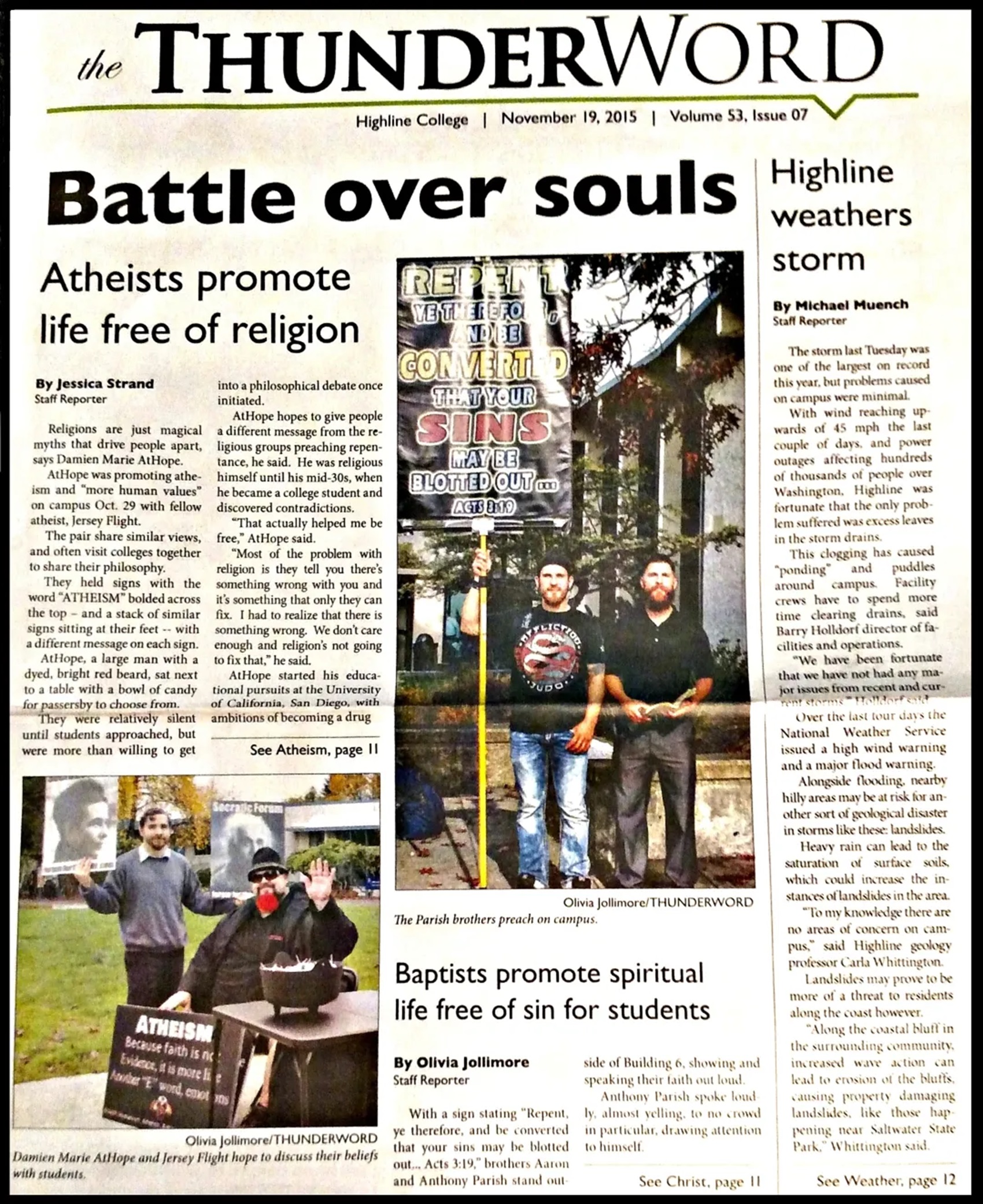
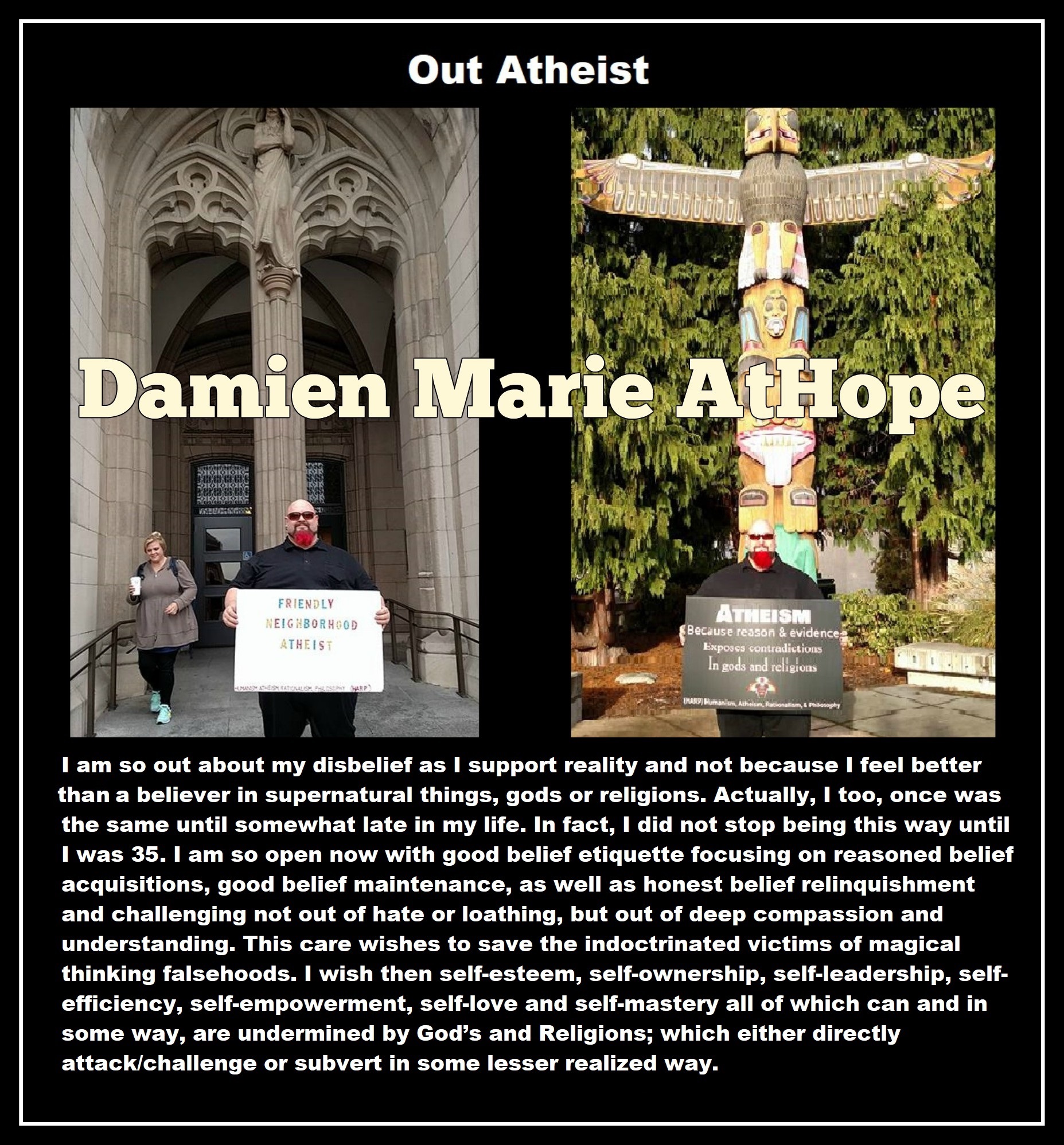




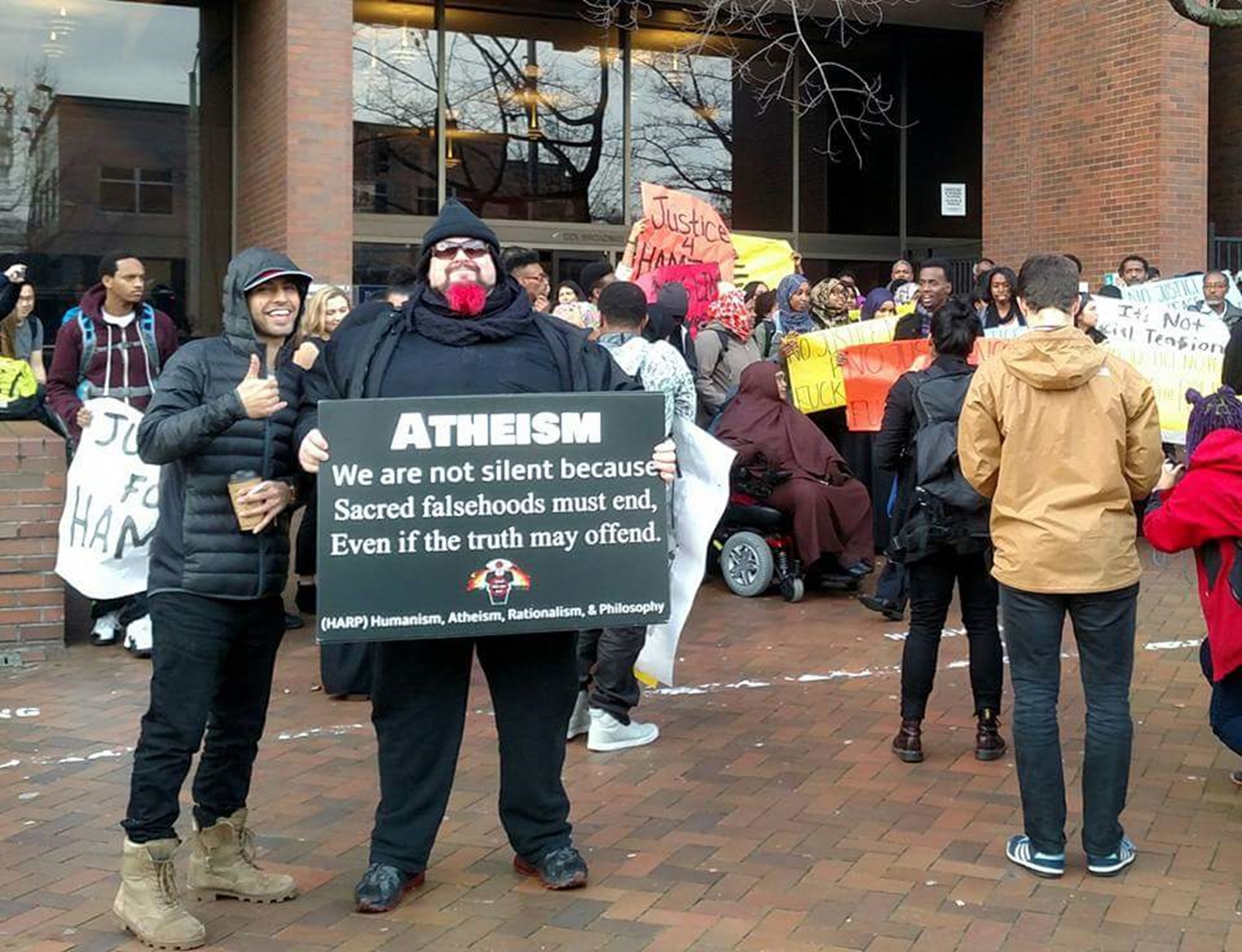
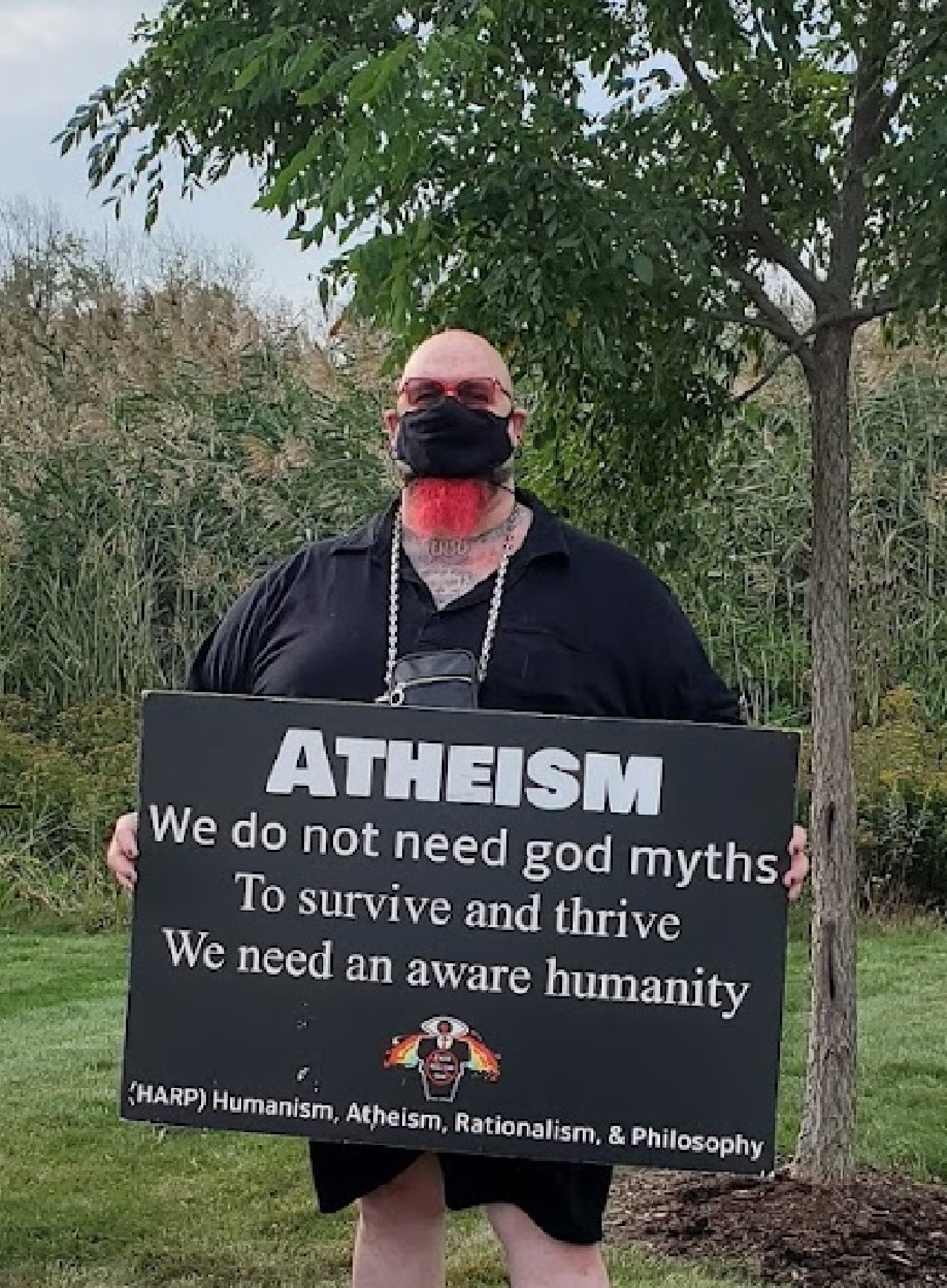

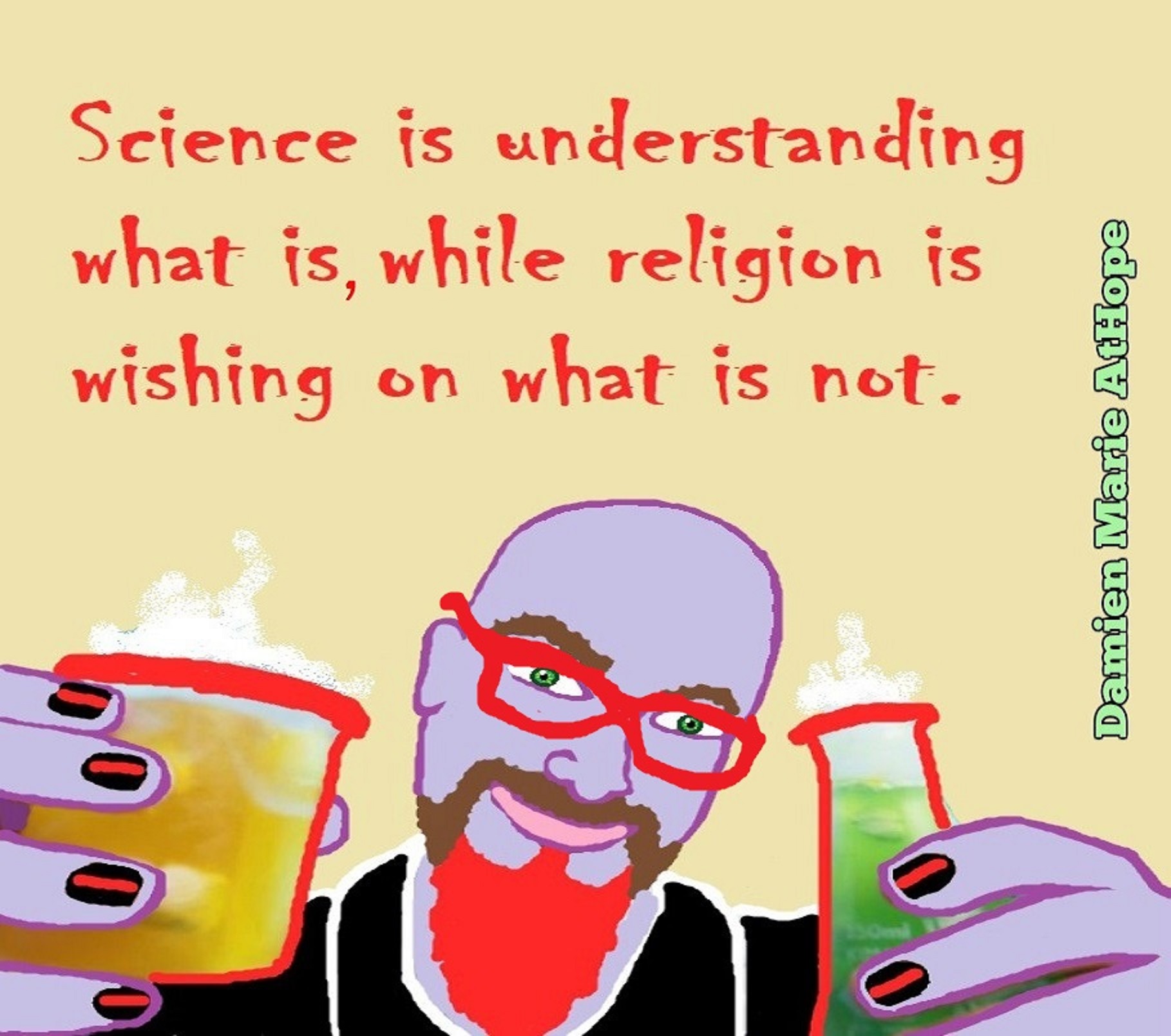
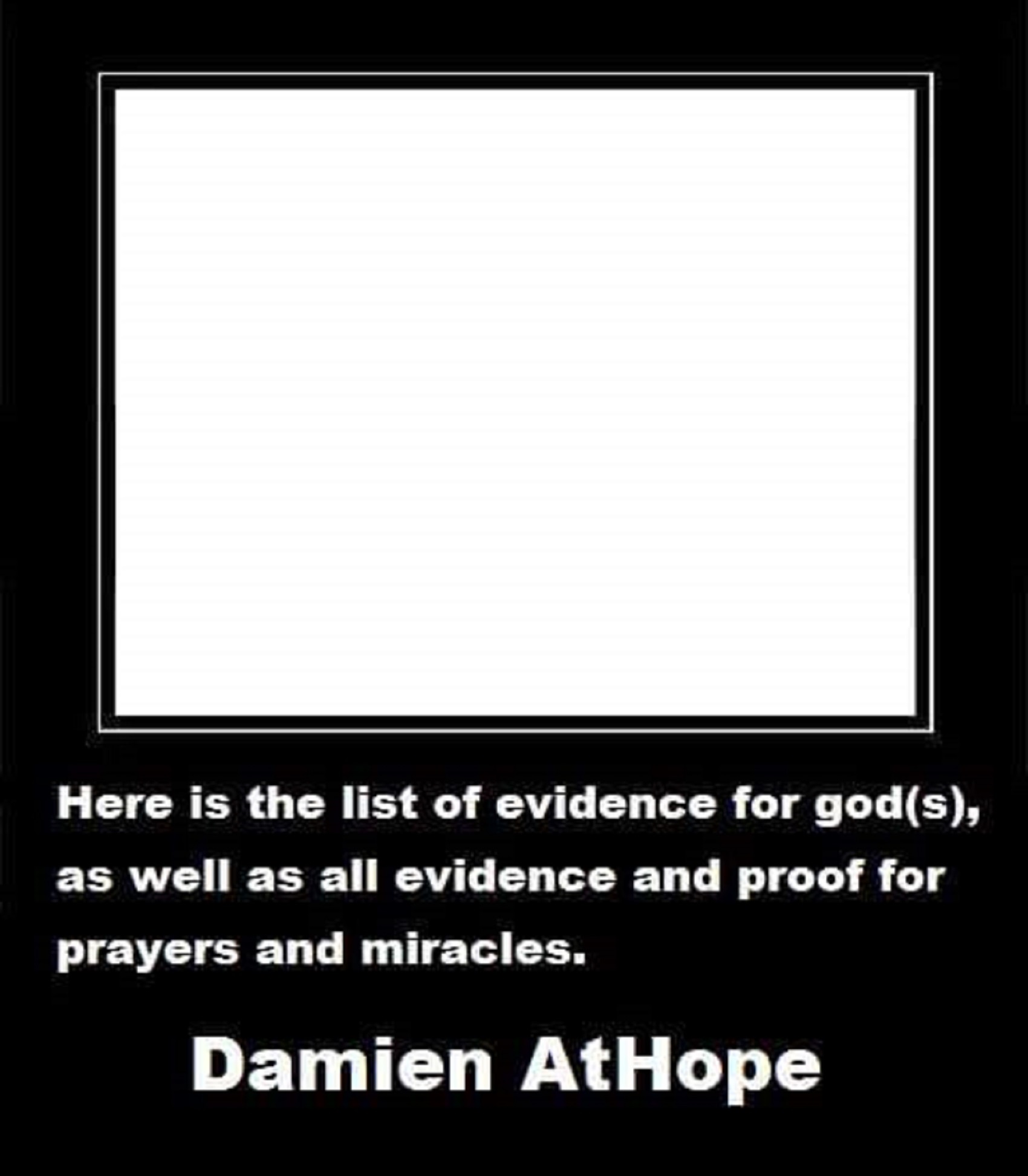
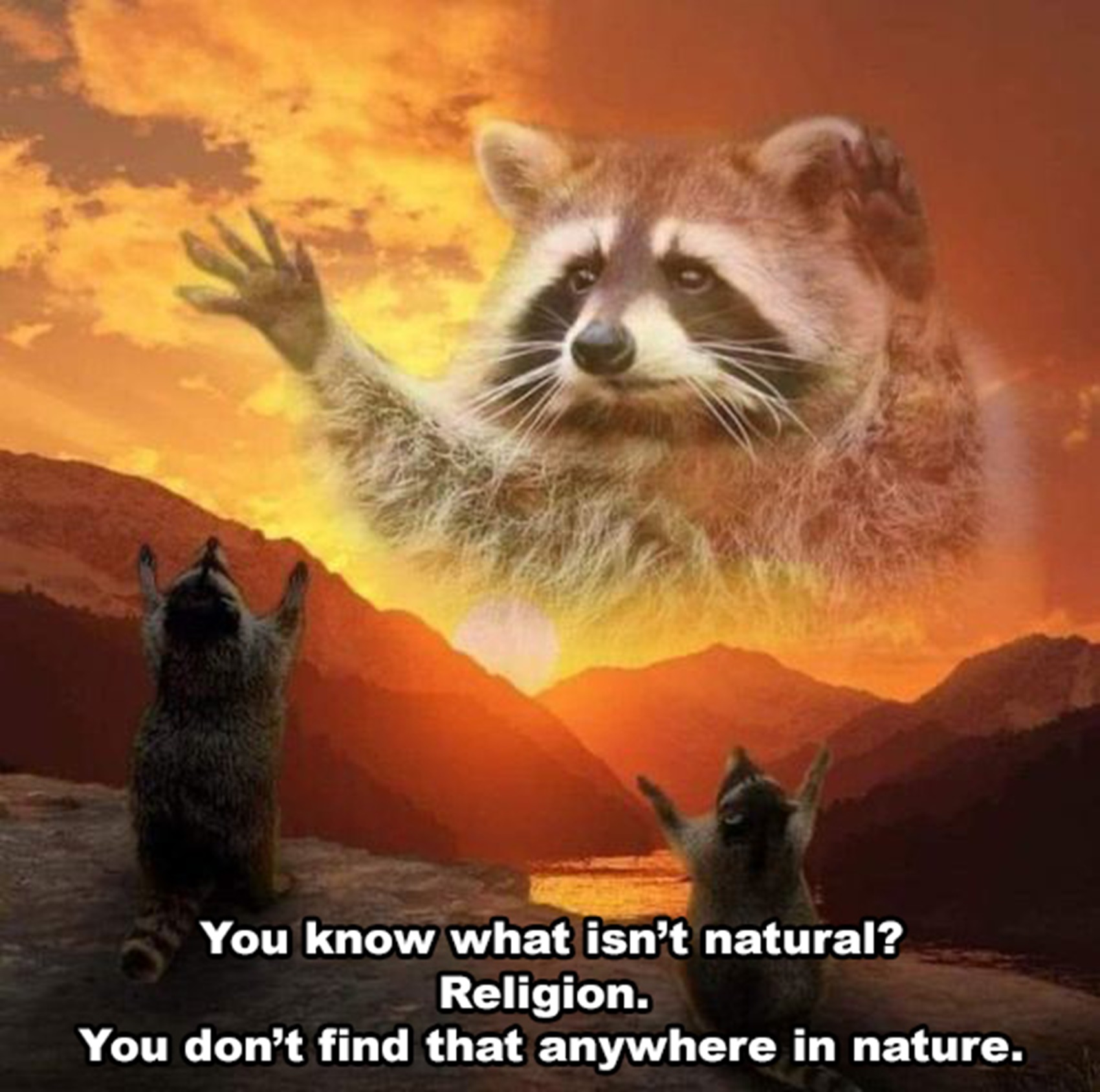
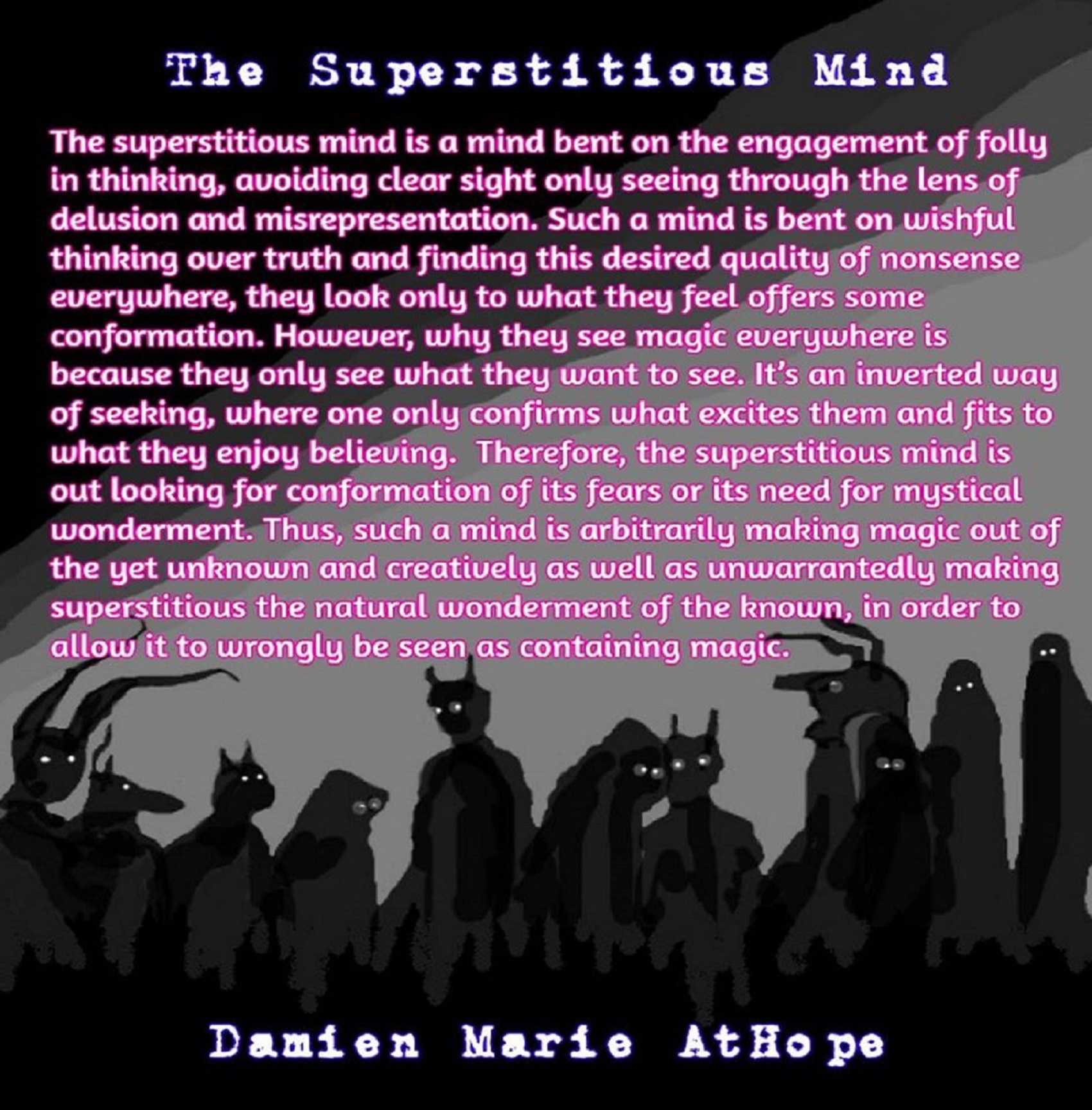
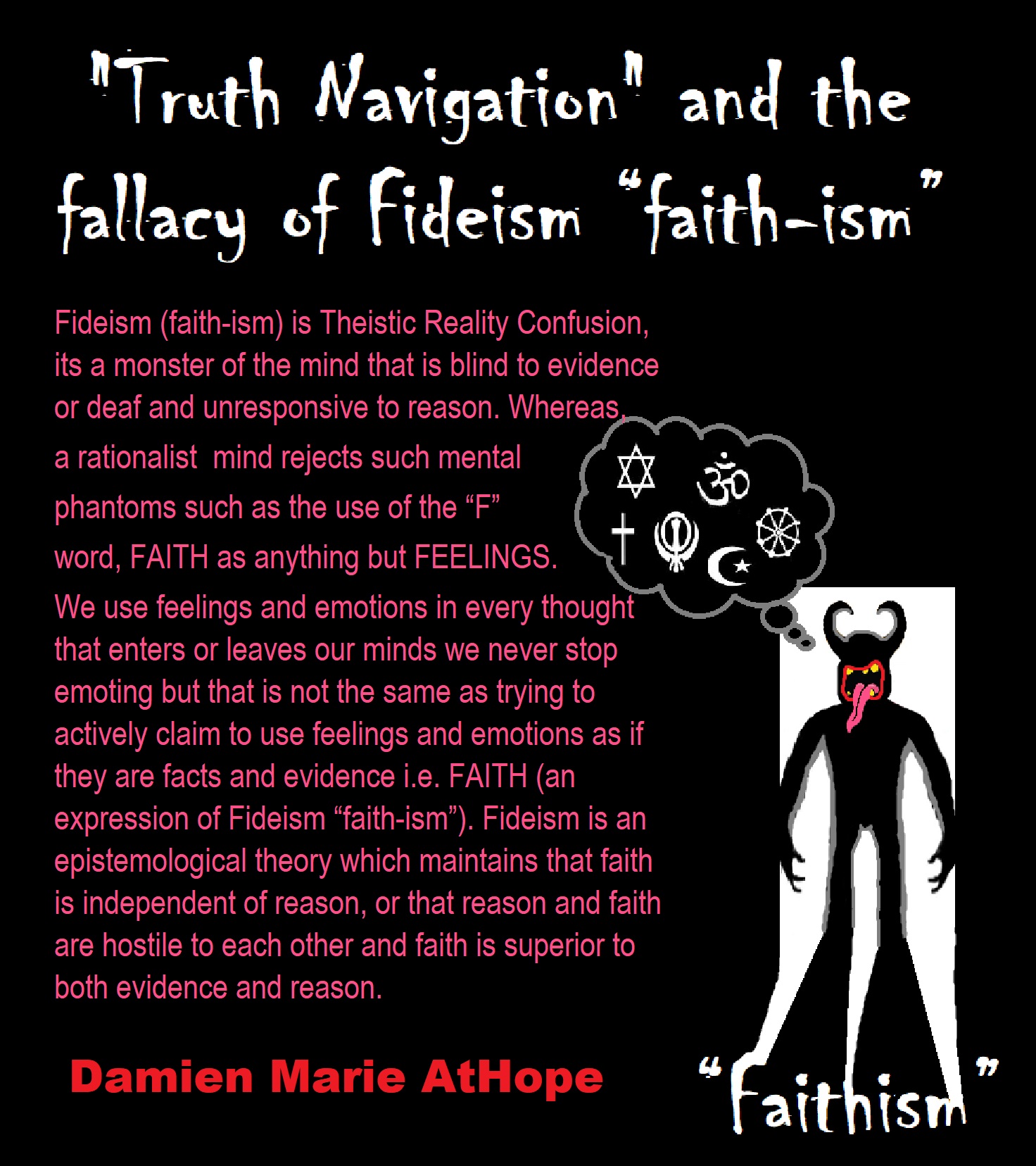
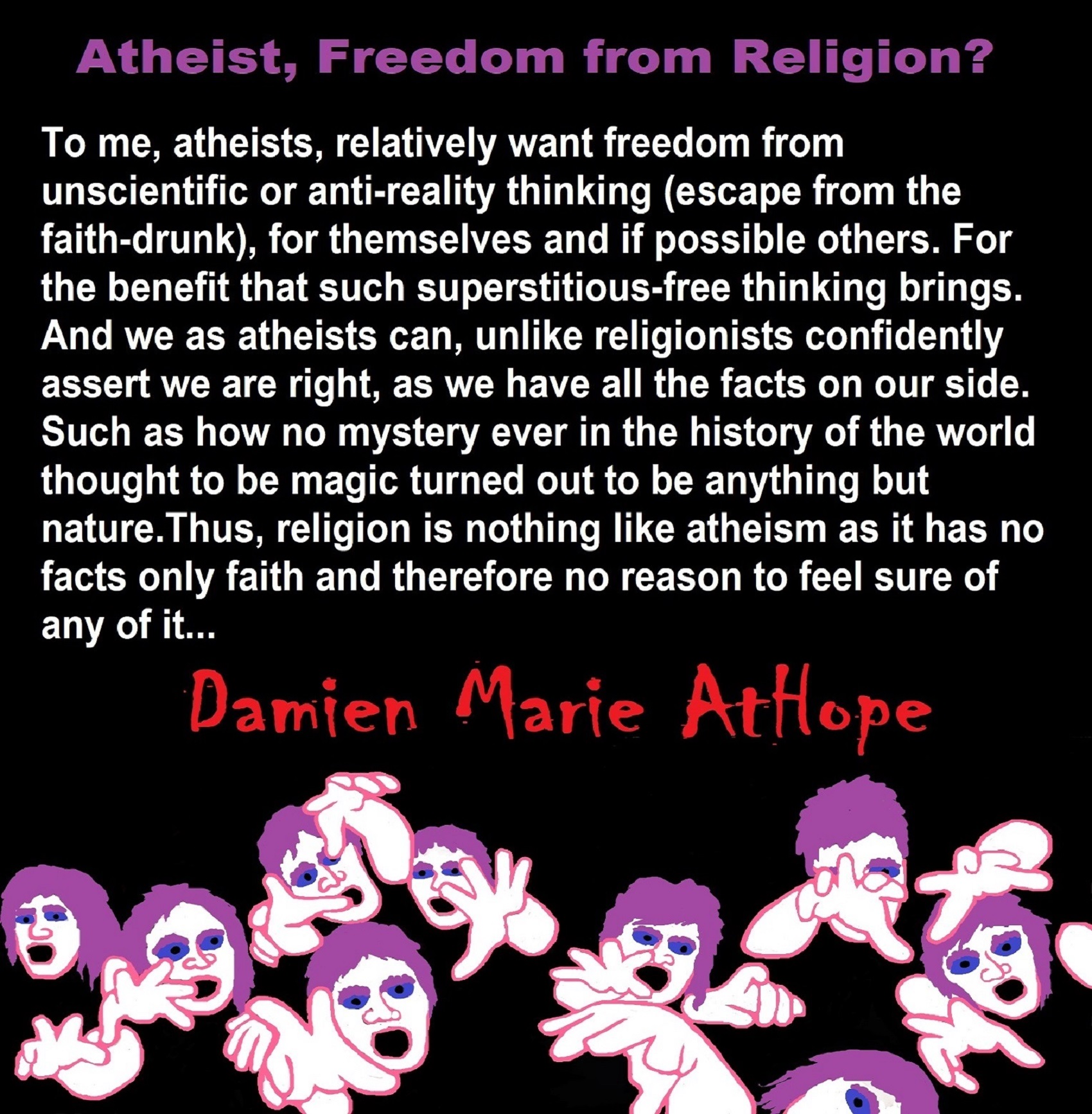

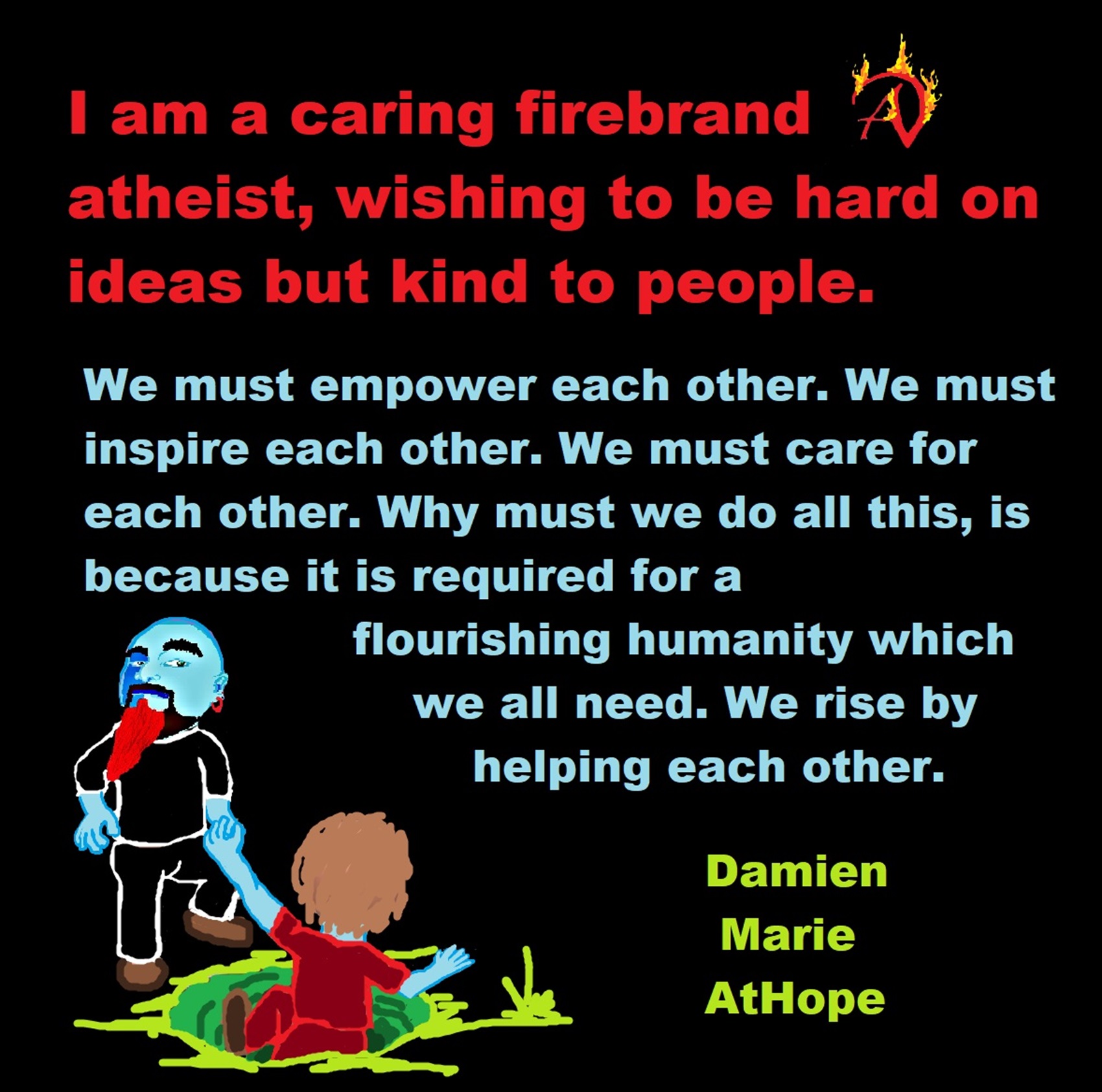
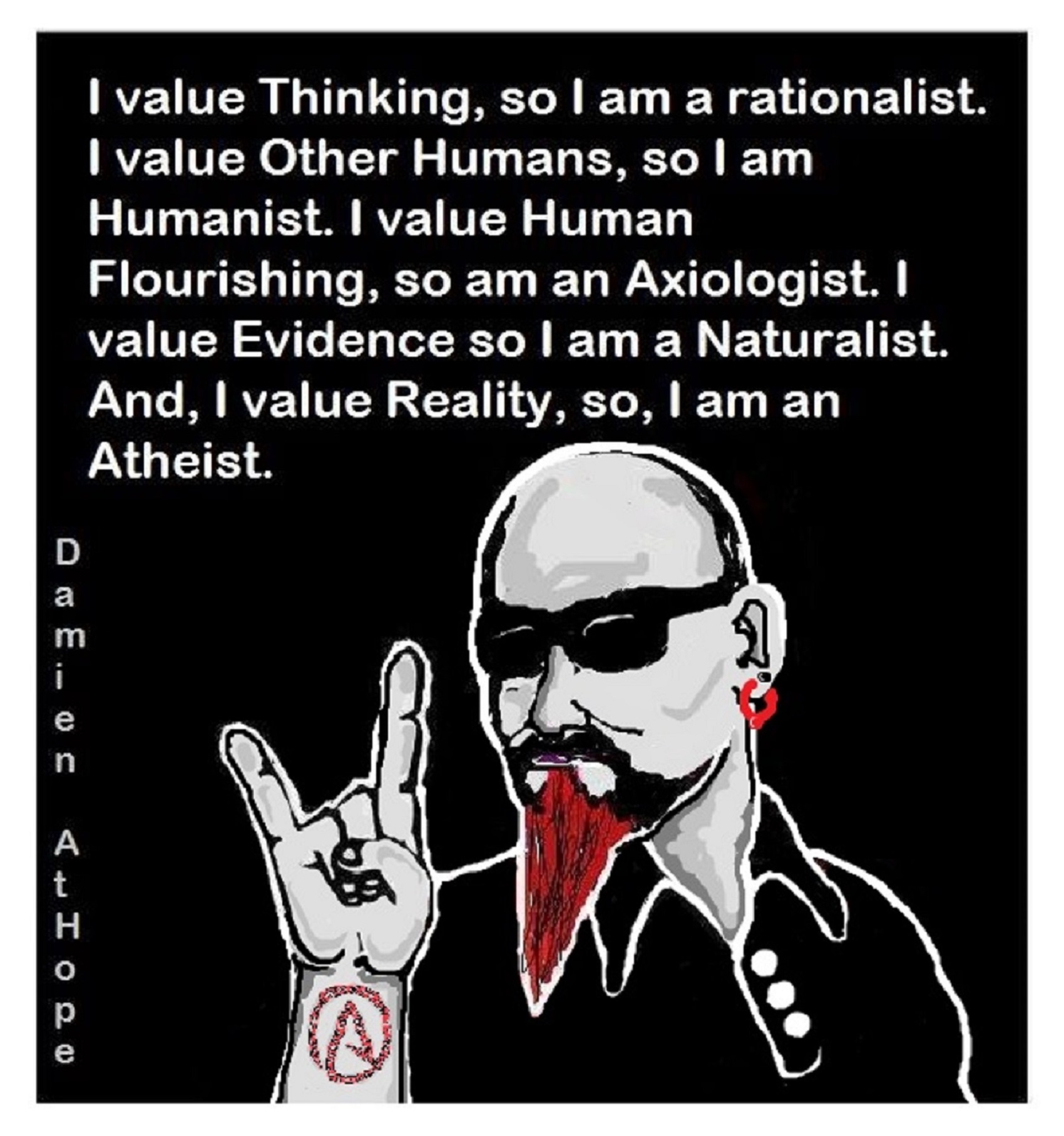

“Theists, there has to be a god, as something can not come from nothing.”
Well, thus something (unknown) happened and then there was something. This does not tell us what the something that may have been involved with something coming from nothing. A supposed first cause, thus something (unknown) happened and then there was something is not an open invitation to claim it as known, neither is it justified to call or label such an unknown as anything, especially an unsubstantiated magical thinking belief born of mythology and religious storytelling.

While hallucinogens are associated with shamanism, it is alcohol that is associated with paganism.
The Atheist-Humanist-Leftist Revolutionaries Shows in the prehistory series:
Show two: Pre-animism 300,000 years old and animism 100,000 years old: related to “Anarchism and Socialism”
Show tree: Totemism 50,000 years old: related to “Anarchism and Socialism”
Show four: Shamanism 30,000 years old: related to “Anarchism and Socialism”
Show five: Paganism 12,000 years old: related to “Anarchism and Socialism”
Show six: Emergence of hierarchy, sexism, slavery, and the new male god dominance: Paganism 7,000-5,000 years old: related to “Anarchism and Socialism” (Capitalism) (World War 0) Elite and their slaves!
Prehistory: related to “Anarchism and Socialism” the division of labor, power, rights, and recourses: VIDEO
Pre-animism 300,000 years old and animism 100,000 years old: related to “Anarchism and Socialism”: VIDEO
Totemism 50,000 years old: related to “Anarchism and Socialism”: VIDEO
Shamanism 30,000 years old: related to “Anarchism and Socialism”: VIDEO
Paganism 12,000 years old: related to “Anarchism and Socialism” (Pre-Capitalism): VIDEO
Paganism 7,000-5,000 years old: related to “Anarchism and Socialism” (Capitalism) (World War 0) Elite and their slaves: VIEDO
Paganism 5,000 years old: progressed organized religion and the state: related to “Anarchism and Socialism” (Kings and the Rise of the State): VIEDO
Paganism 4,000 years old: related to “Anarchism and Socialism” (First Moralistic gods, then the Origin time of Monotheism): VIEDO
I do not hate simply because I challenge and expose myths or lies any more than others being thought of as loving simply because of the protection and hiding from challenge their favored myths or lies.
The truth is best championed in the sunlight of challenge.
An archaeologist once said to me “Damien religion and culture are very different”
My response, So are you saying that was always that way, such as would you say Native Americans’ cultures are separate from their religions? And do you think it always was the way you believe?
I had said that religion was a cultural product. That is still how I see it and there are other archaeologists that think close to me as well. Gods too are the myths of cultures that did not understand science or the world around them, seeing magic/supernatural everywhere.
I personally think there is a goddess and not enough evidence to support a male god at Çatalhöyük but if there was both a male and female god and goddess then I know the kind of gods they were like Proto-Indo-European mythology.
This series idea was addressed in, Anarchist Teaching as Free Public Education or Free Education in the Public: VIDEO
Our 12 video series: Organized Oppression: Mesopotamian State Force and the Politics of power (9,000-4,000 years ago), is adapted from: The Complete and Concise History of the Sumerians and Early Bronze Age Mesopotamia (7000-2000 BC): https://www.youtube.com/watch?v=szFjxmY7jQA by “History with Cy“
Show #1: Mesopotamian State Force and the Politics of Power (Samarra, Halaf, Ubaid)
Show #2: Mesopotamian State Force and the Politics of Power
Show #3: Mesopotamian State Force and the Politics of Power (Uruk and the First Cities)
Show #4: Mesopotamian State Force and the Politics of Power (First Kings)
Show #5: Mesopotamian State Force and the Politics of Power (Early Dynastic Period)
Show #6: Mesopotamian State Force and the Politics of Power
Show #7: Mesopotamian State Force and the Politics of Power (Sargon and Akkadian Rule)
Show #9: Mesopotamian State Force and the Politics of Power (Gudea of Lagash and Utu-hegal)
Show #12: Mesopotamian State Force and the Politics of Power (Aftermath and Legacy of Sumer)

The “Atheist-Humanist-Leftist Revolutionaries”
Cory Johnston ☭ Ⓐ Atheist Leftist @Skepticallefty & I (Damien Marie AtHope) @AthopeMarie (my YouTube & related blog) are working jointly in atheist, antitheist, antireligionist, antifascist, anarchist, socialist, and humanist endeavors in our videos together, generally, every other Saturday.
Why Does Power Bring Responsibility?
Think, how often is it the powerless that start wars, oppress others, or commit genocide? So, I guess the question is to us all, to ask, how can power not carry responsibility in a humanity concept? I know I see the deep ethical responsibility that if there is power their must be a humanistic responsibility of ethical and empathic stewardship of that power. Will I be brave enough to be kind? Will I possess enough courage to be compassionate? Will my valor reach its height of empathy? I as everyone, earns our justified respect by our actions, that are good, ethical, just, protecting, and kind. Do I have enough self-respect to put my love for humanity’s flushing, over being brought down by some of its bad actors? May we all be the ones doing good actions in the world, to help human flourishing.
I create the world I want to live in, striving for flourishing. Which is not a place but a positive potential involvement and promotion; a life of humanist goal precision. To master oneself, also means mastering positive prosocial behaviors needed for human flourishing. I may have lost a god myth as an atheist, but I am happy to tell you, my friend, it is exactly because of that, leaving the mental terrorizer, god belief, that I truly regained my connected ethical as well as kind humanity.
Cory and I will talk about prehistory and theism, addressing the relevance to atheism, anarchism, and socialism.
At the same time as the rise of the male god, 7,000 years ago, there was also the very time there was the rise of violence, war, and clans to kingdoms, then empires, then states. It is all connected back to 7,000 years ago, and it moved across the world.
Cory Johnston: https://damienmarieathope.com/2021/04/cory-johnston-mind-of-a-skeptical-leftist/?v=32aec8db952d
The Mind of a Skeptical Leftist (YouTube)
Cory Johnston: Mind of a Skeptical Leftist @Skepticallefty
The Mind of a Skeptical Leftist By Cory Johnston: “Promoting critical thinking, social justice, and left-wing politics by covering current events and talking to a variety of people. Cory Johnston has been thoughtfully talking to people and attempting to promote critical thinking, social justice, and left-wing politics.” http://anchor.fm/skepticalleft
Cory needs our support. We rise by helping each other.
Cory Johnston ☭ Ⓐ @Skepticallefty Evidence-based atheist leftist (he/him) Producer, host, and co-host of 4 podcasts @skeptarchy @skpoliticspod and @AthopeMarie
Damien Marie AtHope (“At Hope”) Axiological Atheist, Anti-theist, Anti-religionist, Secular Humanist. Rationalist, Writer, Artist, Poet, Philosopher, Advocate, Activist, Psychology, and Armchair Archaeology/Anthropology/Historian.
Damien is interested in: Freedom, Liberty, Justice, Equality, Ethics, Humanism, Science, Atheism, Antiteism, Antireligionism, Ignosticism, Left-Libertarianism, Anarchism, Socialism, Mutualism, Axiology, Metaphysics, LGBTQI, Philosophy, Advocacy, Activism, Mental Health, Psychology, Archaeology, Social Work, Sexual Rights, Marriage Rights, Woman’s Rights, Gender Rights, Child Rights, Secular Rights, Race Equality, Ageism/Disability Equality, Etc. And a far-leftist, “Anarcho-Humanist.”
I am not a good fit in the atheist movement that is mostly pro-capitalist, I am anti-capitalist. Mostly pro-skeptic, I am a rationalist not valuing skepticism. Mostly pro-agnostic, I am anti-agnostic. Mostly limited to anti-Abrahamic religions, I am an anti-religionist.
To me, the “male god” seems to have either emerged or become prominent around 7,000 years ago, whereas the now favored monotheism “male god” is more like 4,000 years ago or so. To me, the “female goddess” seems to have either emerged or become prominent around 11,000-10,000 years ago or so, losing the majority of its once prominence around 2,000 years ago due largely to the now favored monotheism “male god” that grow in prominence after 4,000 years ago or so.
My Thought on the Evolution of Gods?
Animal protector deities from old totems/spirit animal beliefs come first to me, 13,000/12,000 years ago, then women as deities 11,000/10,000 years ago, then male gods around 7,000/8,000 years ago. Moralistic gods around 5,000/4,000 years ago, and monotheistic gods around 4,000/3,000 years ago.
To me, animal gods were likely first related to totemism animals around 13,000 to 12,000 years ago or older. Female as goddesses was next to me, 11,000 to 10,000 years ago or so with the emergence of agriculture. Then male gods come about 8,000 to 7,000 years ago with clan wars. Many monotheism-themed religions started in henotheism, emerging out of polytheism/paganism.
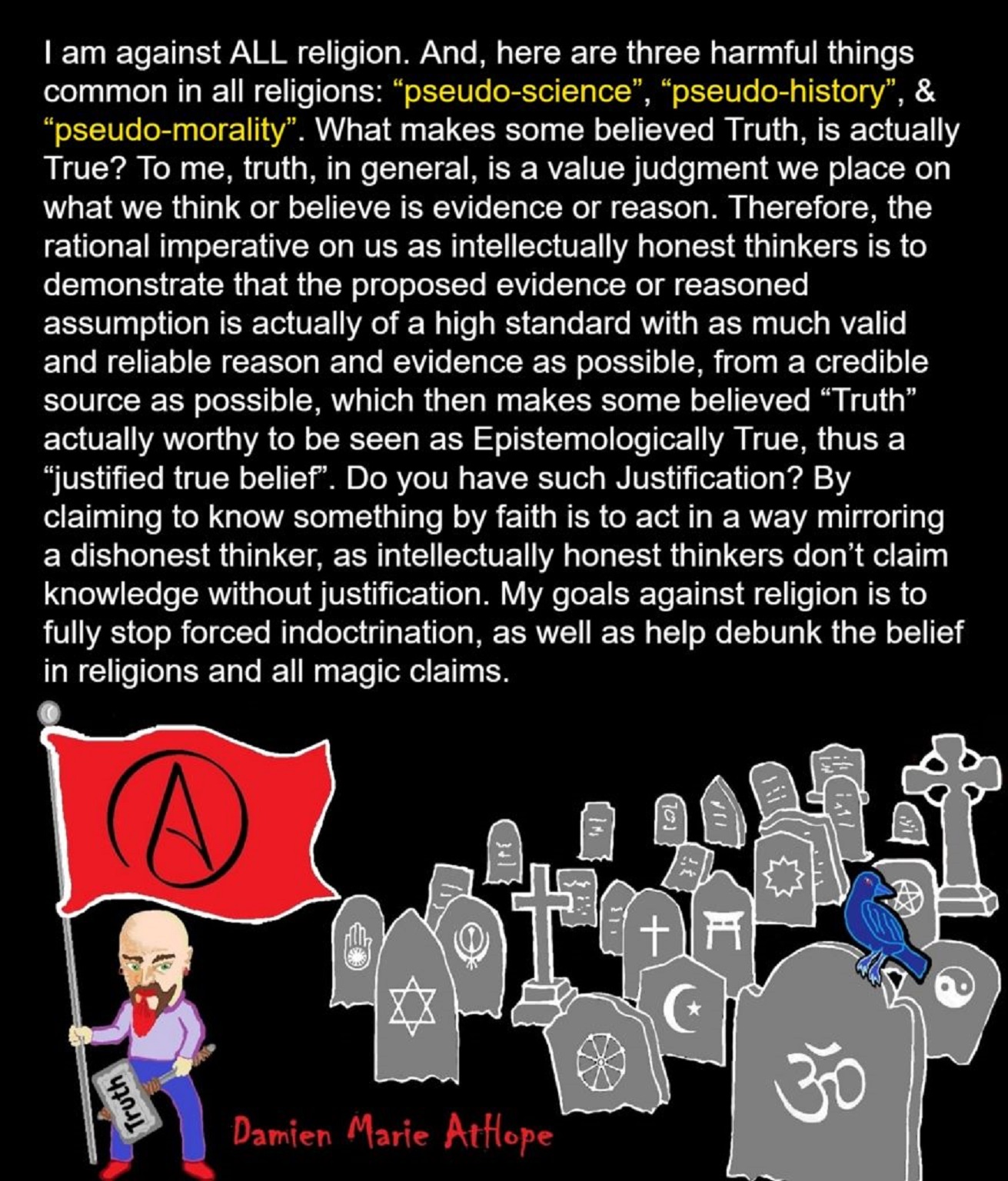

Damien Marie AtHope (Said as “At” “Hope”)/(Autodidact Polymath but not good at math):
Axiological Atheist, Anti-theist, Anti-religionist, Secular Humanist, Rationalist, Writer, Artist, Jeweler, Poet, “autodidact” Philosopher, schooled in Psychology, and “autodidact” Armchair Archaeology/Anthropology/Pre-Historian (Knowledgeable in the range of: 1 million to 5,000/4,000 years ago). I am an anarchist socialist politically. Reasons for or Types of Atheism
My Website, My Blog, & Short-writing or Quotes, My YouTube, Twitter: @AthopeMarie, and My Email: damien.marie.athope@gmail.com

